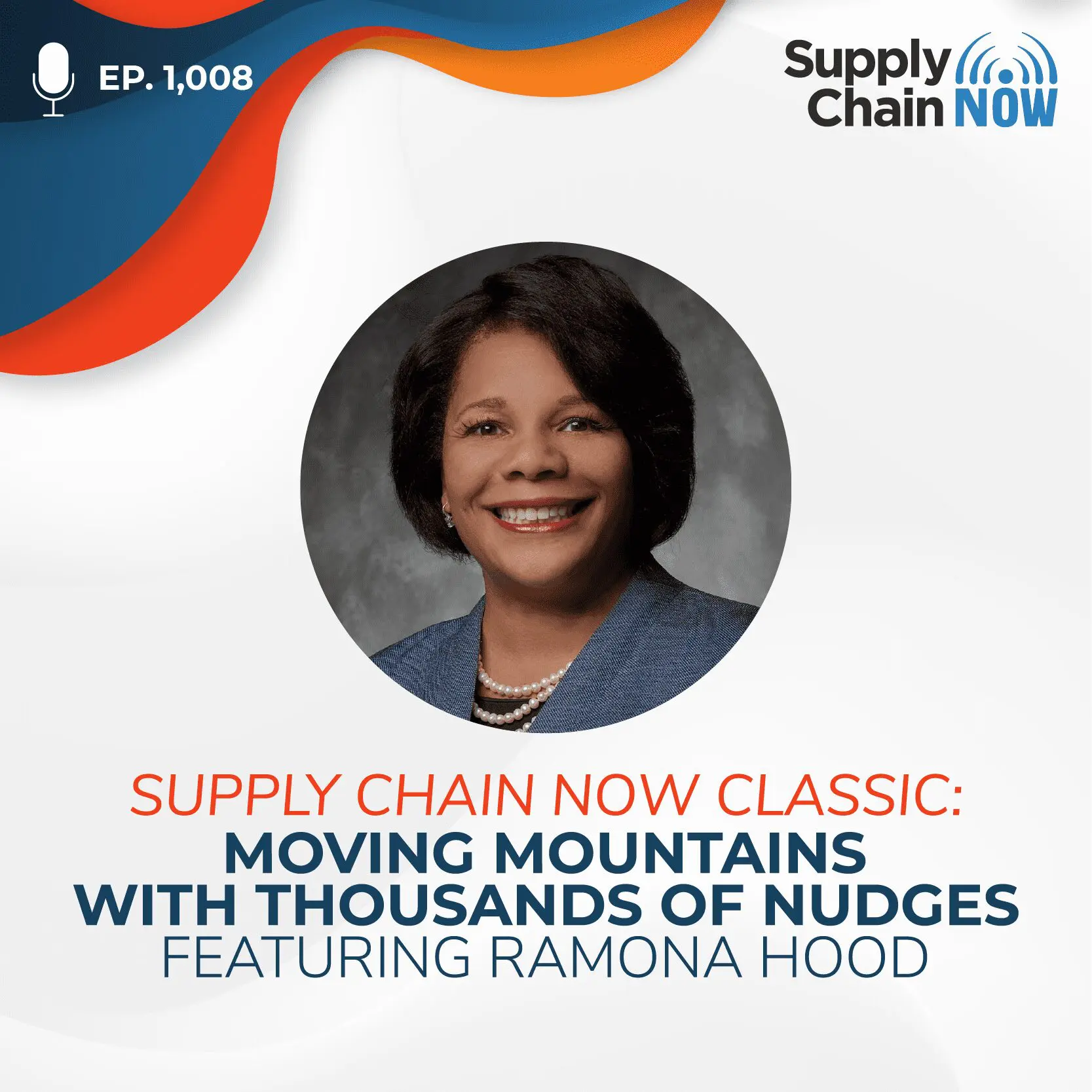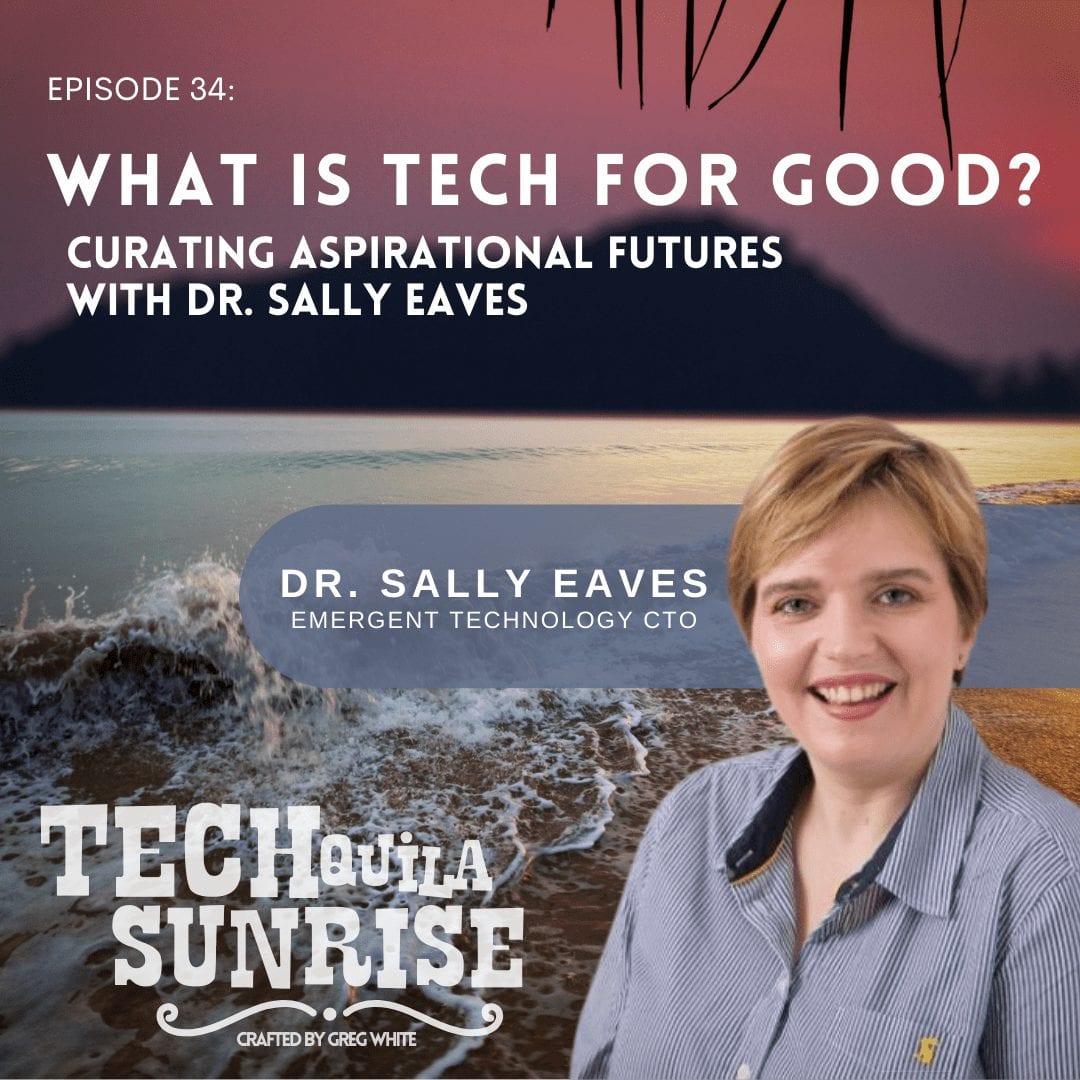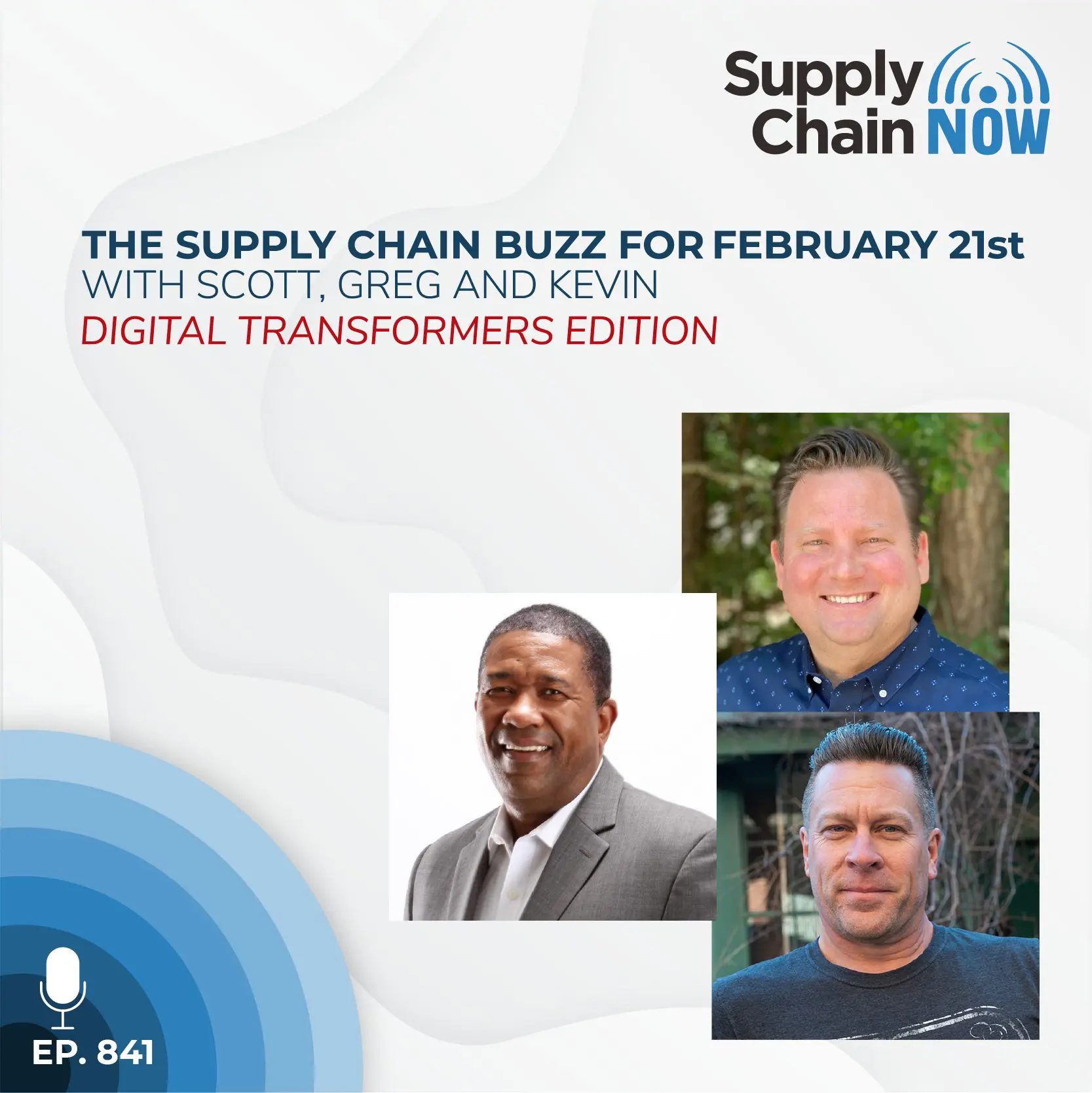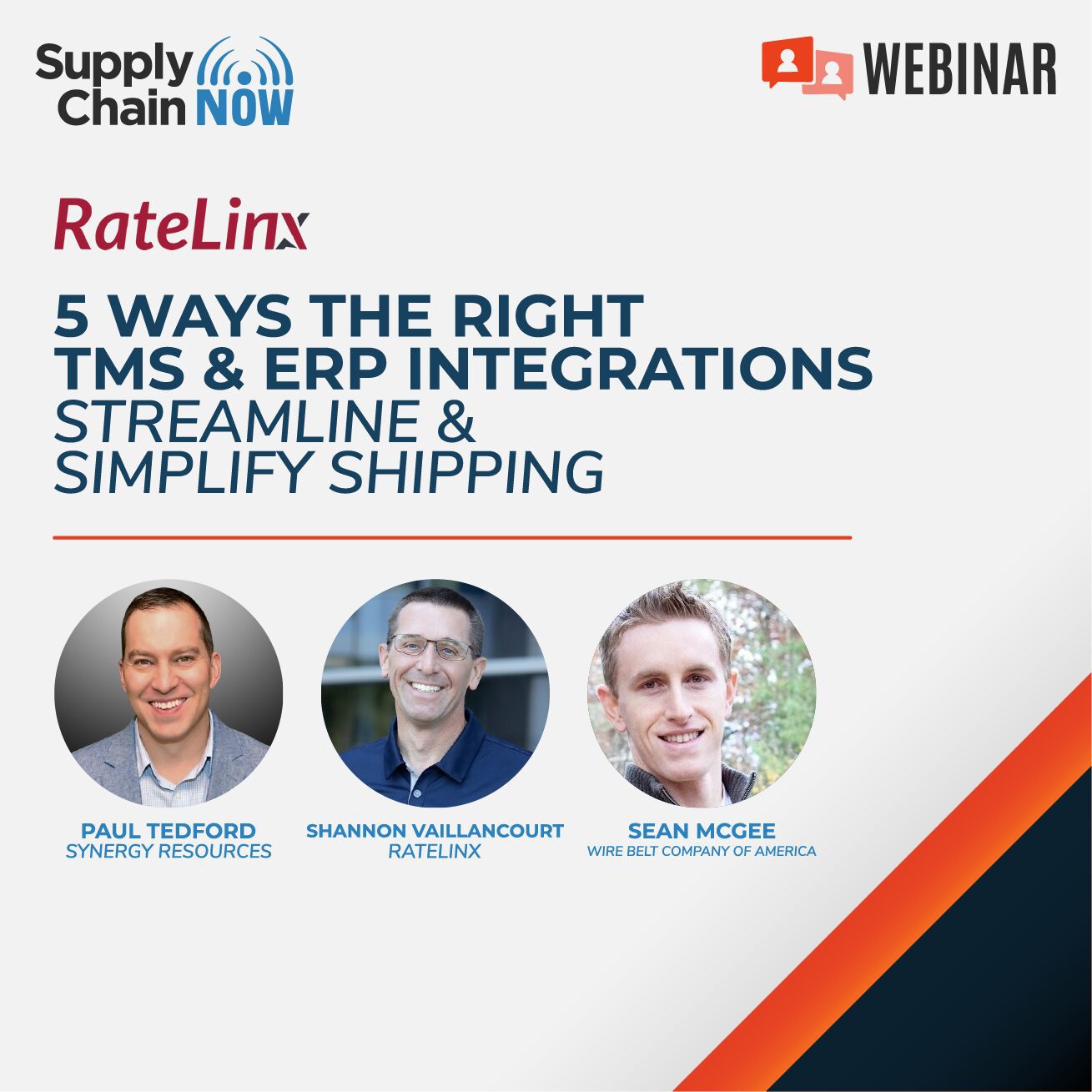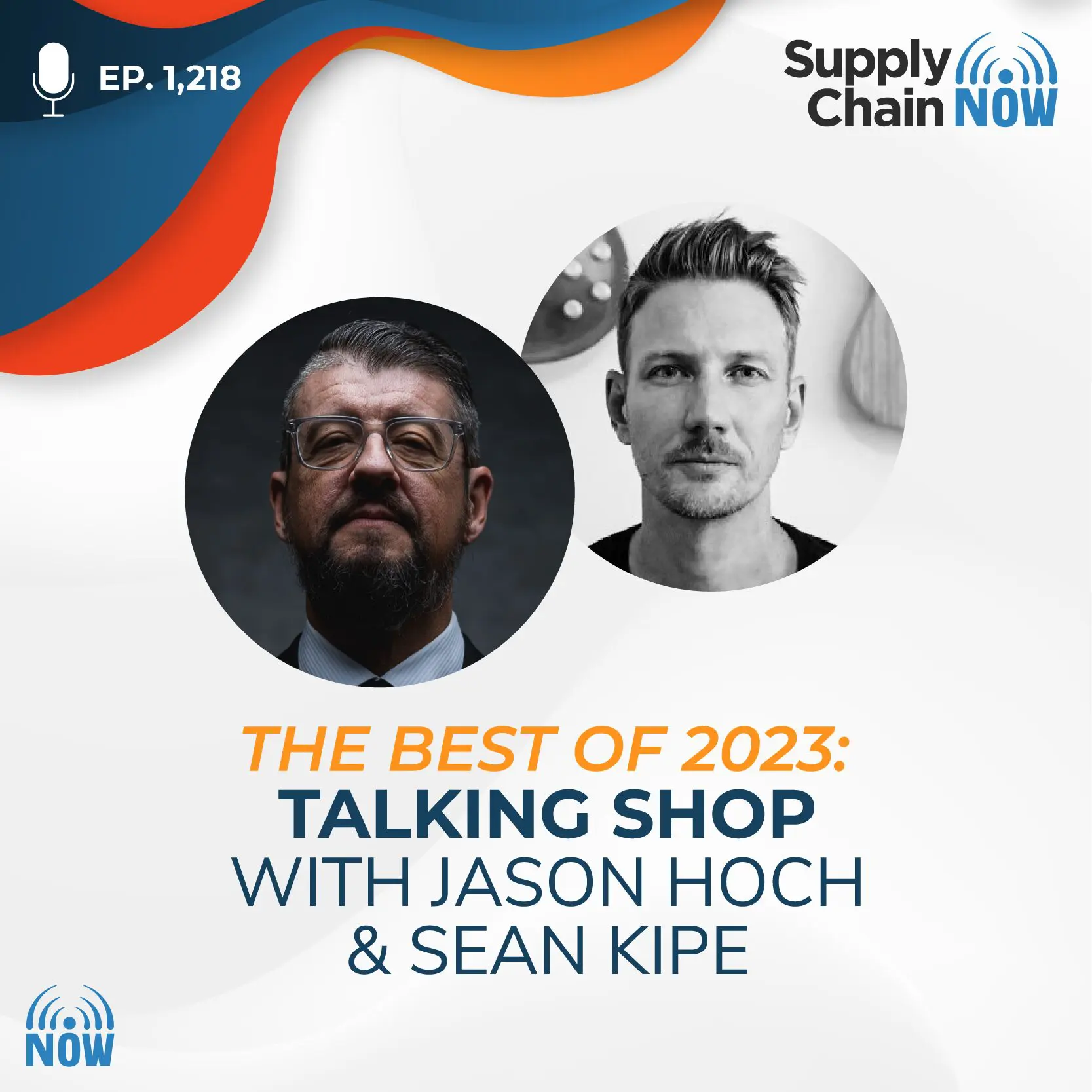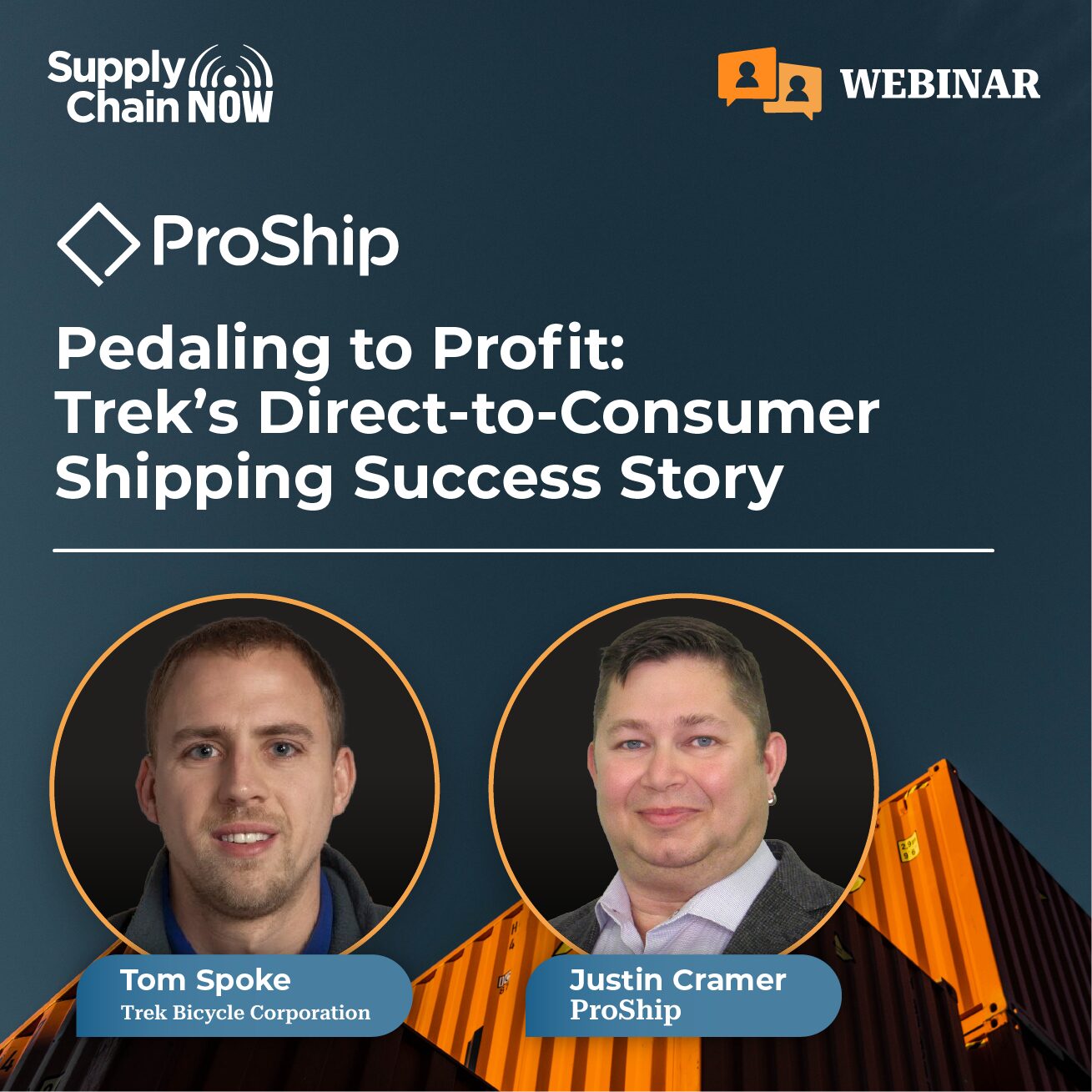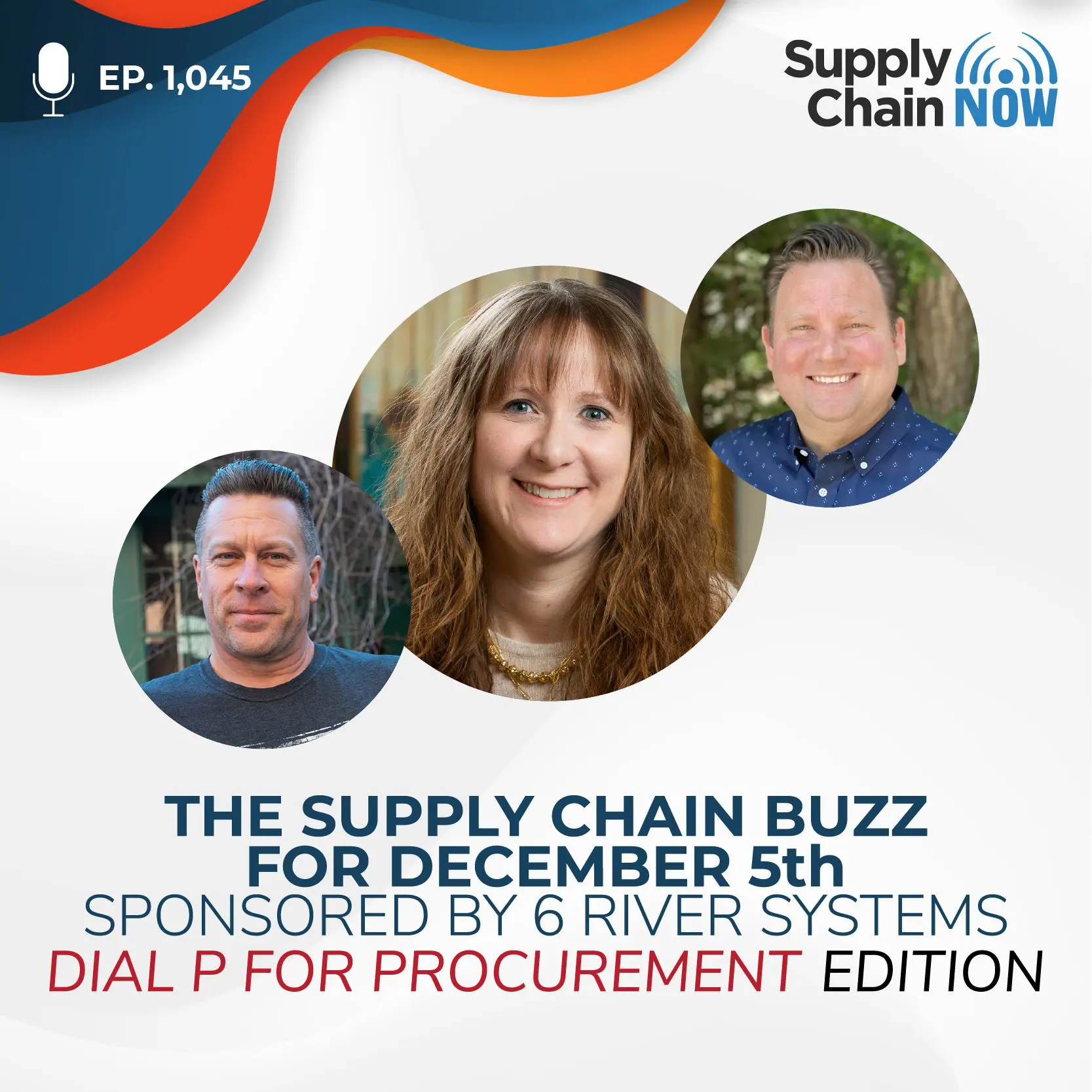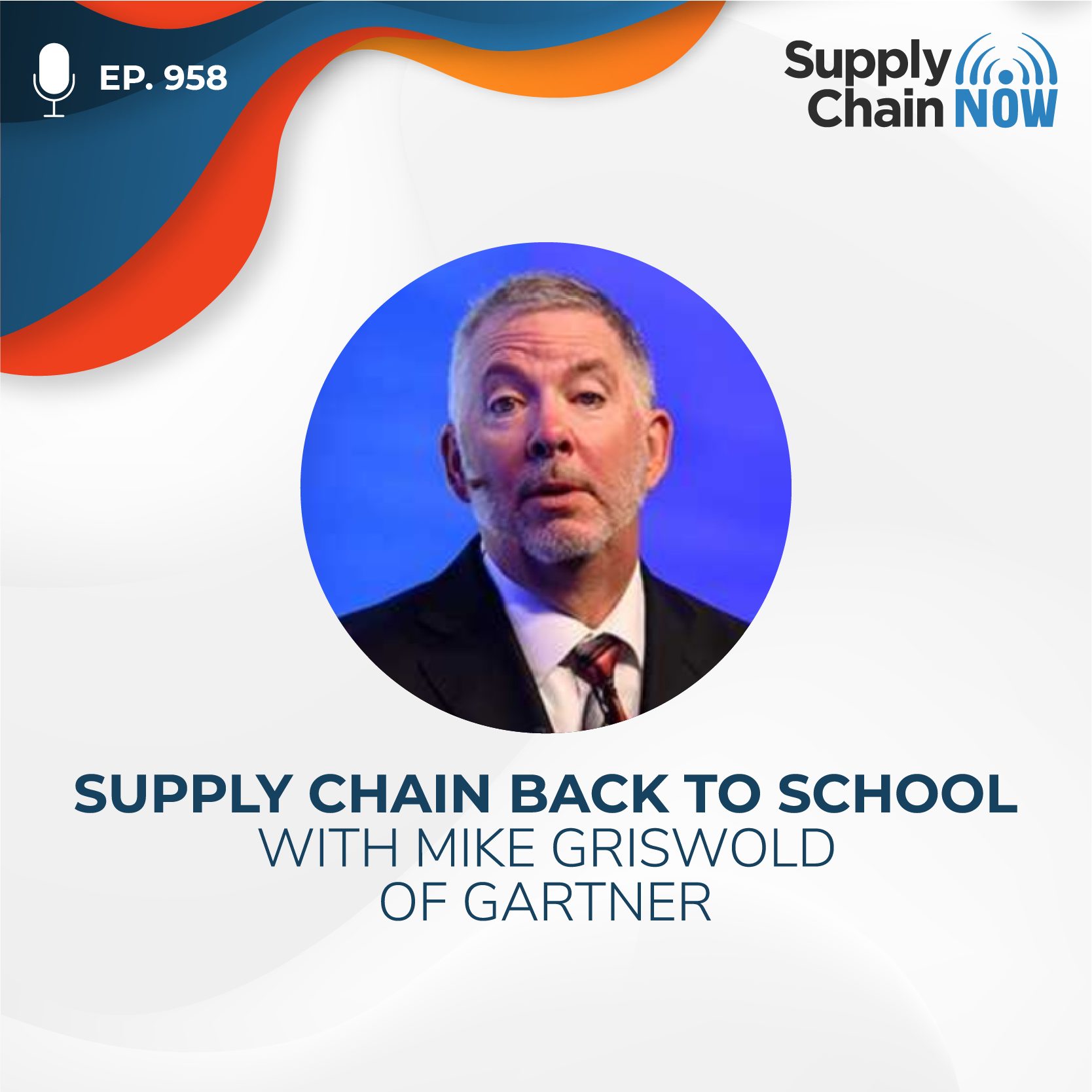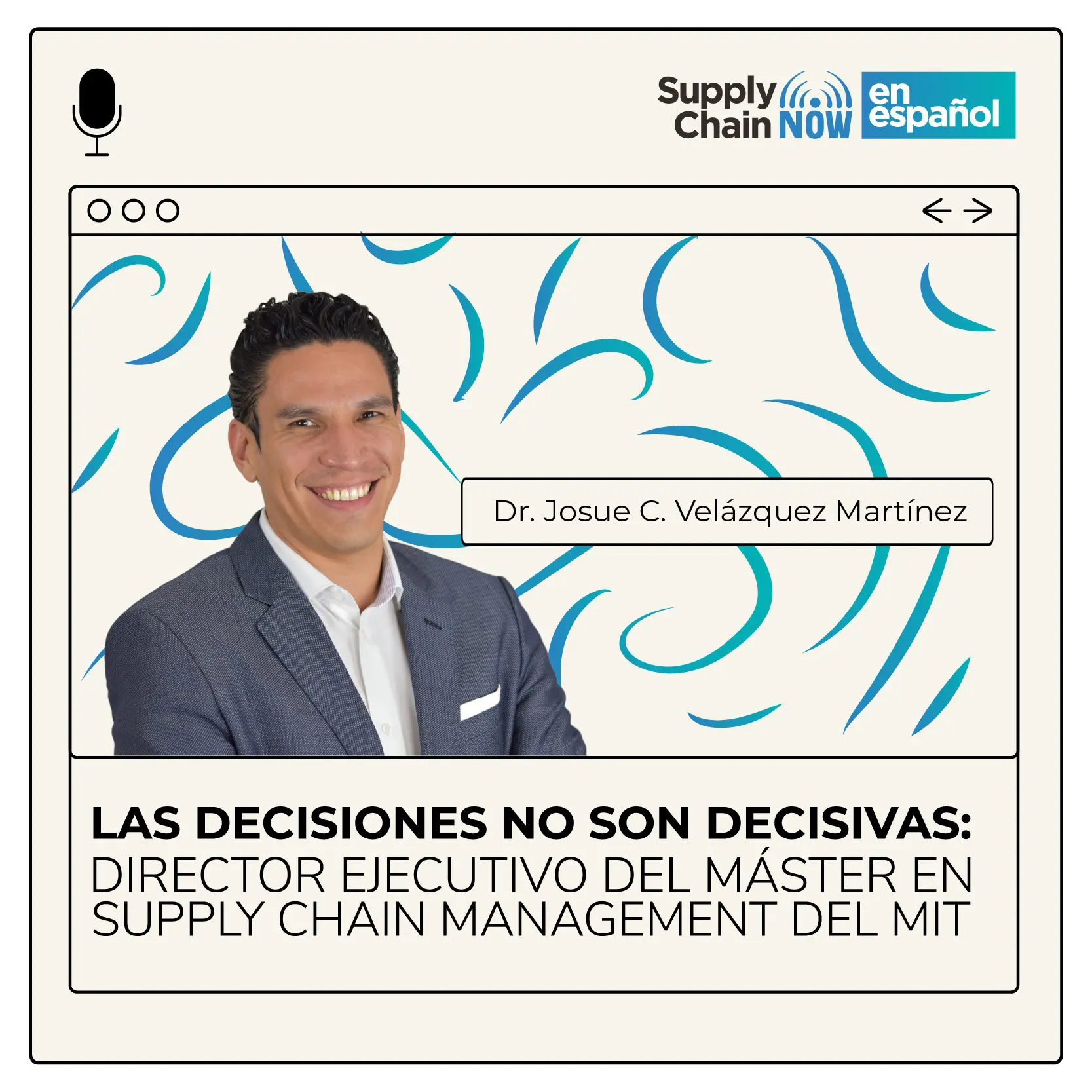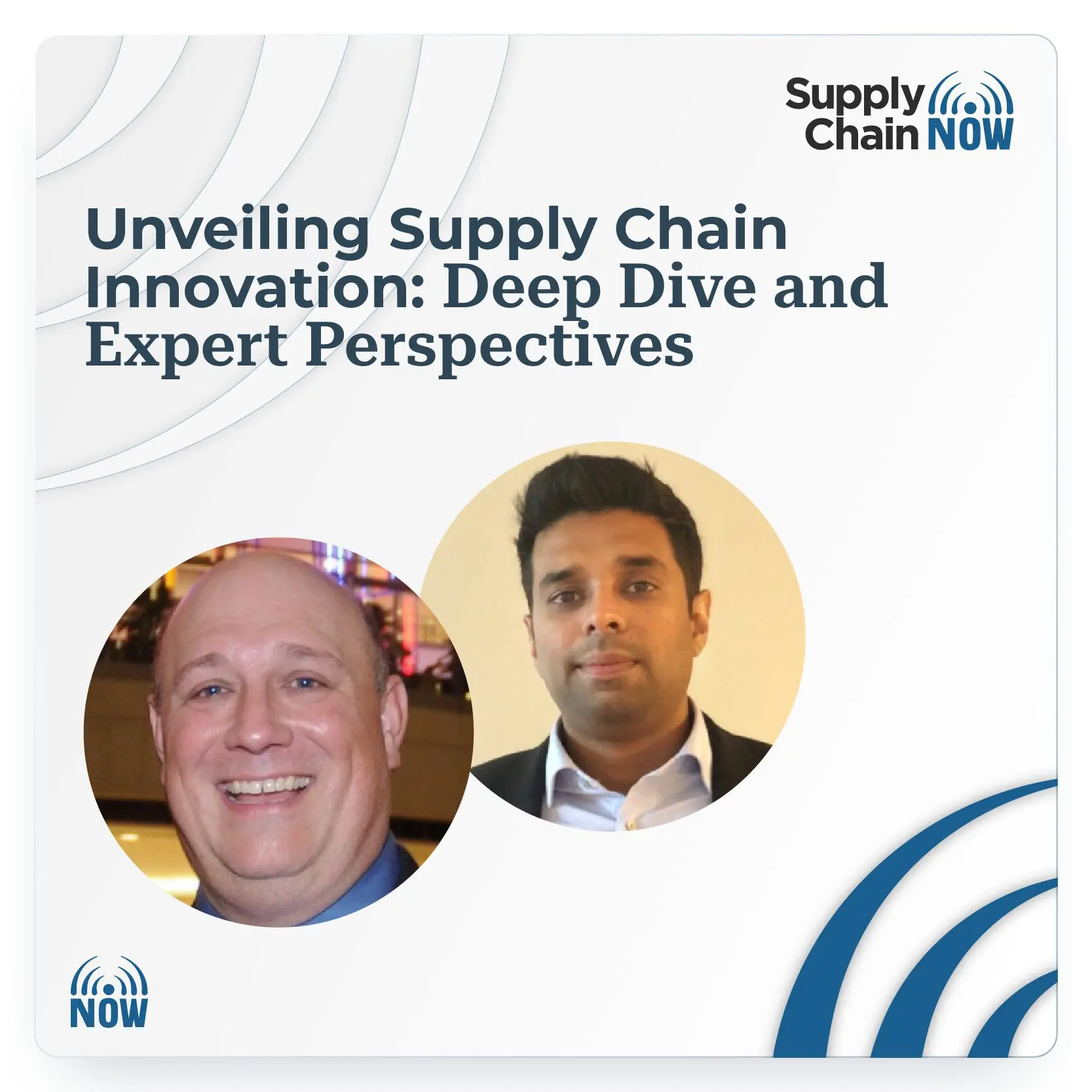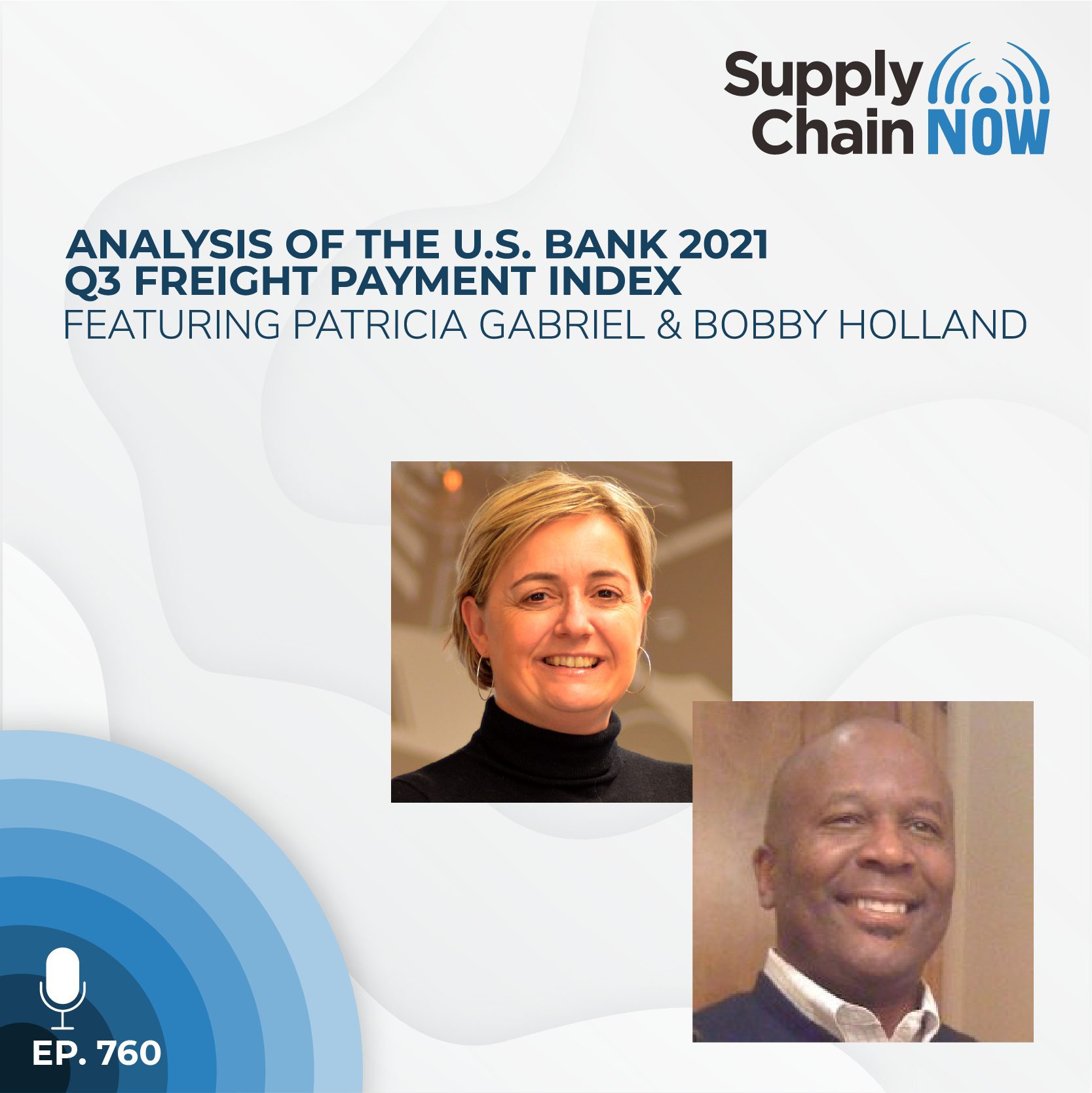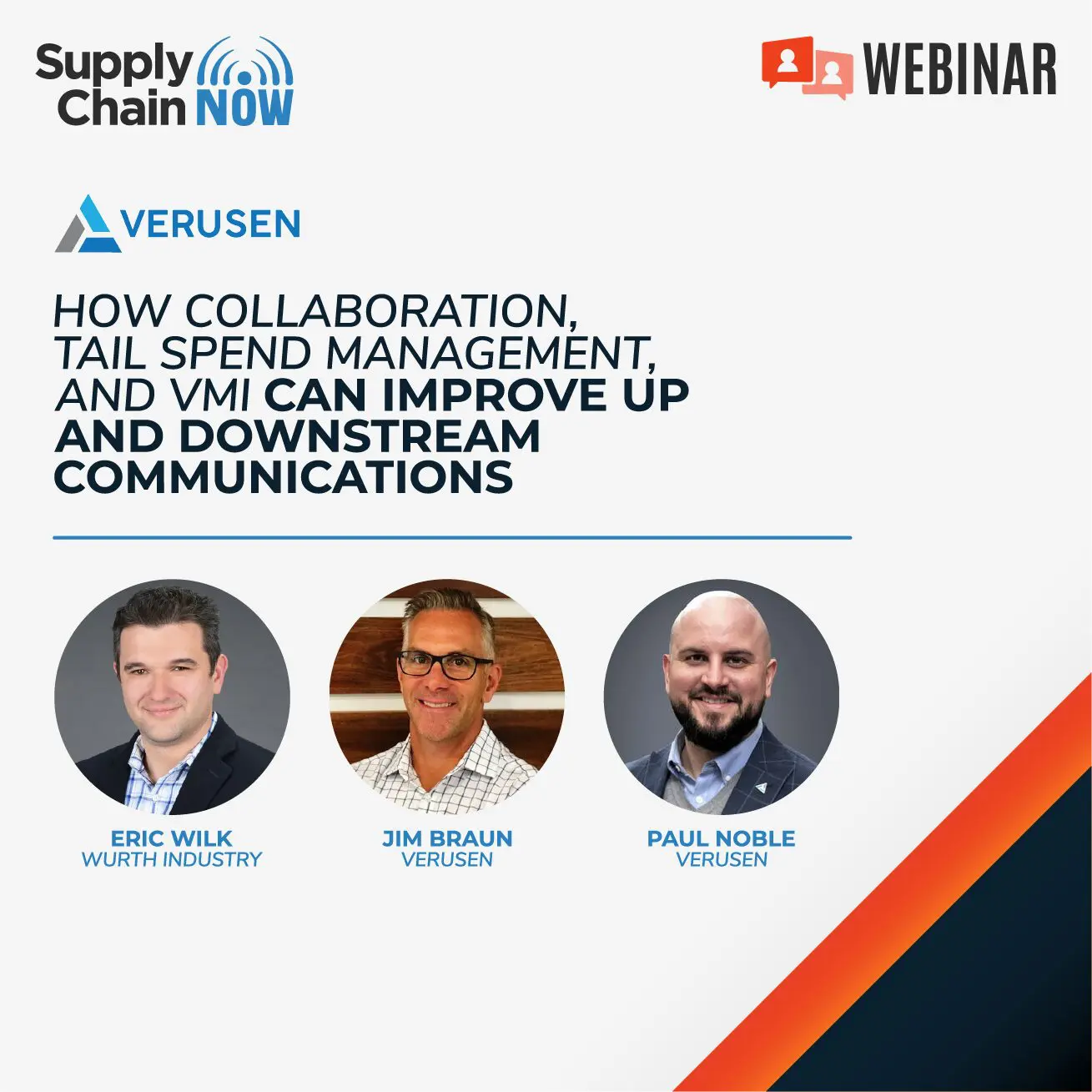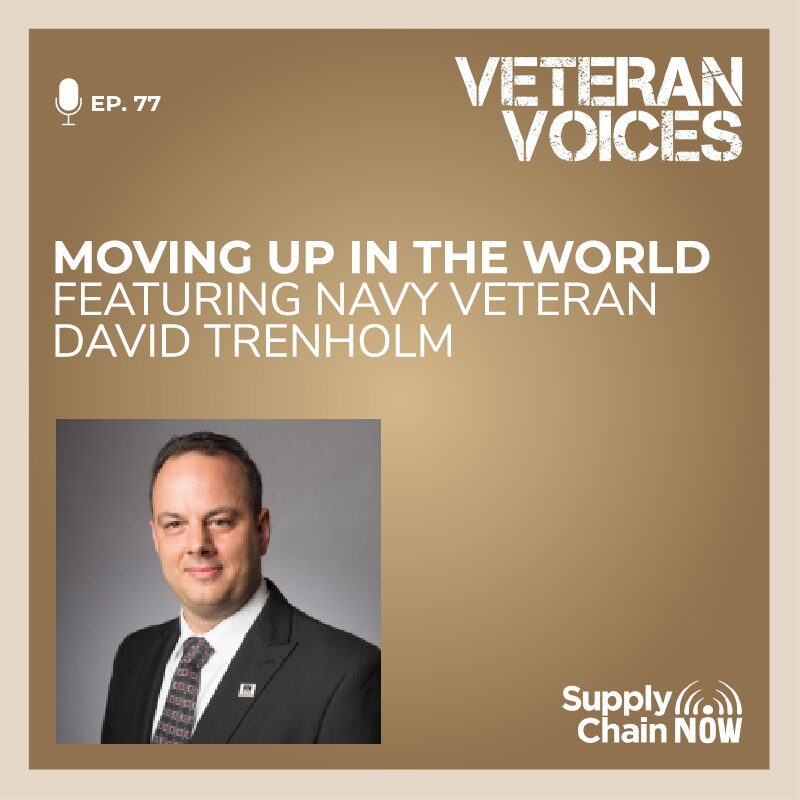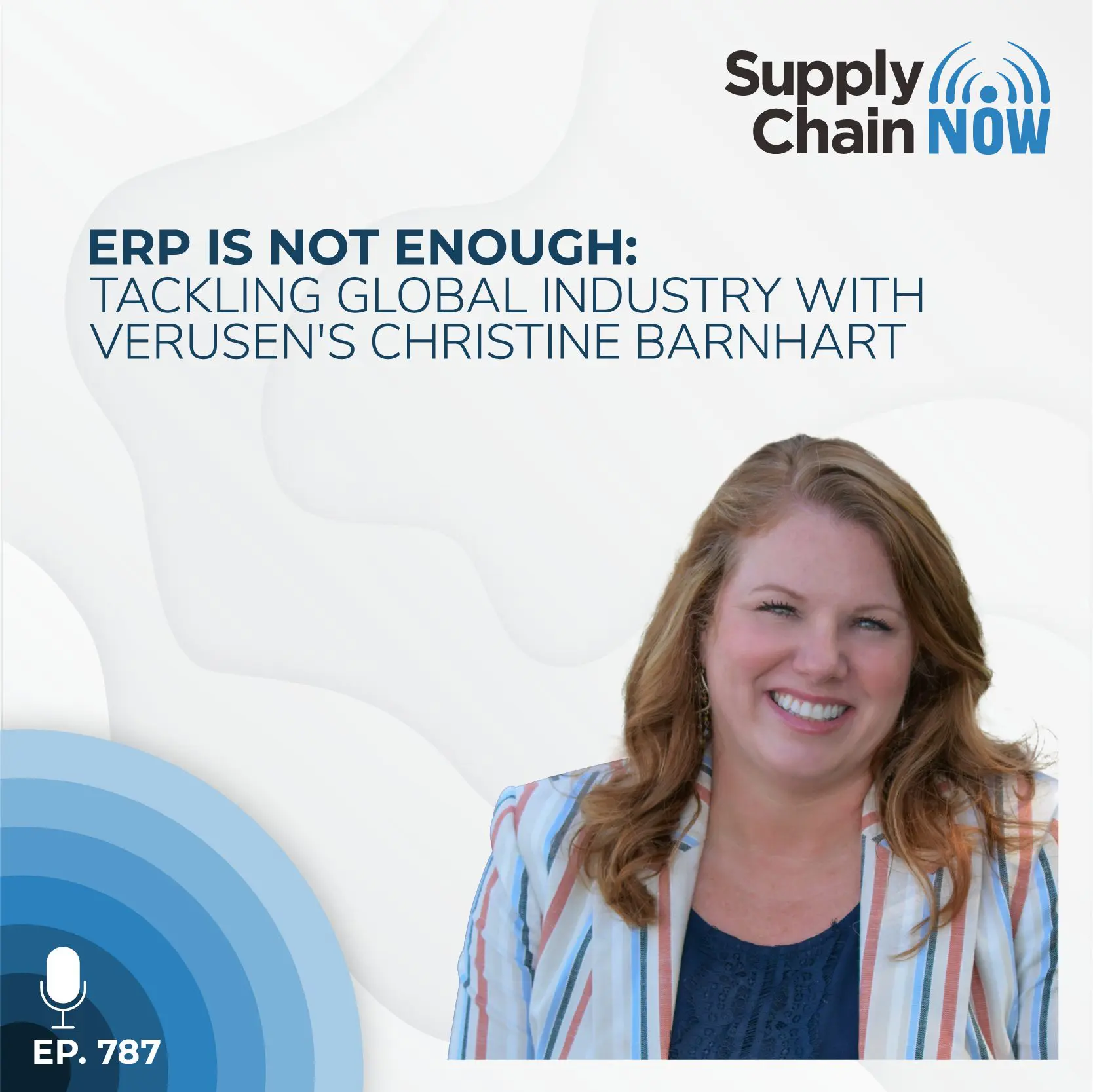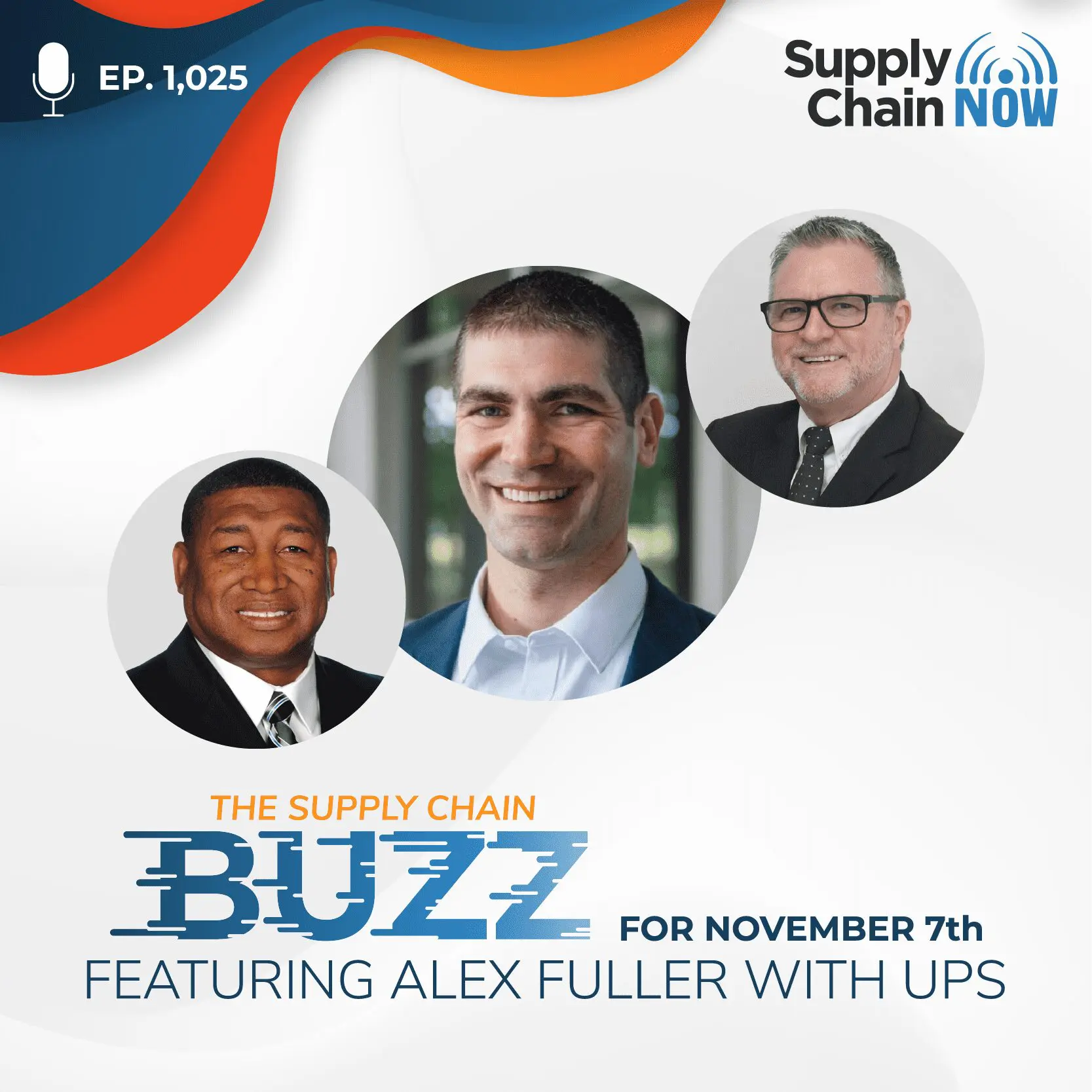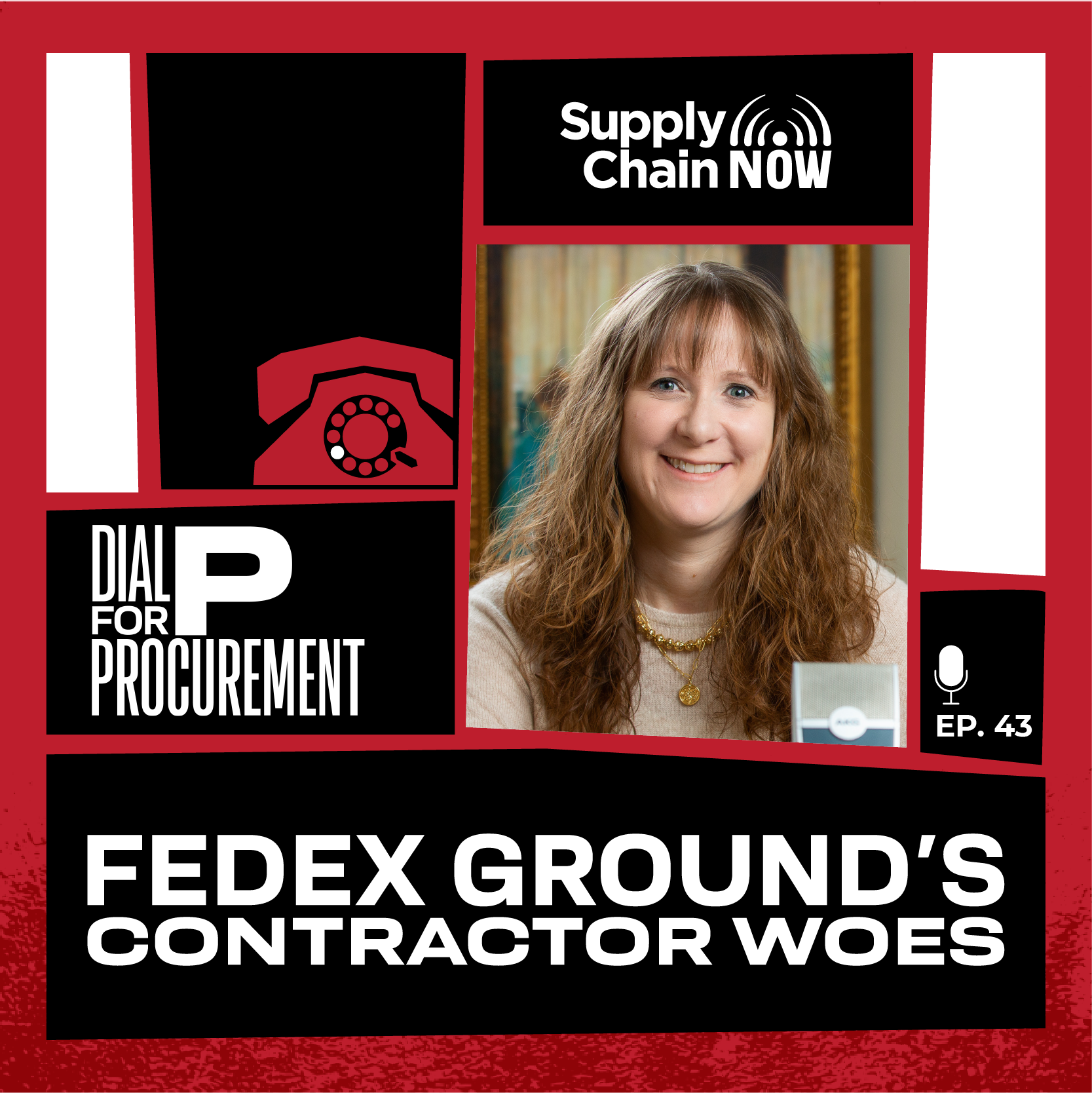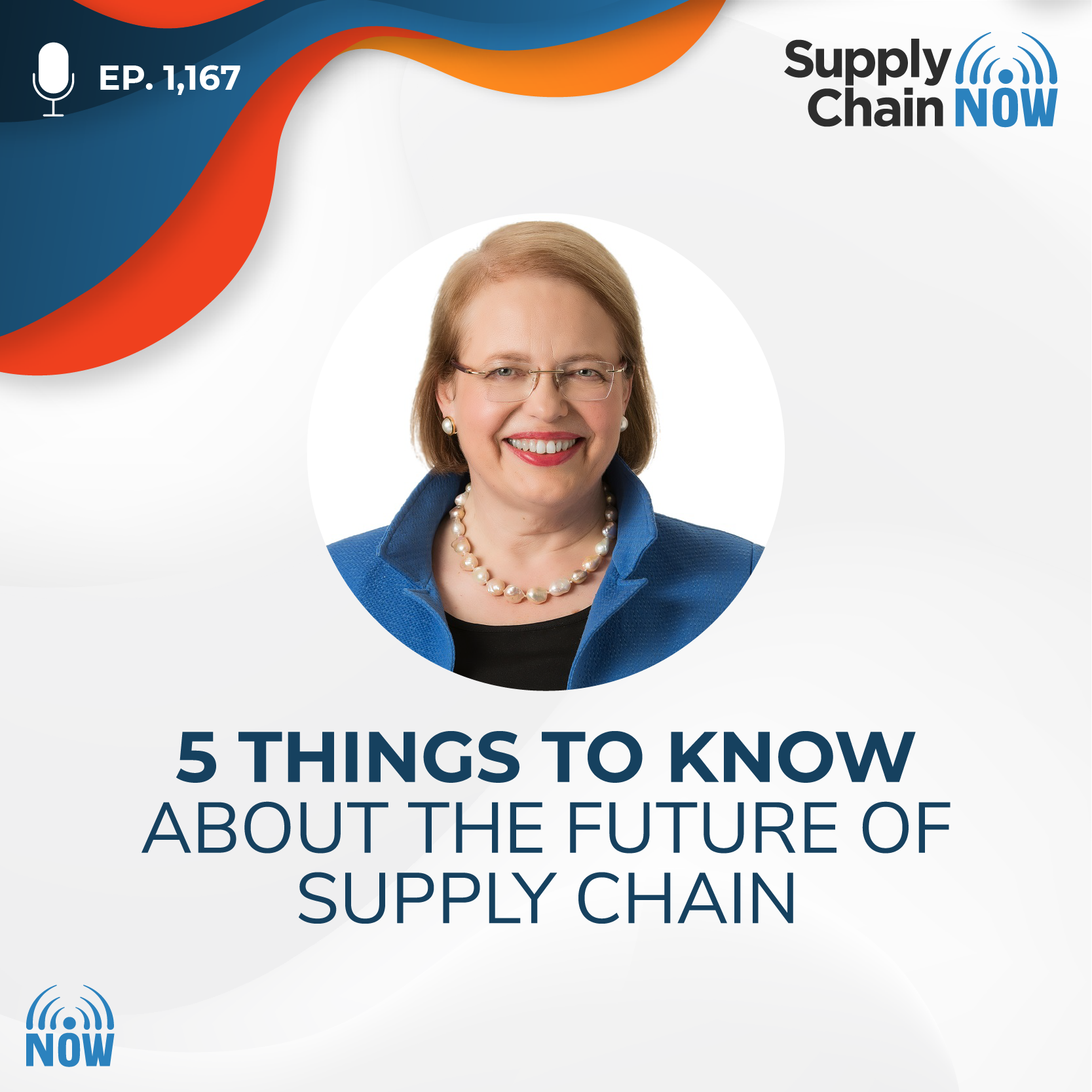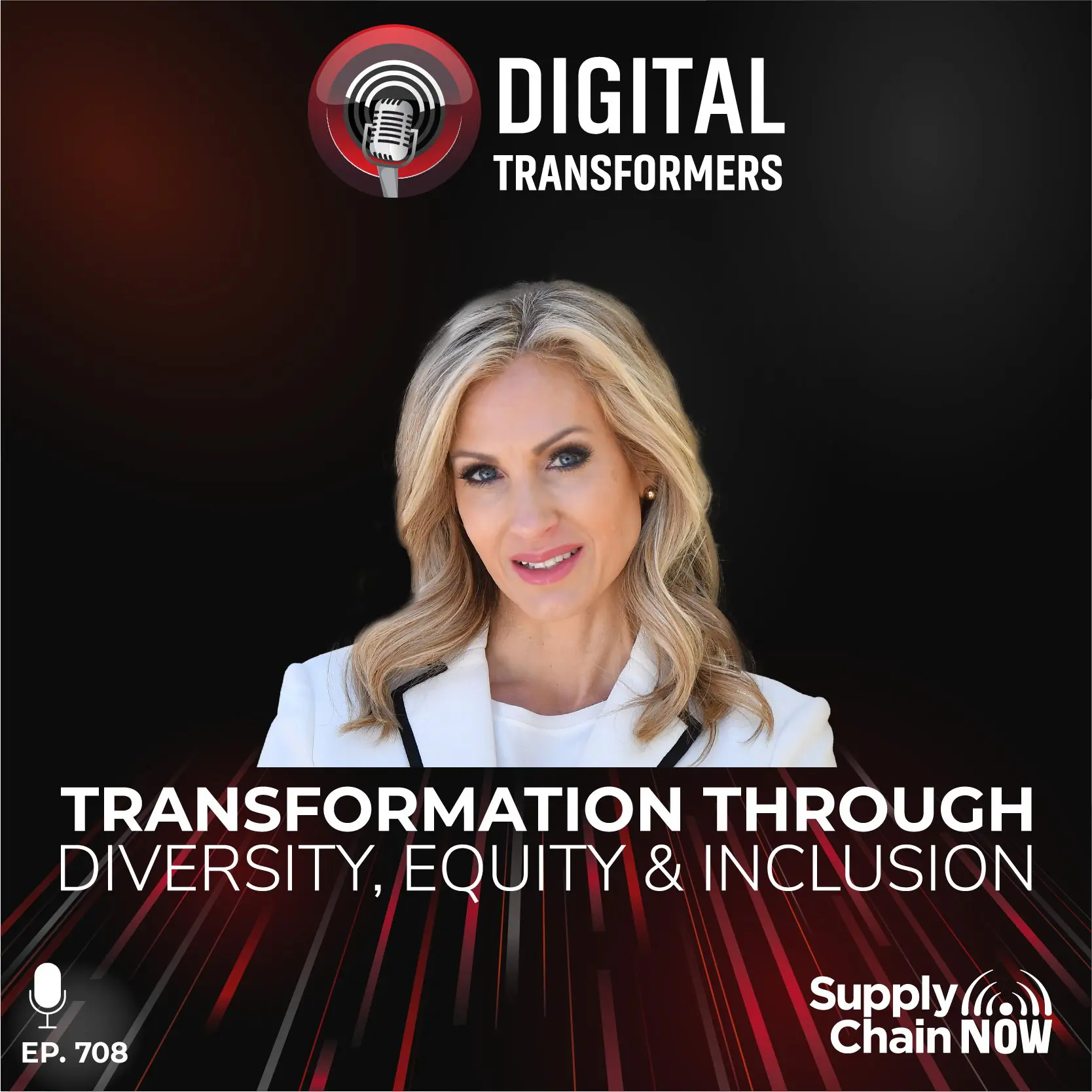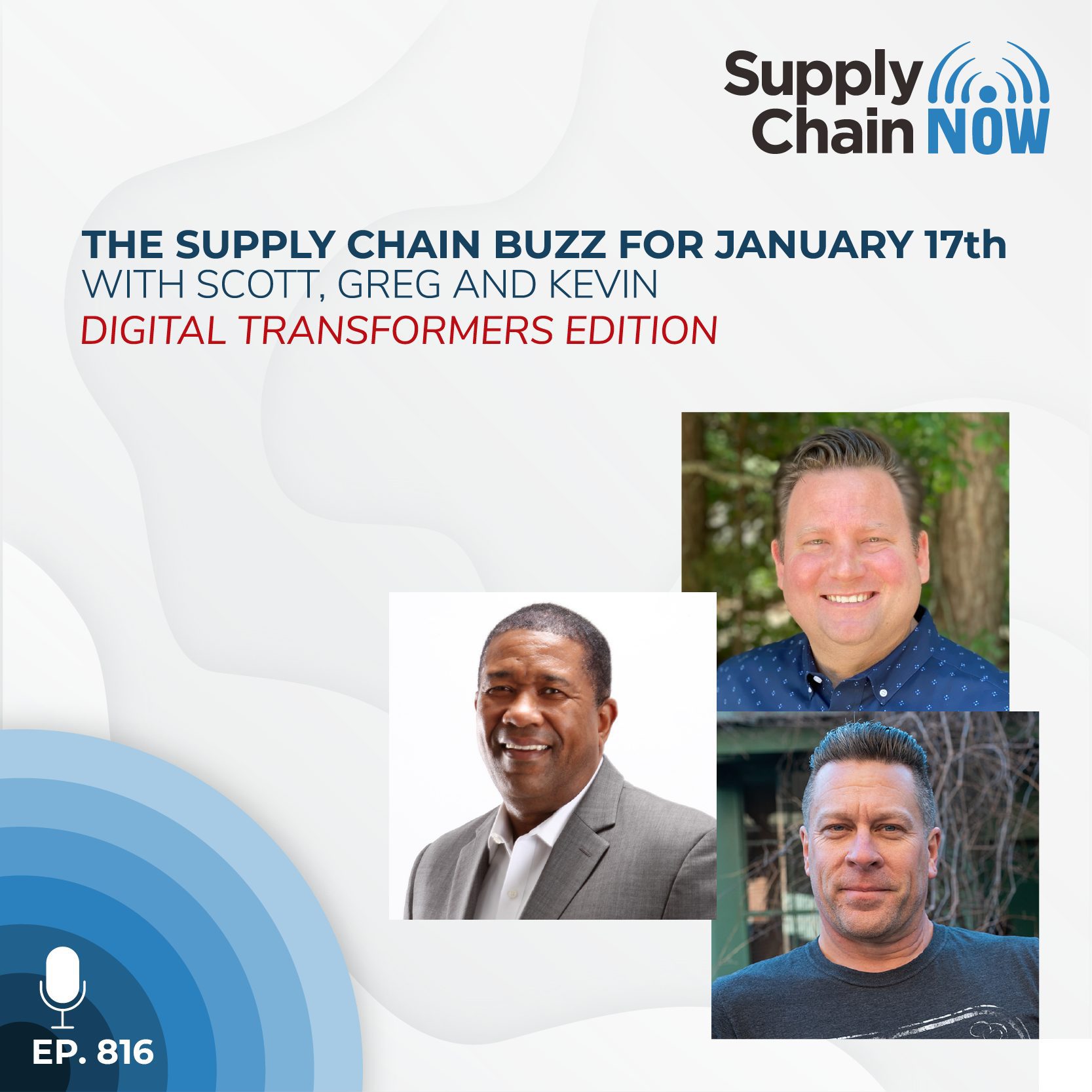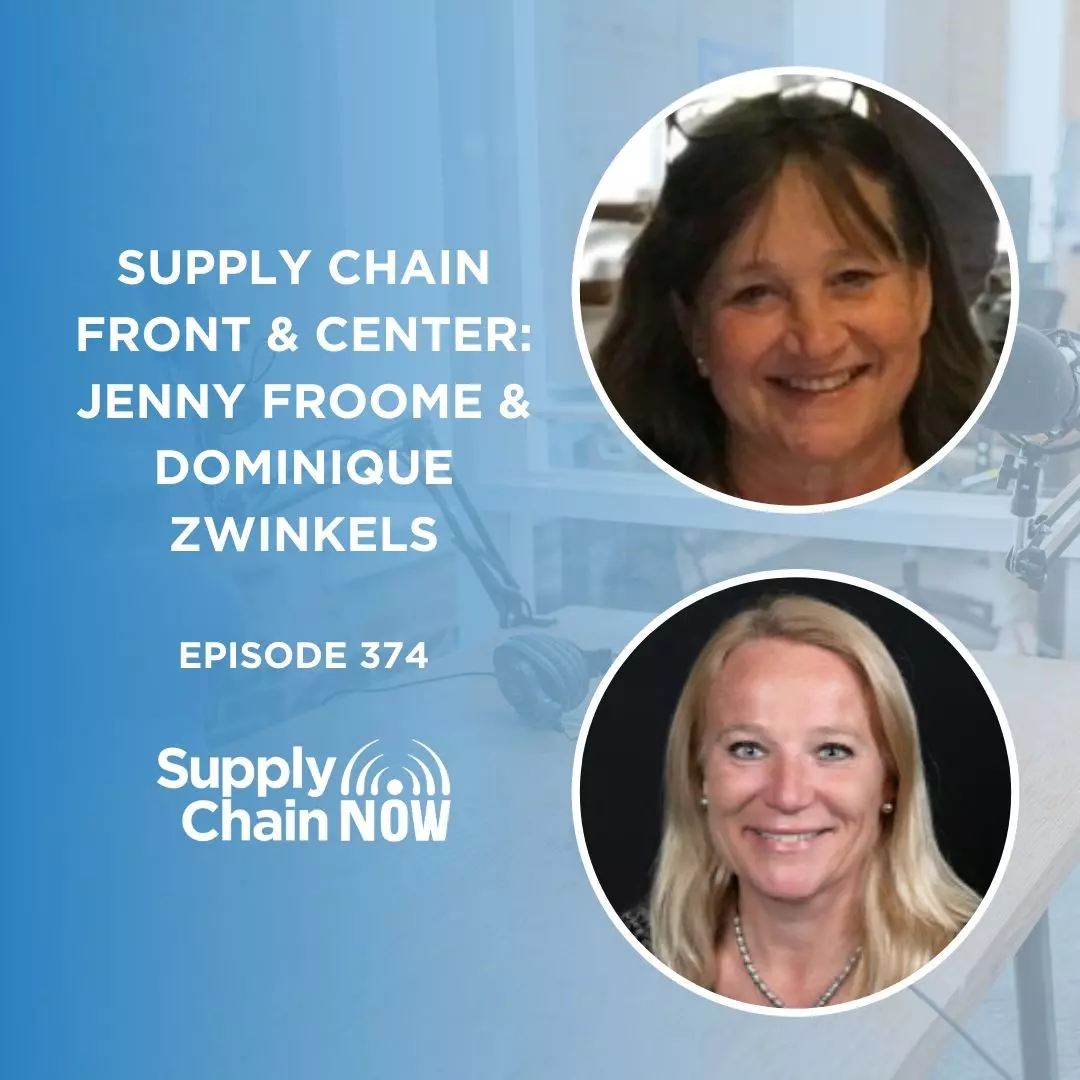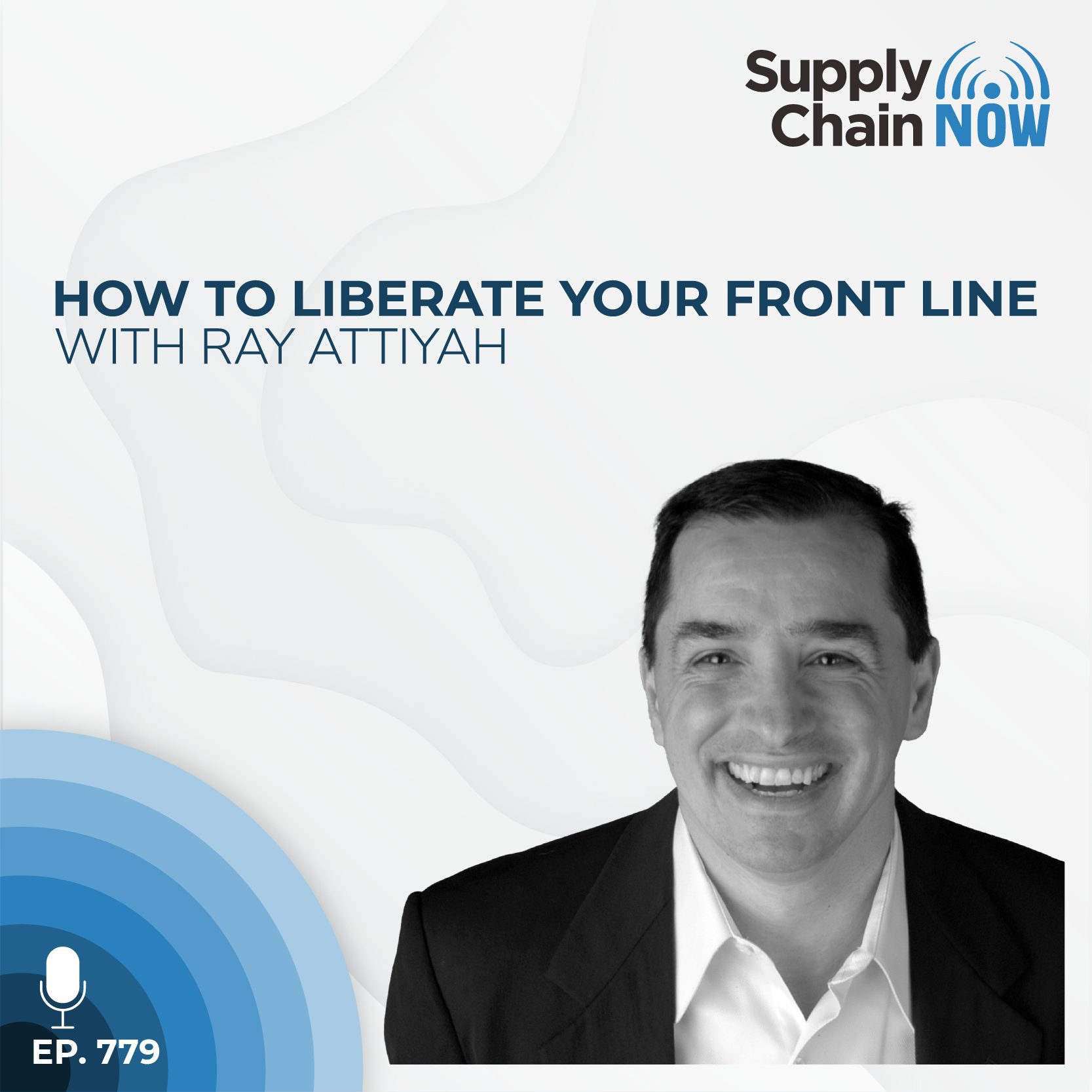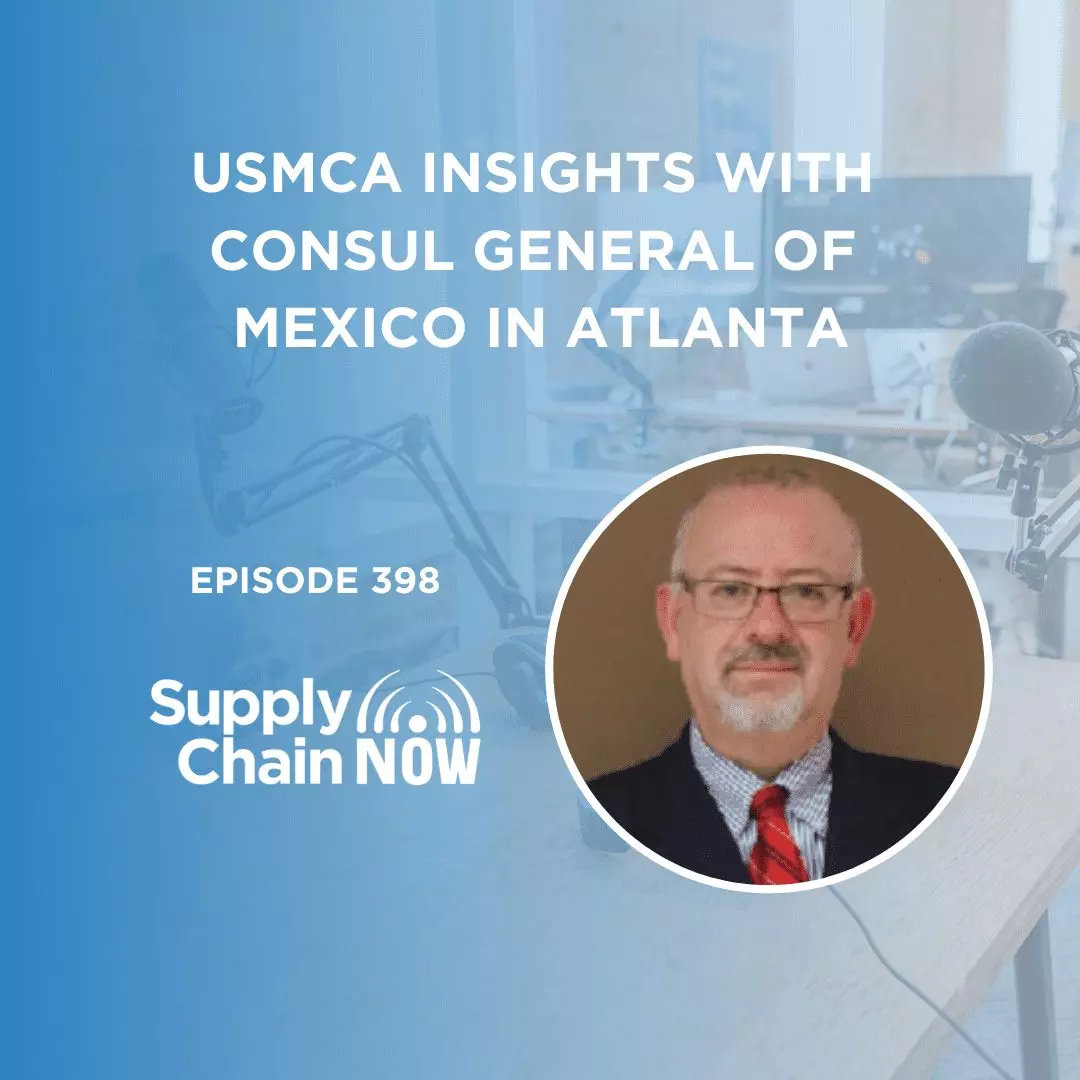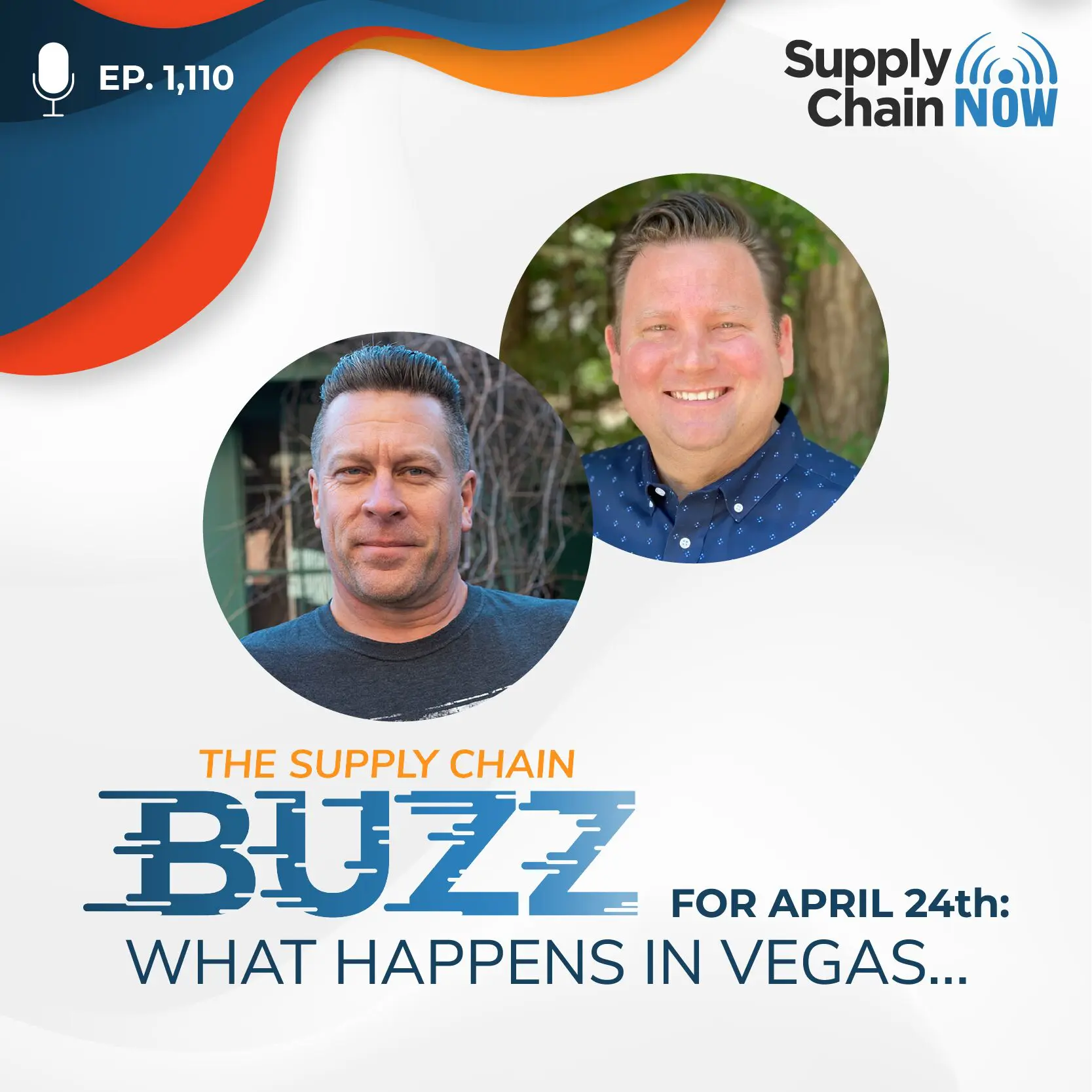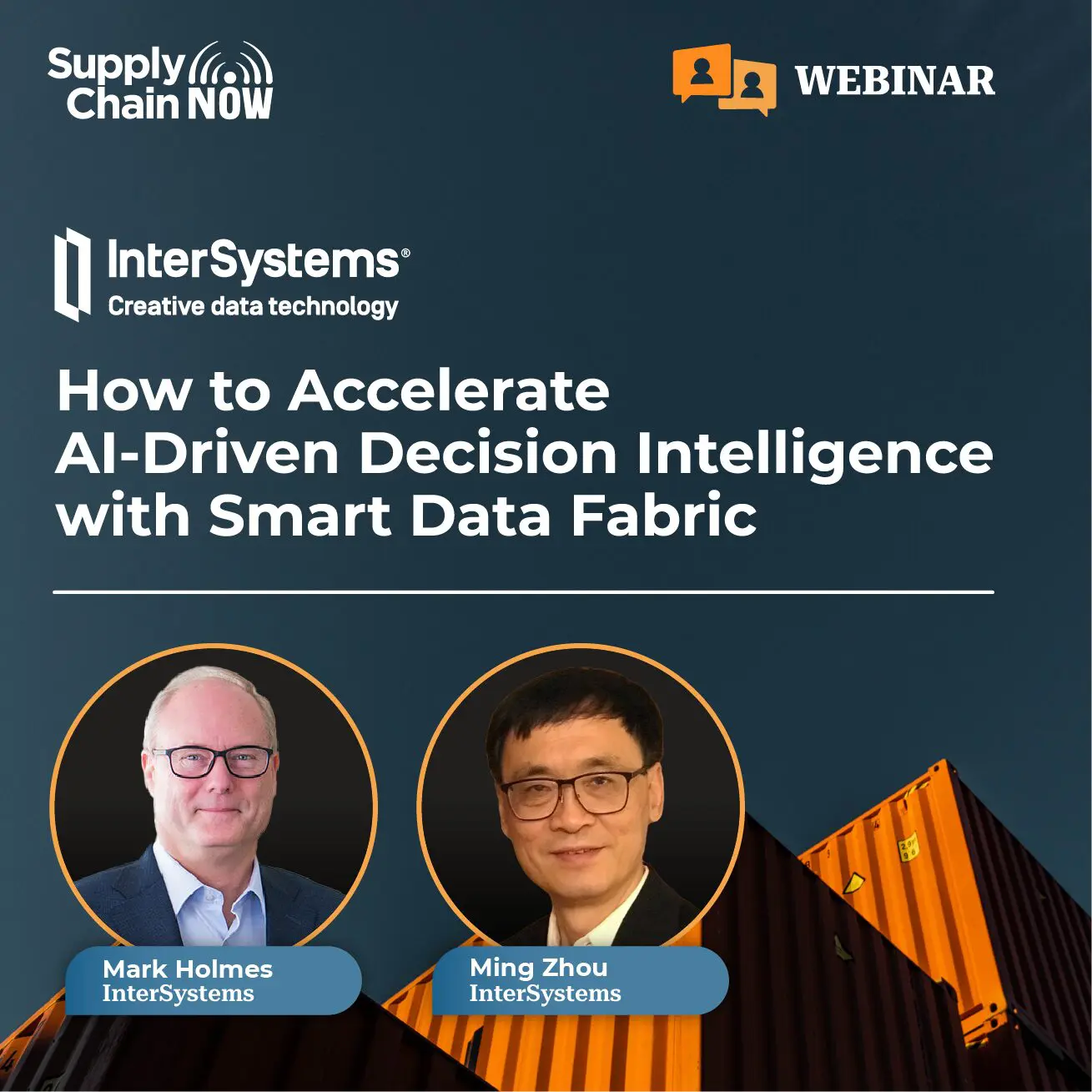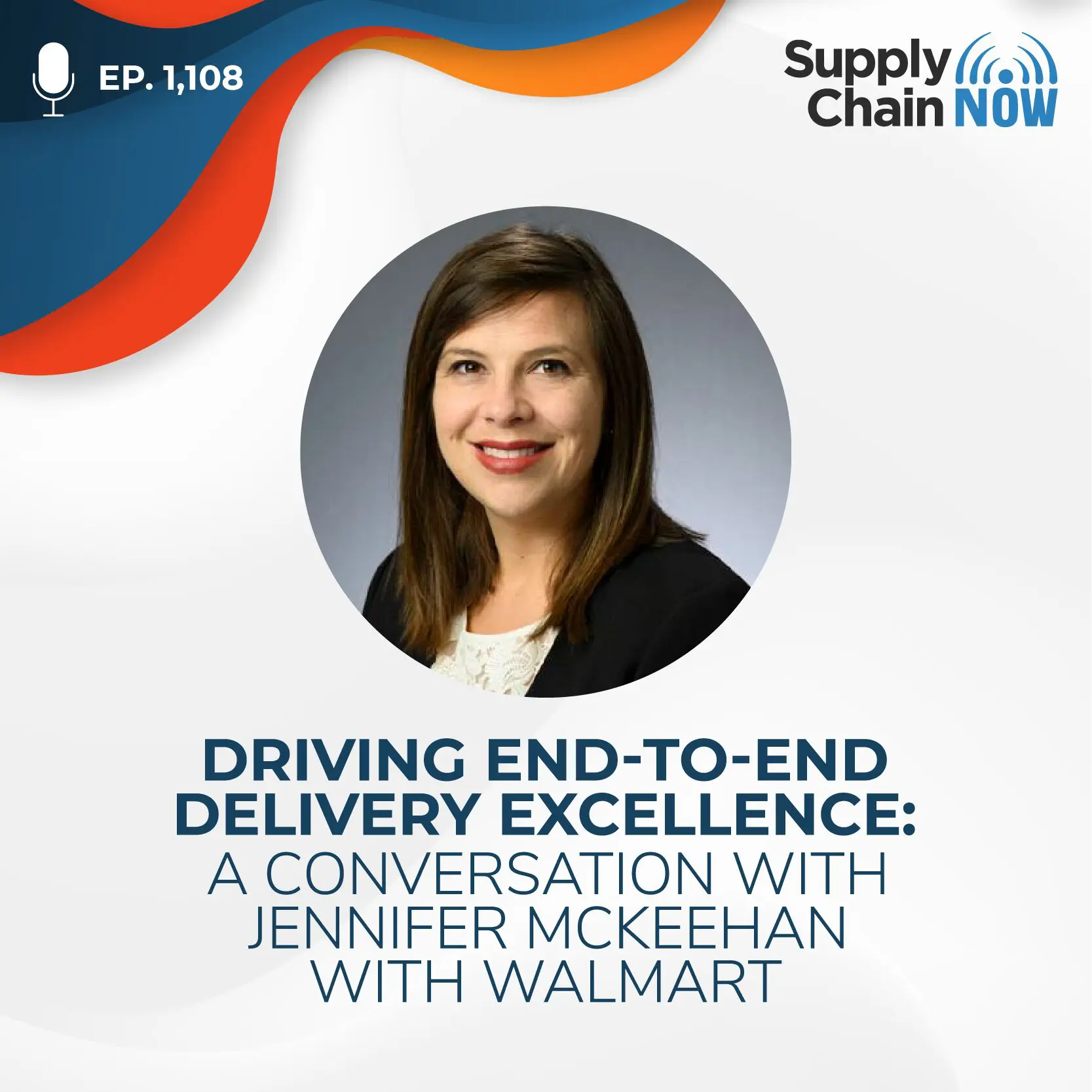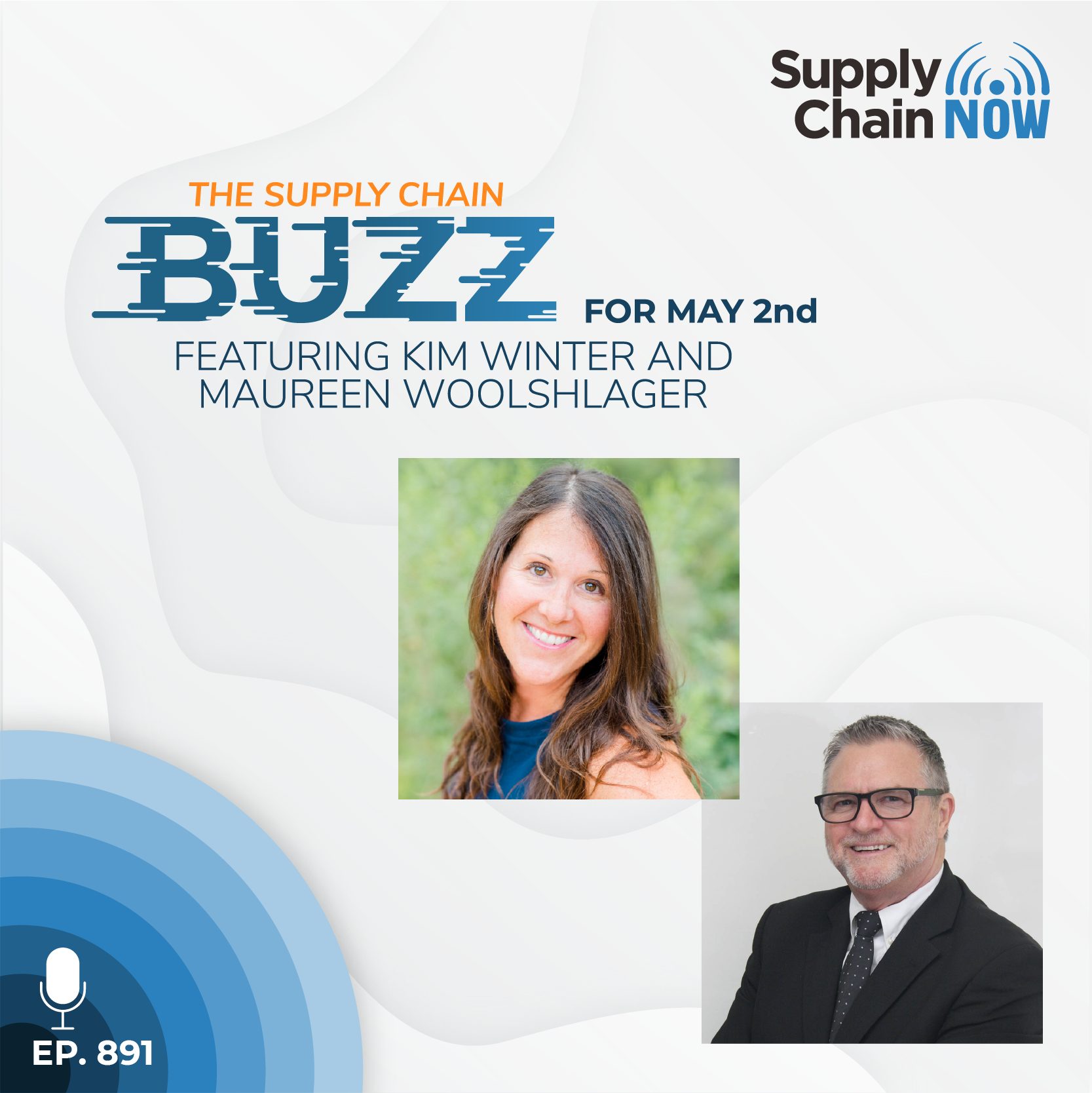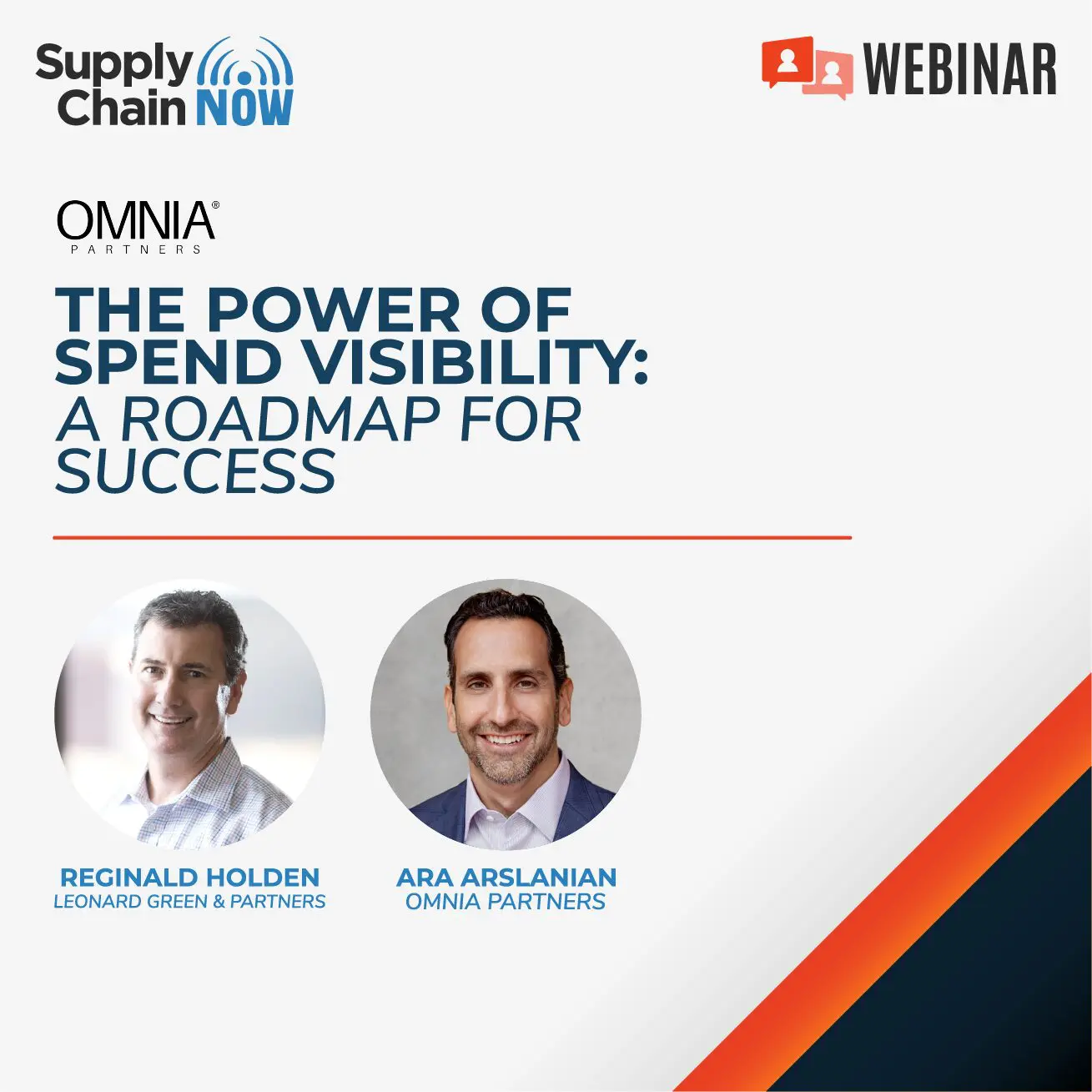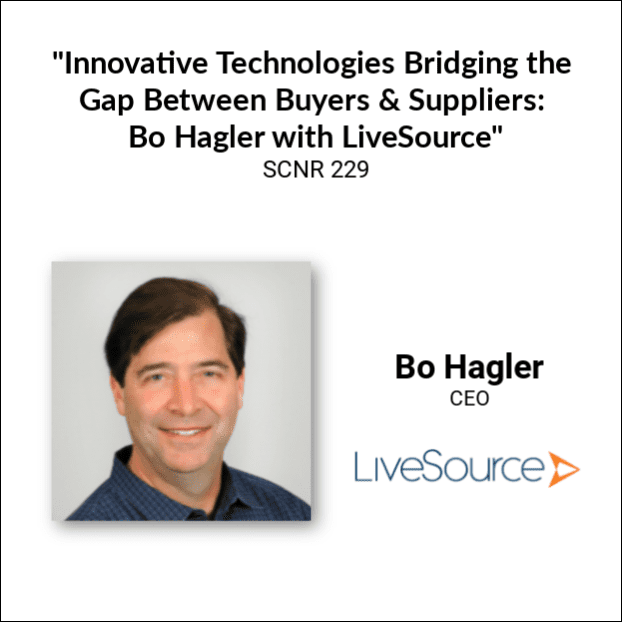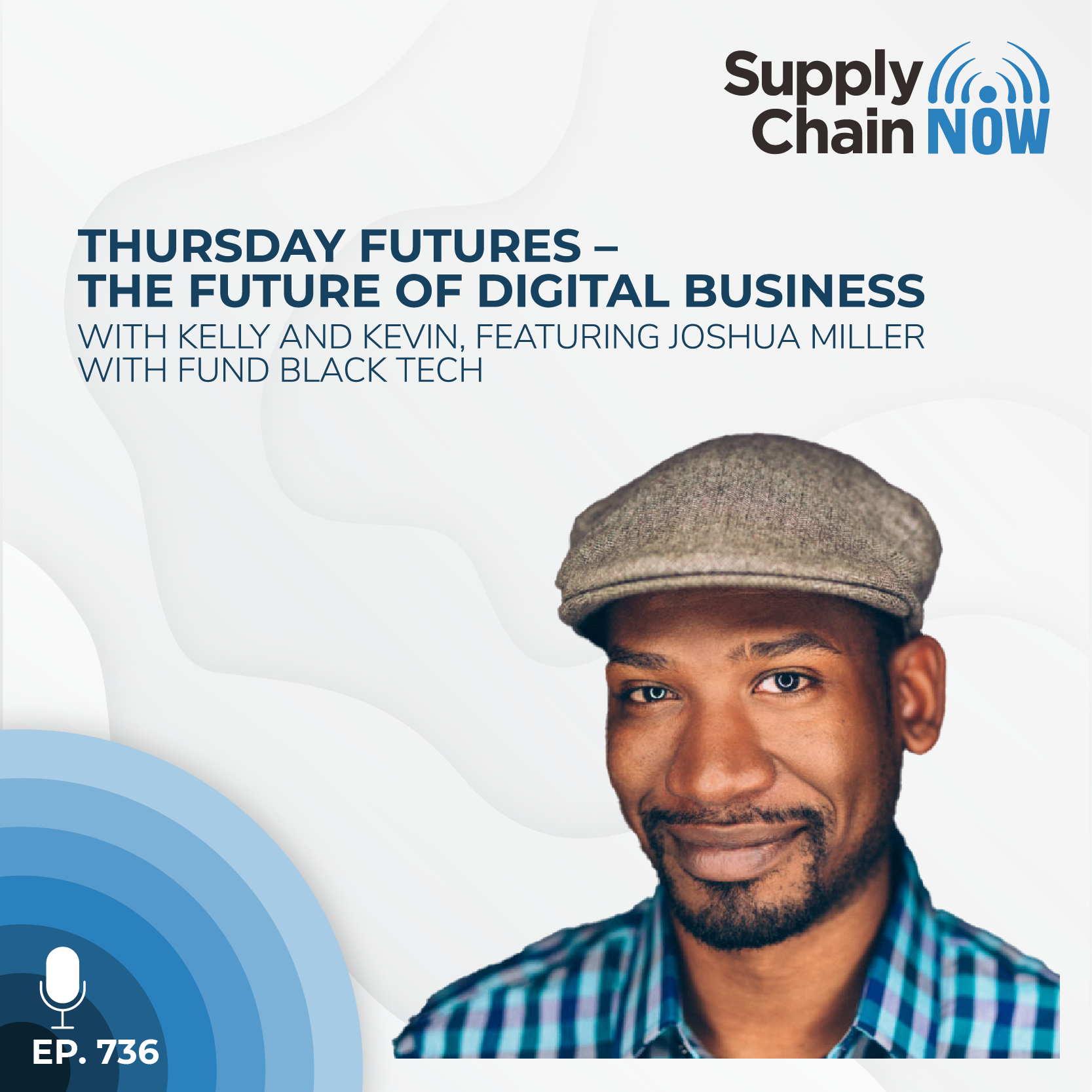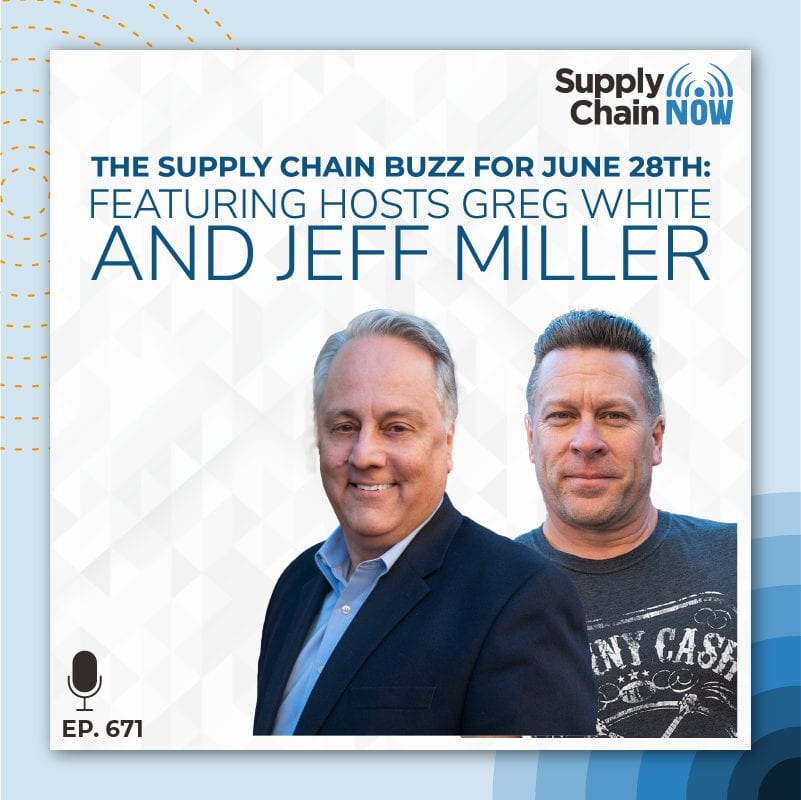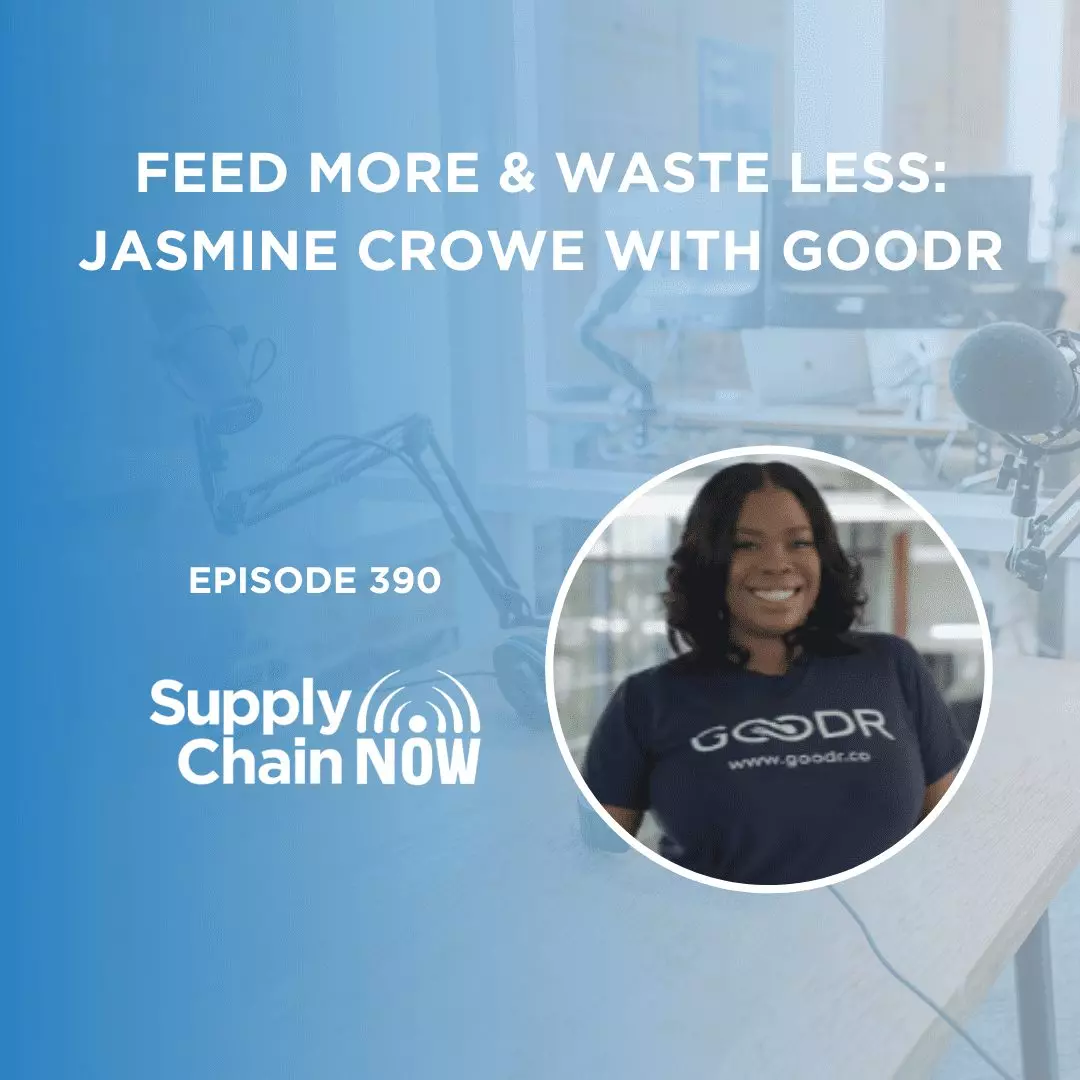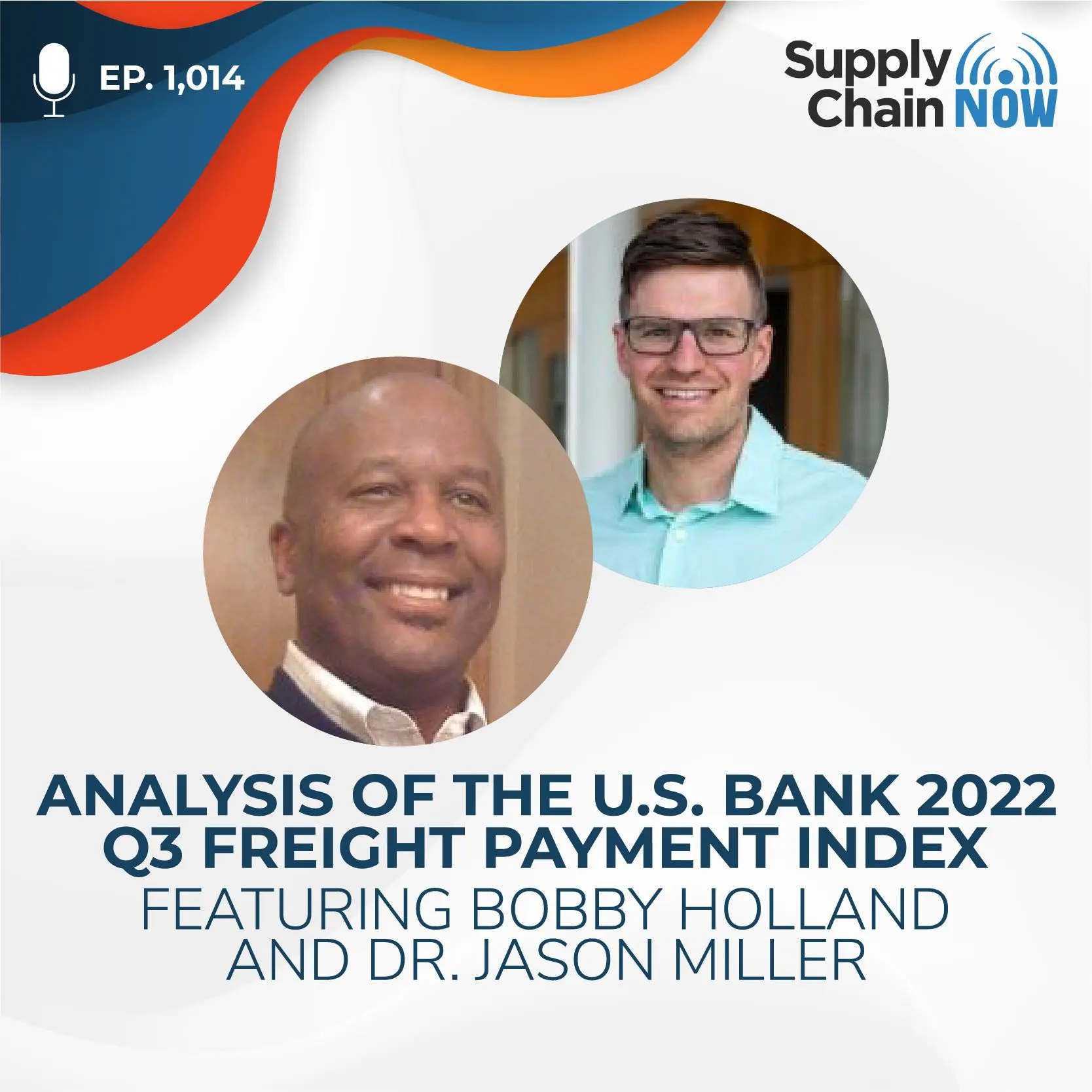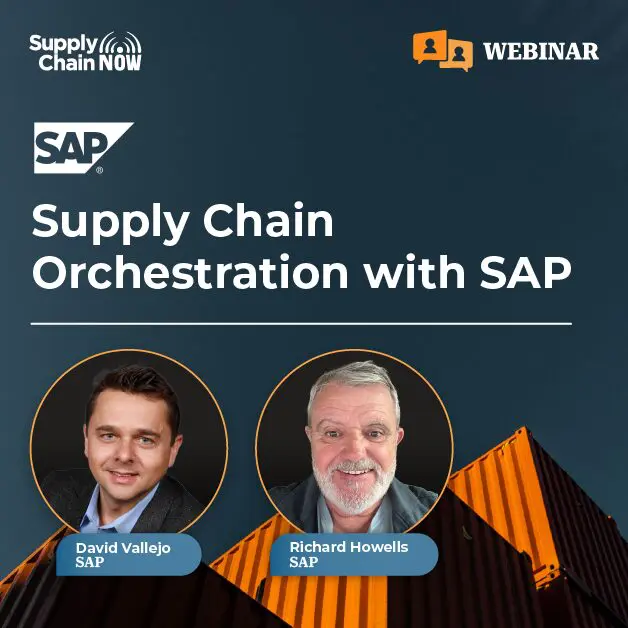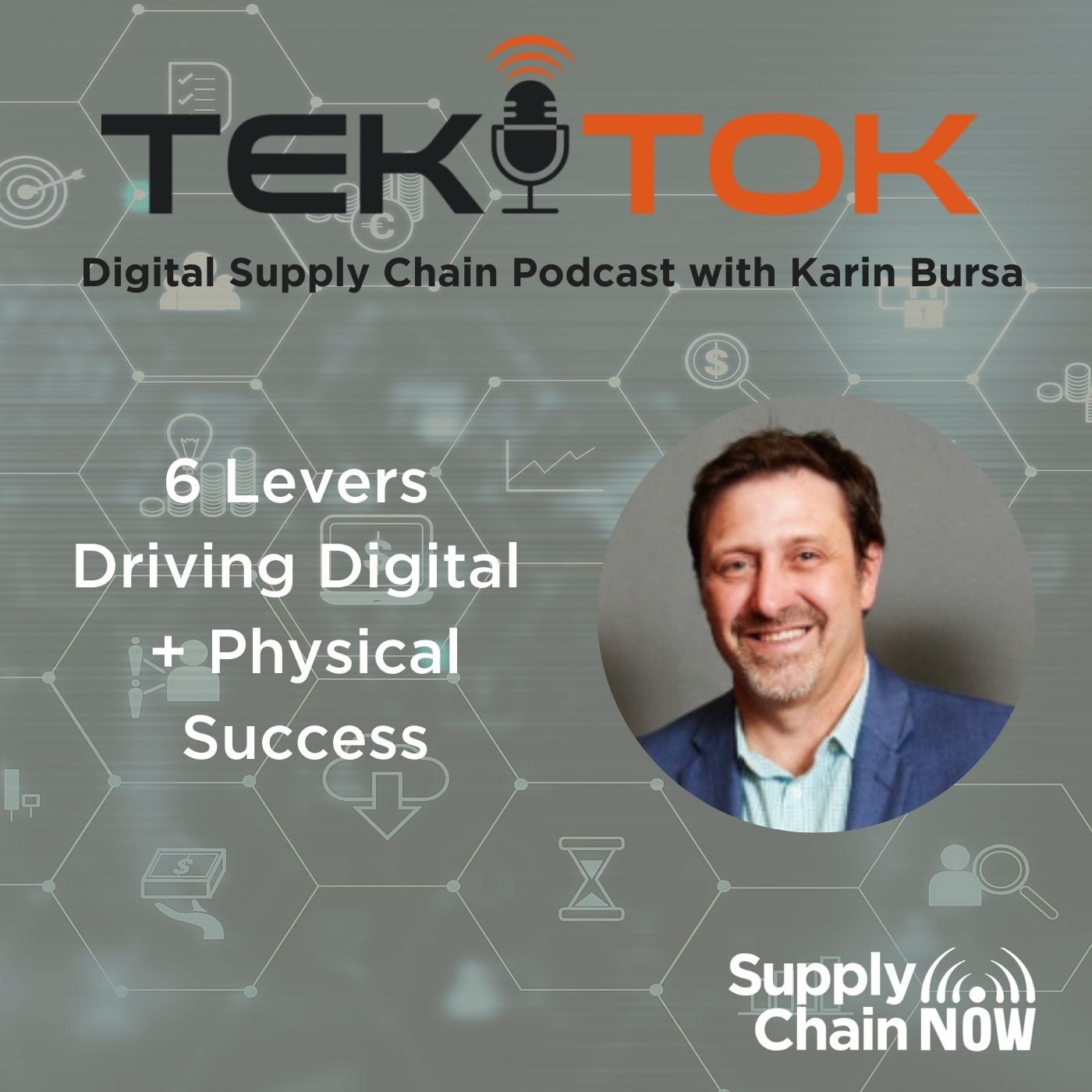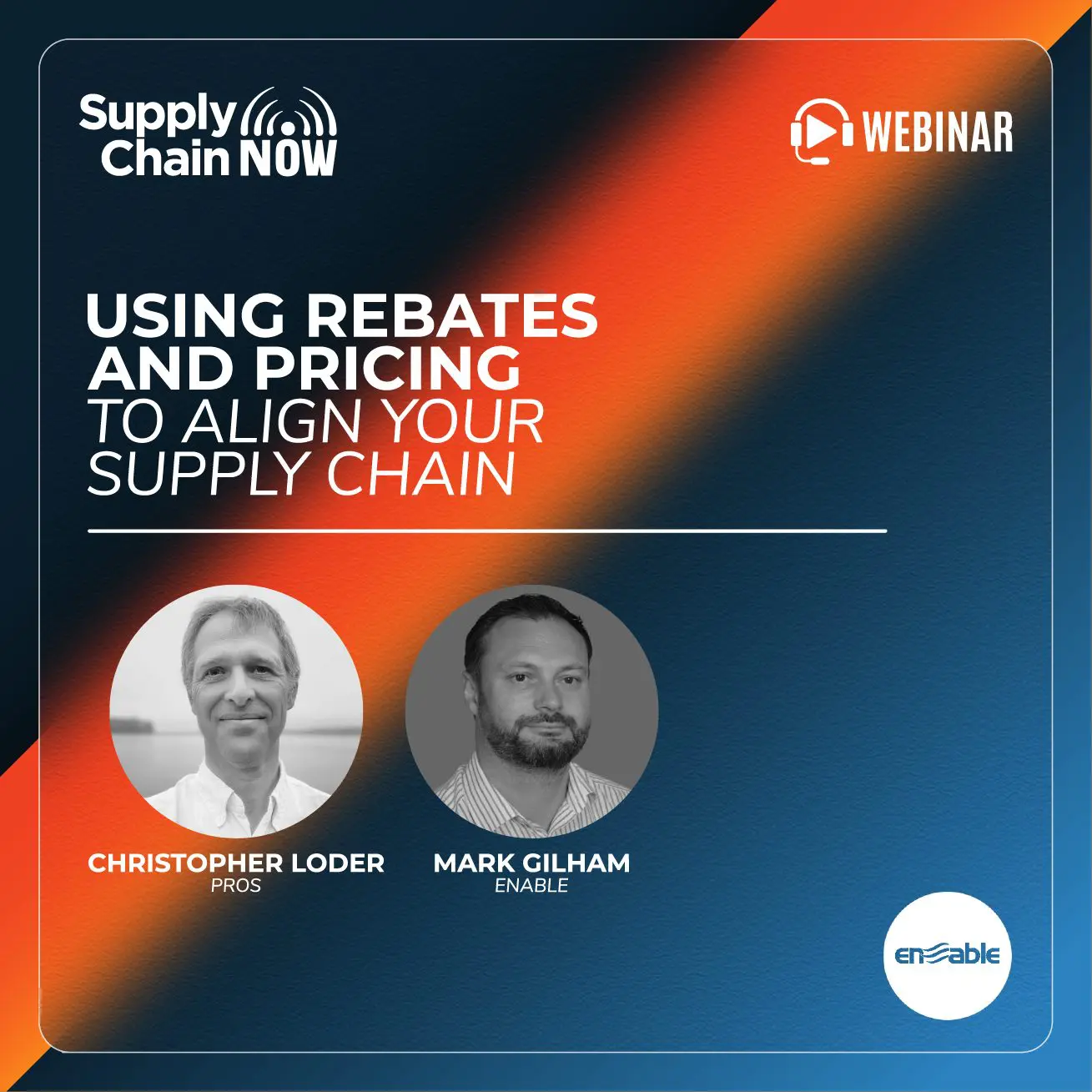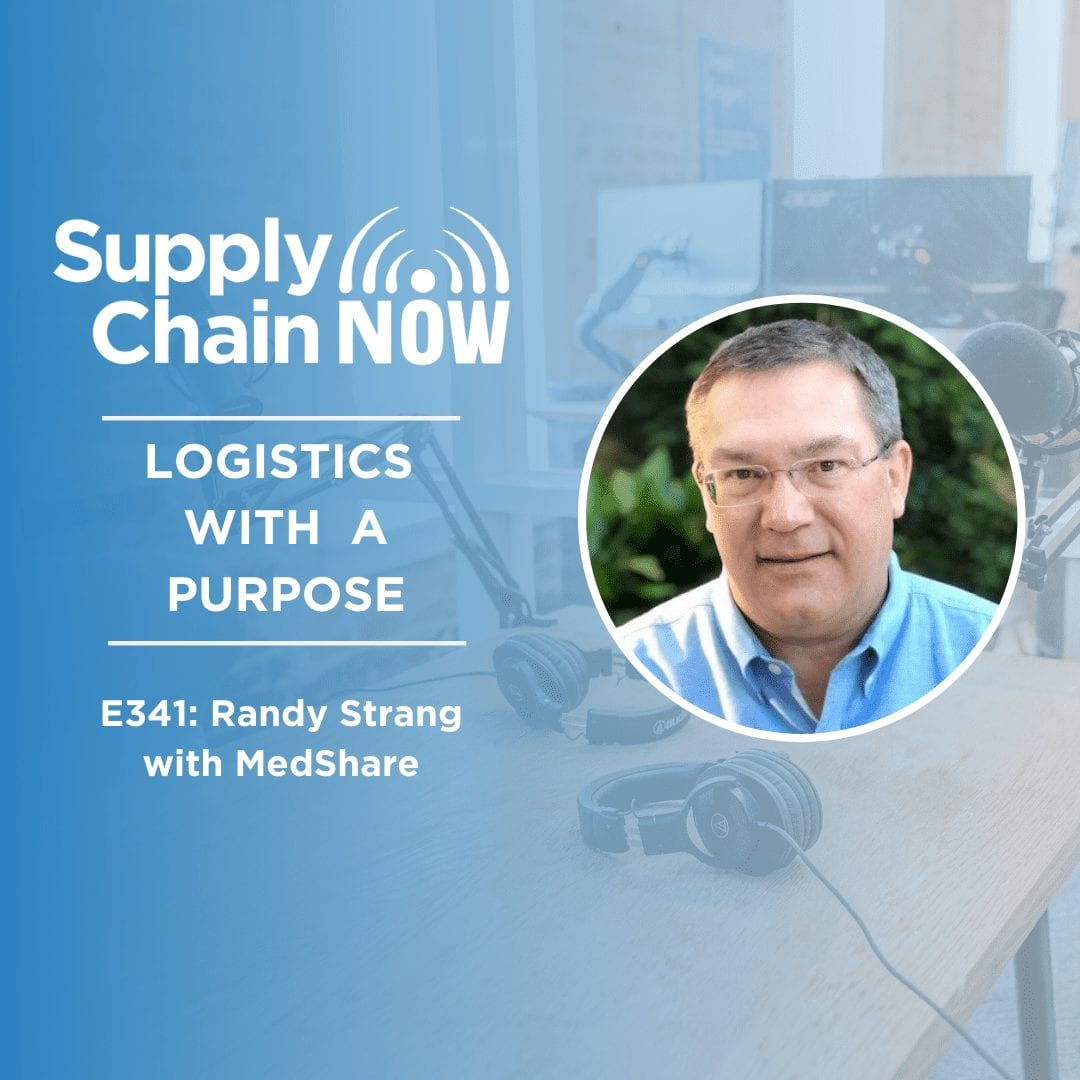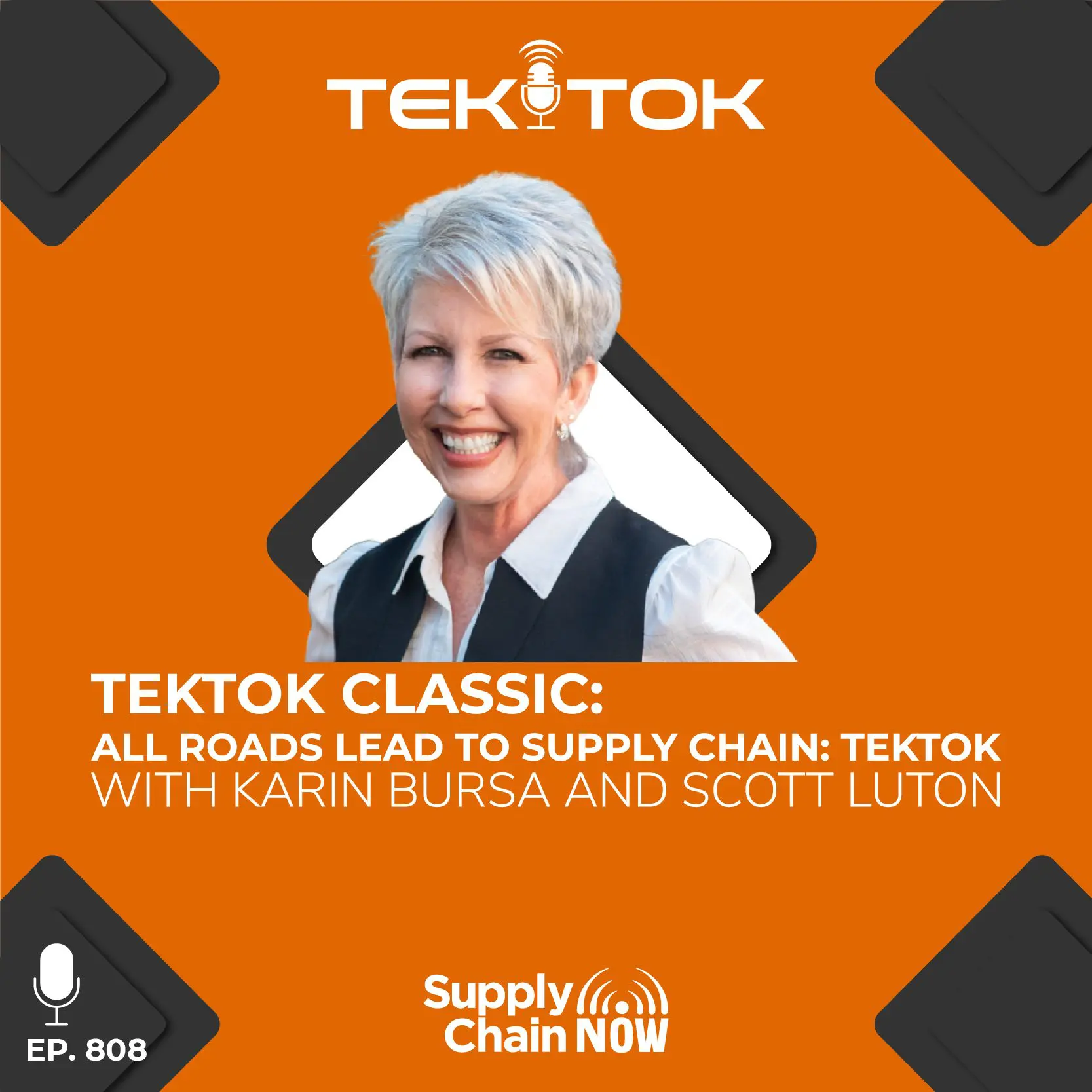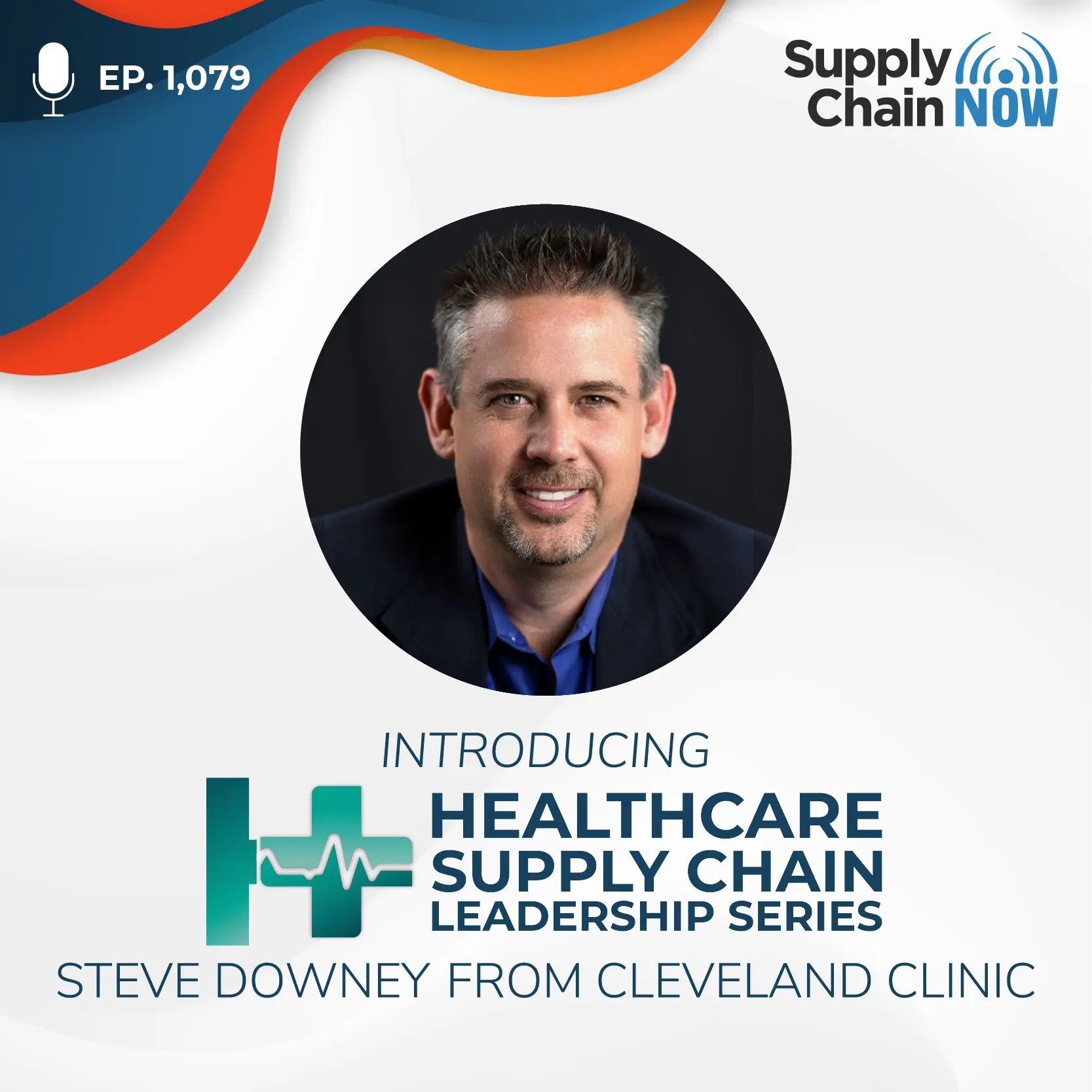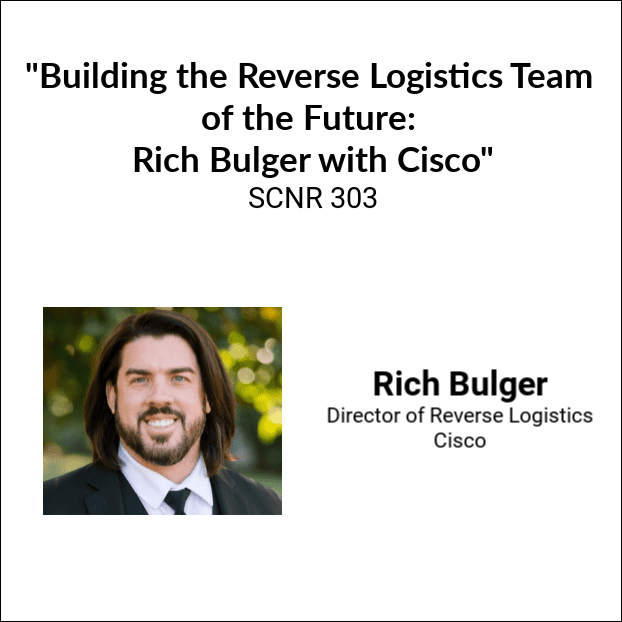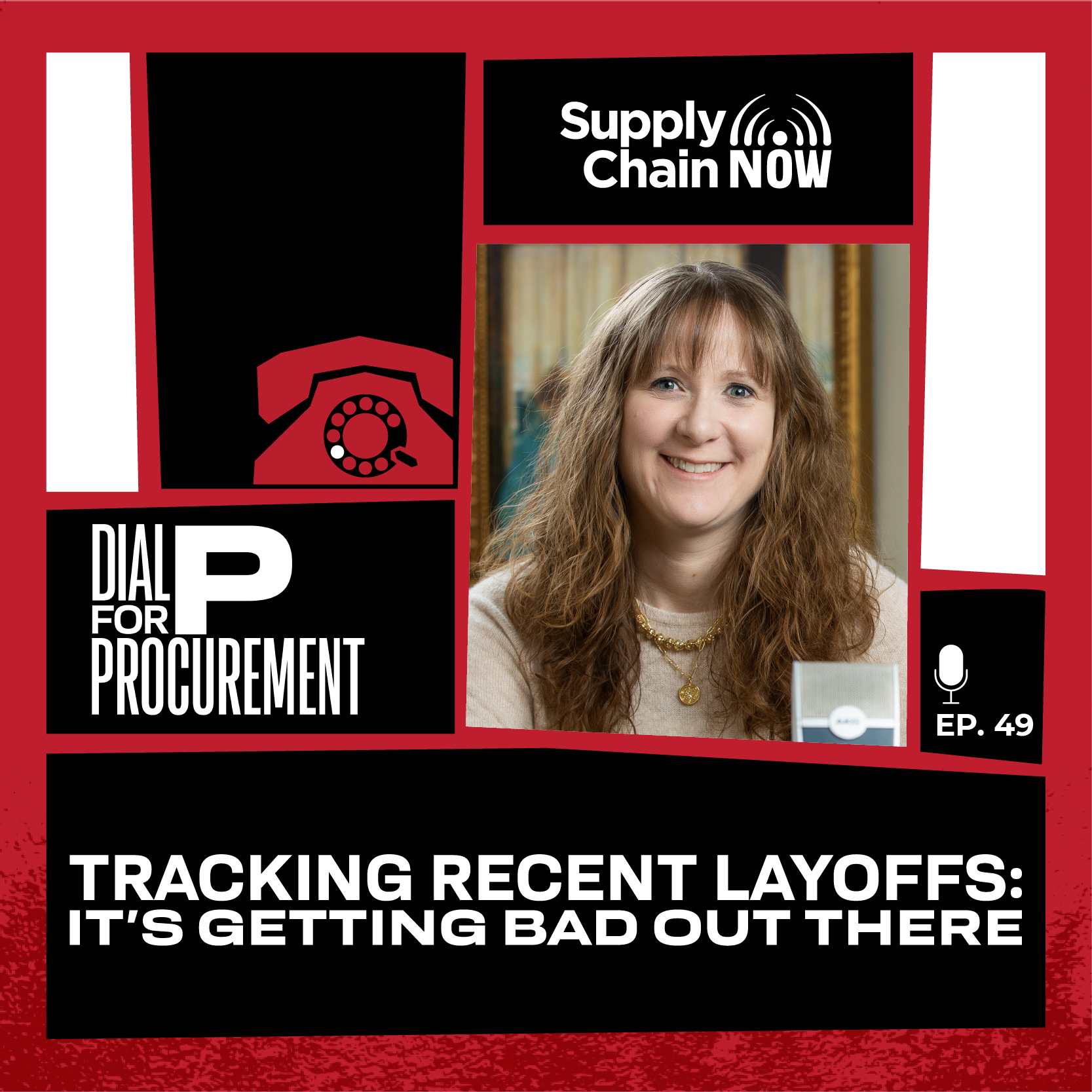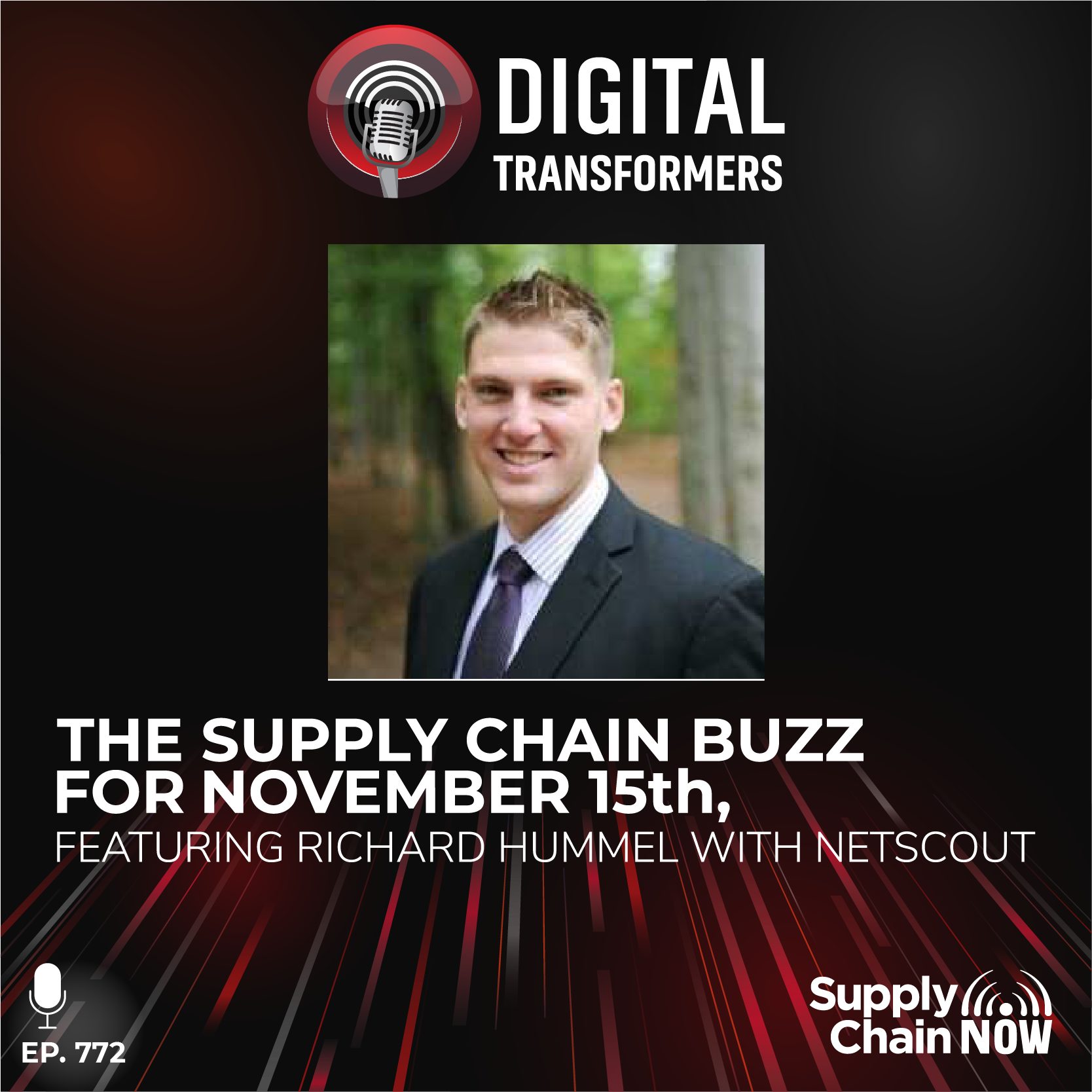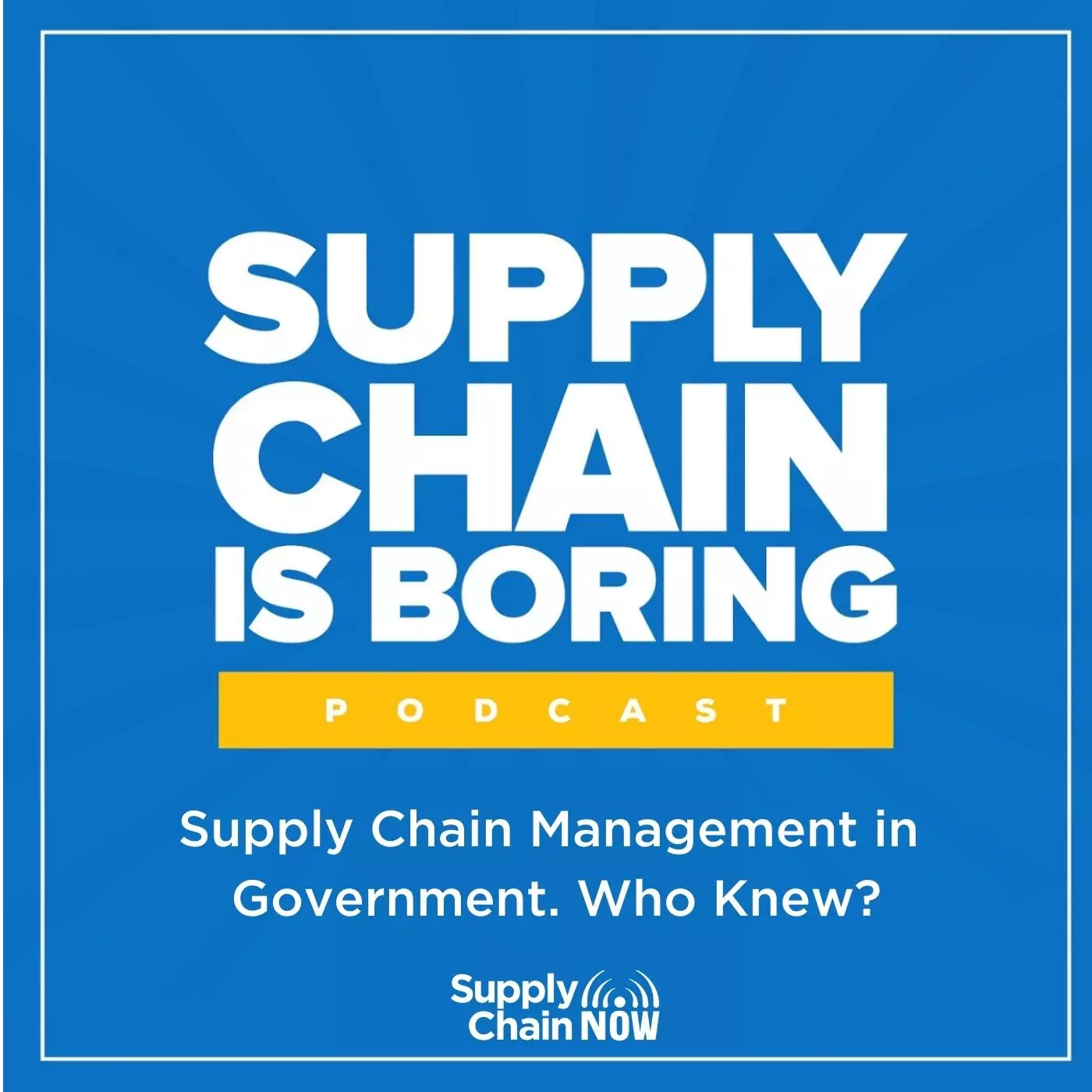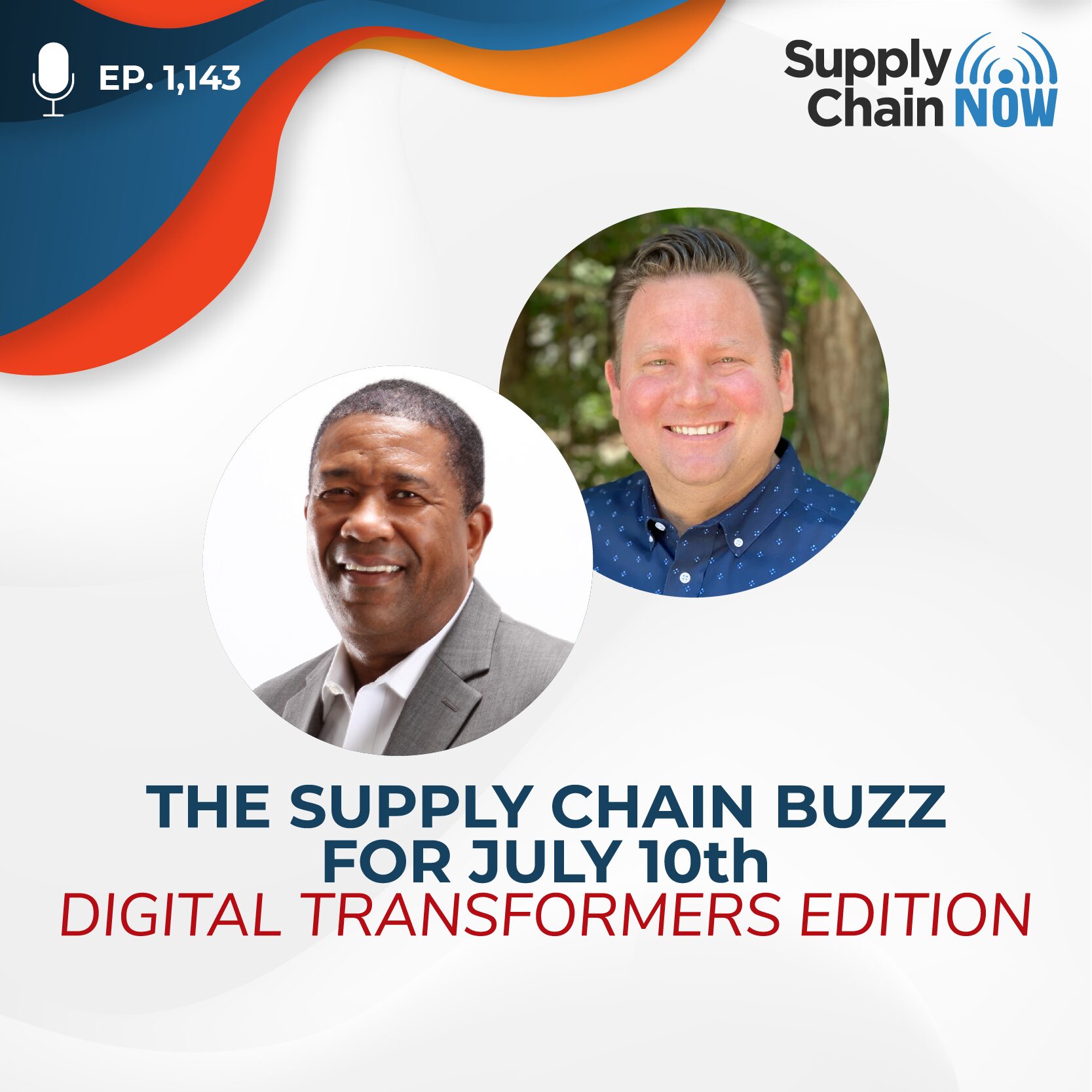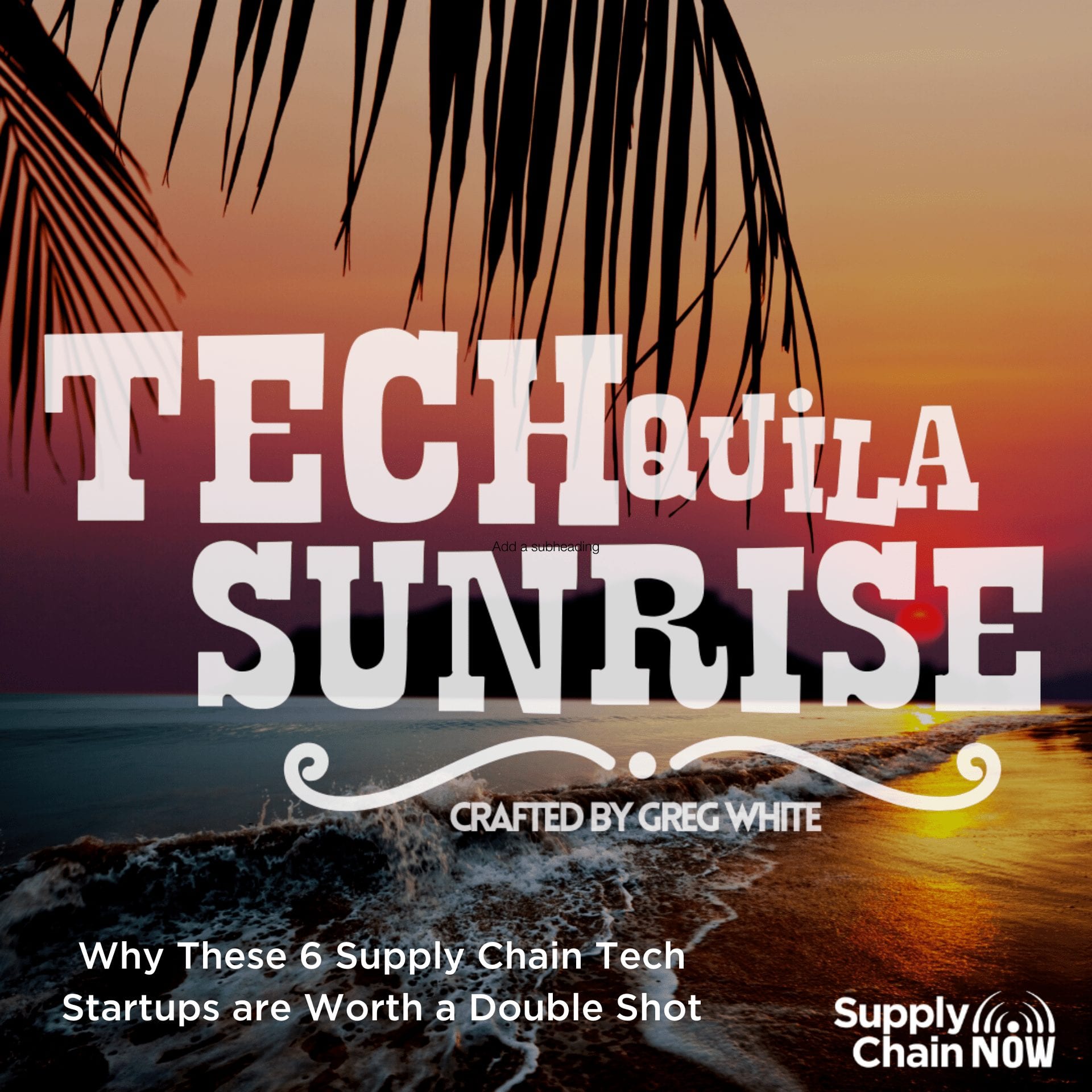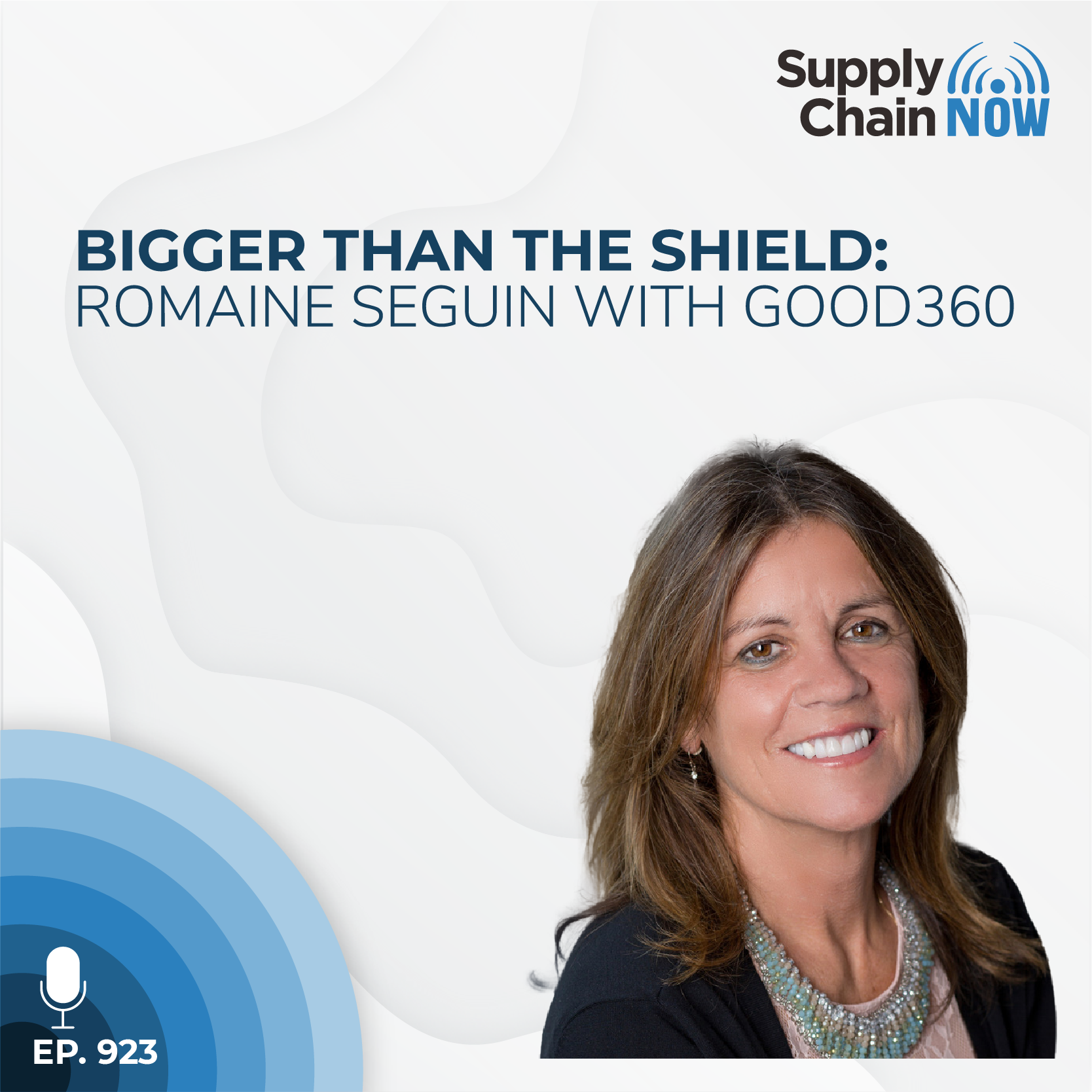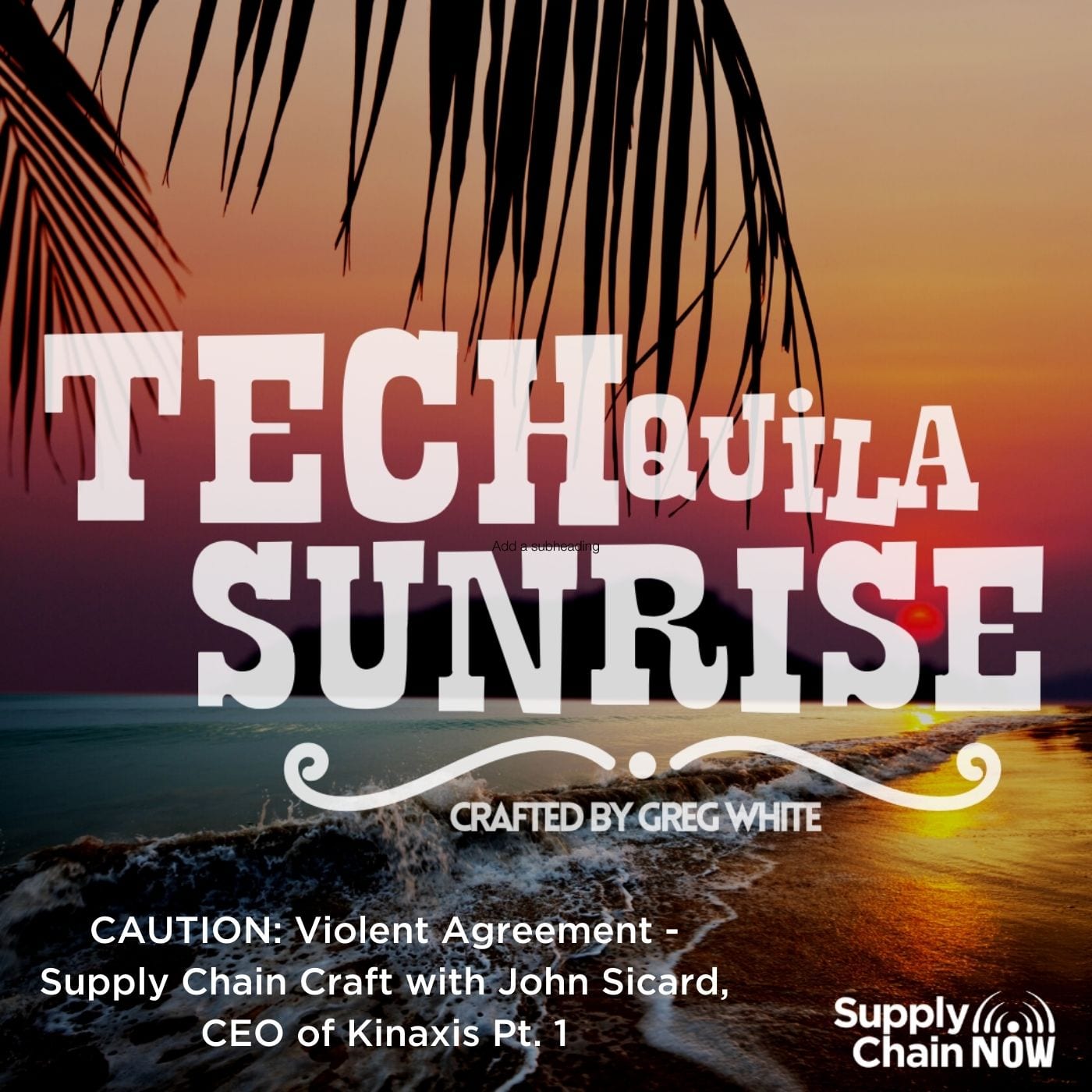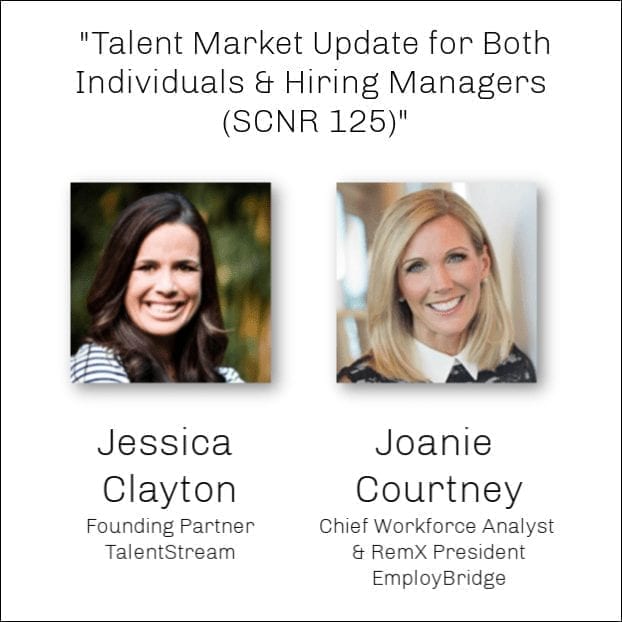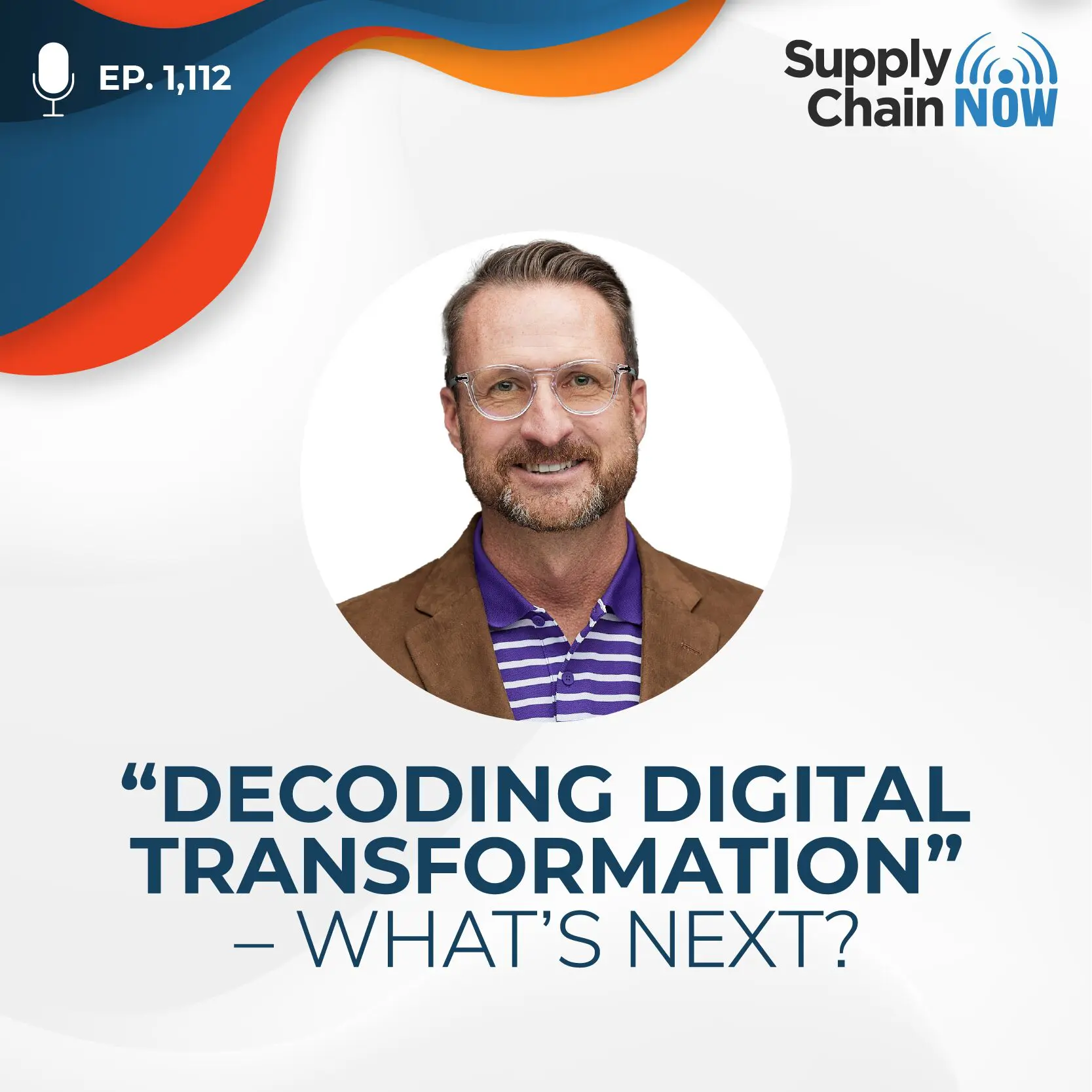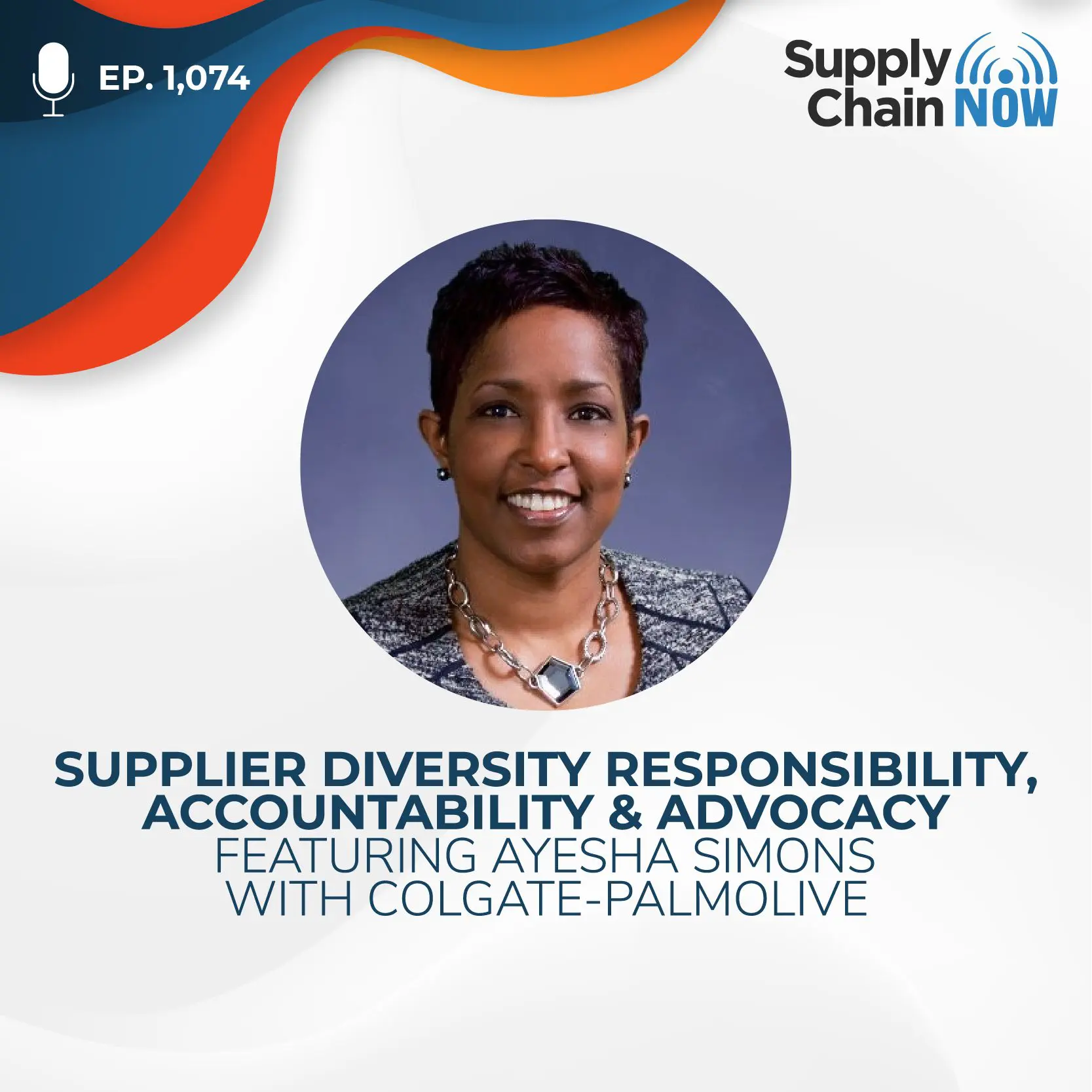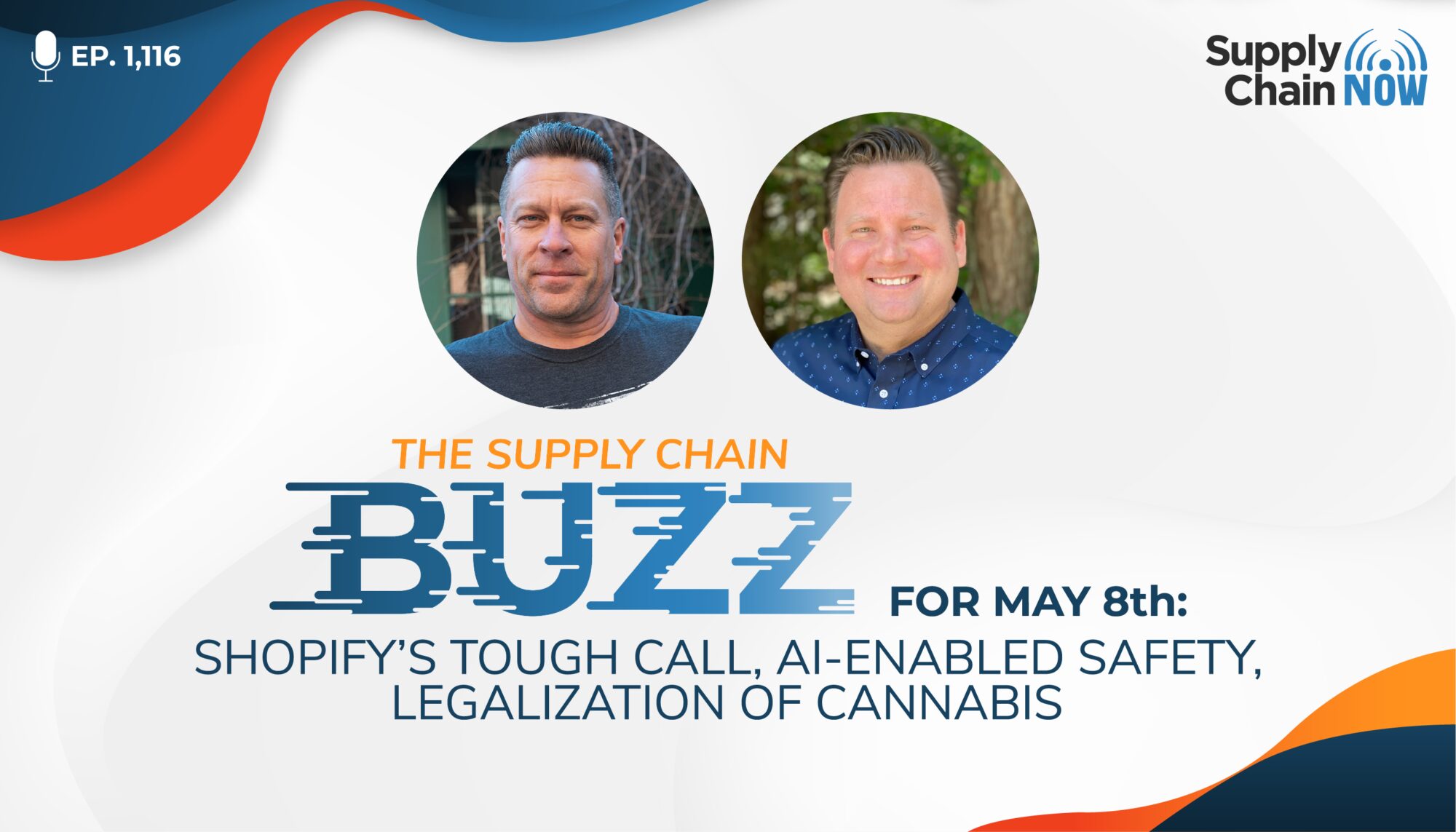
It is an open secret in the cannabis industry - cultivators, dispensaries, tech providers, government officials, and investors talk about the incredible lack of scruples. Virtually no one has made significant money.
- Greg White
Episode Summary
This week’s edition of The Buzz featured co-hosts Scott Luton and Greg White. In addition to covering top supply chain news stories from around the world, they teased six tools for doing supply chain management better, as shared in the most recent edition of “With That Said,” Supply Chain Now’s LinkedIn newsletter.
They also covered news stories relating to Shopify’s tough decision to refocus on their retail operations, AI-enabled worker safety in manufacturing, and the ‘open secret’ about business practices and profitability in the cannabis industry.
Episode Transcript
Intro/Outro (00:03):
Welcome to Supply Chain. Now the voice of global supply chain supply chain now focuses on the best in the business for our worldwide audience, the people, the technologies, the best practices, and today’s critical issues, the challenges and opportunities. Stay tuned to hear from Those Making Global Business happen right here on supply chain Now.
Scott Luton (00:31):
Hey, hey. Good morning, good afternoon, good evening, Scott Luton and Greg White here with you on Supply Chain. Now, welcome to today’s live stream, Greg. How you doing today?
Greg White (00:40):
I’m doing quite well, Scott. It’s yeah, very lovely weekend. How <laugh>,
Scott Luton (00:46):
Is there ever a bad day in Greg White’s neighborhood?
Greg White (00:50):
Uh, wow. Uh, probably, uh, my powers of denial are much greater than any badness <laugh>.
Scott Luton (01:00):
Well, I’ll tell ya, uh, looks like you had a great weekend. We had a great weekend here. Caught up with a lot of family. Uh, my son, Ben, who’s, who’s playing, uh, baseball for the first time in a couple years, cool. He got the game ball over the weekend, Greg. What?
Greg White (01:13):
Yes.
Scott Luton (01:13):
Awesome.
Greg White (01:14):
And
Scott Luton (01:14):
We know he gets his athletic jeans from, uh, Amanda, right? And her <laugh> and, uh, her family maybe, or really anyone other than me, is where he gets his athletic from.
Greg White (01:24):
Man, it, it’s just those successes as a kid that gets you affirmation that do, right? That’s right. Make a meaningful contribution. That’s the message that the game ball delivers.
Scott Luton (01:39):
Man, I wish you were there Saturday. You said it a lot better than I could. Uh, I completely agree.
Greg White (01:43):
Never failed, right? I mean, it’s easy to be the smart al kid in the back of the room, right? It’s hard to be there in the moment, the right thing to say,
Scott Luton (01:51):
Oh, you are so right, so, right. But hey, today, uh, Greg, it is the supply chain buzz. A live show that comes at you every Monday at 12 noon Eastern time, where we talk a little bit of baseball, but a whole lot of news across global business, global supply chain. Uh, and we wanna hear from you. Greg and I are gonna give you our take and analysis and then some, and we’d love for y’all to weigh into comments like we already have some folks here. We’re gonna say hello to a few folks in just a minute. But Greg, one other thing. Yeah. If any of our listeners or viewers are out there, maybe you’re, you’re listening or watching the podcast replay, Hey, consider joining us live on LinkedIn, YouTube, or some other social media channel of your choosing. Again, every Monday, 12 noon. We’d love to hear from you, wouldn’t we, Greg? Yeah.
Greg White (02:34):
YouTube is my favorite, but I mean, you know, we we’re live on what? Twitter, even Twitch, so you can watch and learn about supply chain wild gaming. What is better than that? <laugh>.
Scott Luton (02:45):
That’s right. That is right. We’re gonna say hello to a few folks. I wanna share, uh, a couple resources, uh, before we do, Greg, because last week, uh, we, uh, um, talked about the US Bank Freight Payment Index for Q1 2023, right? You and me and, uh, Bobby Holland and Michelle Moore with g a f and, uh, chock full of insights. Uh, a couple of key takeaways, and this shouldn’t surprise anybody, that all the data and the observation shows a continued soft trucking market. In fact, Greg, first time in three years, that we’ve had quarter over quarter and year over year drops in both shipment volume and spend, right? Greg, your thoughts?
Greg White (03:28):
I think that it is a very difficult market to predict right now, but we are nearing an equilibrium point, it feels like, right? I mean, rates have been going down, down, down to, down to down, down, down, except for overall, except for in regions. And I think part of the lesson here is that what does it people say if you have, uh, one foot in an ice bucket and one in boiling water overall, you’re comfortable <laugh> or on average, you’re comfortable, right? And that’s the value and the lack of value of averages. So what I like about that US Bank show that we do every quarter is that you get to see what’s impacting your particular region or a particular region that you’re operating in, because the realities of the Southeast were dramatically different than a number of the other regions. And it was shocking this time. Yep.
Scott Luton (04:18):
So,
Greg White (04:18):
Agreed. Really interesting stuff. And we learned just how predictable the market is. You’ll have to watch the replay to learn. Yes.
Scott Luton (04:27):
Yes. And we’re gonna be publishing that replay this week, if I’m not mistaken. And better yet, it’s free to download their freight payment index. So I’m sure Amanda and Catherine, by the way, thanks for all that y’all do behind the scenes. We’ll be, uh, publishing the link to that in the chat, Greg. Good stuff. I’m already looking forward to the next quarter. All right. So moving right along. Let’s say hello to a few folks. We got a bunch of folks here ready to go on a Monday morning or our Monday afternoon for some, Josh Goody, of course, tuned in from Seattle, half New Week to everyone. He says, Greg is doing better cause the Spurs actually won this weekend. Greg, is that true?
Greg White (05:00):
I’m not. Oh, yeah. He’s talking about I was, I’m sorry. I was thinking <laugh>. Yes, they actually won. They’re terrible. They’re te they are completely loaded with talent, including the great, one of the greatest Harry, who they’ll probably lose during or after this season. And it’s sort of like, if you’ve watched in Ted Lasso, the AFC Richmond gets an incredible player, okay. Greatest in the history of, of Premier League football, and they still manage to lose games. That’s the Tona hot spur story right now.
Scott Luton (05:36):
Okay. All right. More, more to come in 11 tragic, uh, <laugh> end the traffic report. That’s right. But of course, kidding aside, Josh, always great to have you, uh, Eric’s tuned in from Ecuador via LinkedIn. Great to see you, Eric. Uh, Chiquita tuned in from Hey, Savannah, Georgia, our neighbors. That’s right. Uh, especially Greg’s neighbor. Yeah. But Chiquita via LinkedIn. Great to see you here today. Brian, tuned in from San Diego. Great to see ya, uh, Muhammad tuned in via LinkedIn. Muhammad, listen, know where you’re, uh, where you at this morning. David Glover from Southern Minnesota. Do you think Southern Minnesota is as cold as Northern Minnesota? Greg? That’s
Greg White (06:12):
A great question. Uh, in the wintertime it is. Every bit is cold. Yeah. <laugh>, right? Yeah, I’ve been, I’ve been there in the wintertime. So, you know, when I was implementing technology, the sales guys would go to those northern states in the summertime, and with our sales cycle, seemed like I was always implementing in the wintertime. Yeah. Ah,
Scott Luton (06:32):
Okay. All right.
Greg White (06:33):
Wicked snowing is fun.
Scott Luton (06:36):
<laugh> over the weekend, uh, a dear friend of mine who, who’s Minnesotan and always long, and also a long-standing twins fan, was sharing with me, uh, a big Atlantic Braves fan. The play where, um, Ron Gantt was pulled off first bass. Now there’s still a lot of contention. That was from the 91 World Series. Yeah. Kent Herbeck was a big first basement. Big <laugh>.
Greg White (06:57):
They all
Scott Luton (06:57):
Are. That’s right. They’re committed. Giant.
Greg White (06:59):
Yeah.
Scott Luton (06:59):
Yeah. They sure are, man. They sure are. Well, hey. Anyway, uh, great to see you here. Uh, David Glover, uh, Zakia, uh, great to see you here via LinkedIn. If I got your name wrong, my apologies, let us know. Uh, phonetically, uh, it’s important to get everybody’s name right. Let us know where you’re tuned in from. Hey, Greg. Oh, gene Pledger from Northern Alabama is back with us old Gino. How’s he doing, do you think?
Greg White (07:20):
I bet he is doing well. It’s, does it feel like the weather’s broken and we’re now gonna be in like, we’re headed towards Southern summer?
Scott Luton (07:27):
I think so. It felt a little
Greg White (07:29):
Bit like that this weekend, right? Agreed. When I got up, agreed at like five 30 this morning. It was already 70 degrees.
Scott Luton (07:35):
Mm mm <laugh> and human right. Goodness gracious. Hey, really quick side note. Yes. As Amanda is reminding me, uh, the US Bank Freight Payment Index analysis, the show we just talked about publishes Wednesday. Yeah. Publishes Wednesday. Um, alright. Lastly, I wanna point this out and hello Jose and Brian and Kenneth, uh, I wanna go back and Sheldon’s here with us. I wanna go back to this kind comment from helmet. Imma great to have you here via LinkedIn. Always a pleasure watching the Sapac Now Dream team, Scott and Greg, man, really appreciate it, Greg. That’s awful kind, isn’t
Greg White (08:09):
It? It is, isn’t it? Yeah. Thanks so much.
Scott Luton (08:11):
All right folks. Welcome in, everybody. Welcome in to everybody. We’re gonna, uh, share one more resource with you, actually about 17 with this next thing, Greg. Cause our aim this weekend, as we published, with that said, our weekly LinkedIn newsletter, we’re sharing very practical tools in this case. Six more tools for doing it better, better, faster, stronger. So, uh, we’re approaching, uh, 22,000 subscribers. And Greg, we focused again on practical tools. You see that image behind the graphic? I try to get the garage effect going. There. You see that? Yeah.
Greg White (08:44):
What is it? That’s my question. It, I didn’t get to read this one. So anything it or a particular it?
Scott Luton (08:52):
That’s a great question. Uh, and the titles and the lack of characters you have, these things are always the most challenging. It challenges my succinct story muscle. I’m a, I’m gonna make up that word. Ooh,
Greg White (09:02):
I like
Scott Luton (09:02):
That. Um, but it is supply chain management, but also general business, right? Cause a lot of times what will allow you, sometimes what will allow you to be a better supply chain manager, uh, supply chain practitioner, oftentimes a spillover effect that’ll make you a better leader and just better in business. Would you agree?
Greg White (09:21):
Absolutely. I’ve seen companies, Henry Shine comes immediately to mind. I’ve seen companies completely transform from a merchandising or product management and sales driven company to a supply chain driven company, wherein the supply chain organization developed a lot of discipline, accountability and metrics. And all of those other departments, including sales, started to adopt that culture. And it just absolutely transformed the company and the stock exploded. Thank you very much to the execs at Henry Shine, by the way, <laugh>.
Scott Luton (09:56):
I bet. What a great, uh, great story. I bet. And there’s a lot more to that story. Uh, I bet, uh, Greg White. Yeah.
Greg White (10:02):
It’s became very intentional after a time.
Scott Luton (10:10):
Okay. Alright. Well, um, I, I appreciate the question. I appreciate everyone that have really, uh, enjoyed with that said and subscribed to it. We got the link there that will take you to the most recent edition. And one of the things I like about LinkedIn is that makes it really easy to subscribe. You click on the button and then it’s delivered to your profile, but also to your email and whatever you signed up to LinkedIn with. Um, alright. So, Greg. Yeah. Are we ready? We’ve got a really big story outta the gate. We’re starting here. Mm-hmm. <affirmative>, uh, on the supply chain buzz, and it is the story of Shopify. Right. Made some really tough decisions here recently, followed by some really big moves. Let me lay these out and then Greg, I can’t wait to get your take on here. So, after a surprisingly successful first quarter where Shopify beat most endless predictions, the company announced that it’d be laying off 20% of its workforce. Most of Shopify’s physical fulfillment network, as well as its shipping service company deliver with two Rs will largely become part of Flexport and Shopify’s warehouse automation firm, six River Systems, Greg, that you and I have gotten to know really well. Right. Well, that will be sold reportedly to Ocado Group, which is a grocery tech company based in the uk. So Greg would love to get your take on these moves from our friends at Shopify.
Greg White (11:24):
Yeah. Well, the cutting of jobs get used to it mm-hmm. As we all probably are loath to admit, but the depth companies completely over after continue not seeing clear and apparent, um, warning signs in the marketplace. Um, so we’re gonna see a lot more of that. The other is that we’re gonna start to see some of these companies that have invested in internal logistics. Divest of those Shopify is a little bit more challenging or is a little bit more surprising than, um, who was the retailer who bought their own logistics thing and recently divested of that? Uh,
Scott Luton (12:10):
American Eagle
Greg White (12:10):
Was American Eagle. Yeah. Ok. It was them. Ok. Um, that’s not surprising because I don’t know how they would’ve monetized that, right? Mm. Shopify could have monetized it. I think they struggled to do so, and they invested way too much. They invested two 1 billion in deliver, and they’re effectively getting 1 billion for it. If Flexport is really still worth 8 billion, which it’s not, it’s probably worth half to a third of that. So they’re getting somewhere in the hundreds of millions of dollars for an investment that they put 2.1 billion in. It happens. Honestly, I think it was actually a smart decision by Shopify. Mm-hmm. <affirmative>, it was just poor execution. Mm-hmm. <affirmative>. Um, and the article goes a little bit into that. Um, and then the poor folks at Six River Systems, I’m thinking of, you know, names I don’t wanna mention, but all the people we know there who have just an incredible robotics platform for creating efficiencies in the warehouse and elsewhere. Yep. Those poor people have been kinda dragged around because they’ve operated independently with Shopify. Then they were just brought into the fold just recently and now ejected again to be part of, or whatever they’re called. But I think a better fit for avocado. On the other hand, I like the divestiture of this because remember, maybe you don’t remember, but Shopify already owned 7% of Flexport. Right? So it’s effectively a captive vendor because this sale should, I think they own 13%. I’m sorry. Yeah.
Scott Luton (13:47):
Hot
Greg White (13:47):
Teens. Yeah. This sale should get them to almost 20% ownership of Flexport. Yeah. And depending on the valuation. So it tightens the bond between those companies. It lets each do respectively what they do most effectively, and then to collaborate closely. And then maybe in the, I love this word Scott, so I’m gonna use it maybe in the future. We have a super competitor where they come back together again. Right. Because the only hope for at least American companies, you know, having an alternative to Amazon is really Shopify. Right? There’s Alibaba out there. I think a lot of companies are loathed to do business with a Chinese company, especially one that’s already, I think three to five times the size of Amazon. So, um, I think that has been a challenge for them. But I think a third alternative out there will be good in the marketplace. This will make it more cost effective for all.
Scott Luton (14:39):
I love your, uh, three minute, and now everything folks need to know about what’s going on with, uh, these, these big moves from Shopify. That was a wonderfully, uh, enlightening Three minutes, Greg. Well, it could
Greg White (14:51):
Be a hundred percent wrong too.
Scott Luton (14:53):
Uh, well, <laugh>.
Greg White (14:55):
But I mean, you know, when, when this kinda stuff happens, you have to kinda look at the why mm-hmm. <affirmative>, right? The what for and the what next. So that’s my take. Thank you for saying that. At the top of the show, this is our take. Not right. That’s right.
Scott Luton (15:07):
That’s right. And hey folks, uh, this is our take, uh, Greg’s take. We’d love to get yours.
Greg White (15:13):
Yeah. There are probably other takes out there. Yeah,
Scott Luton (15:15):
That’s right. Let us know what you think about the moves being made. Uh, we’d love to hear your perspective, uh, and, and hey, we’re gonna move on to the next story. But it doesn’t mean you can’t comment on the first one or the second one or the third one, whatever. Let us know. Um, okay. Or another
Greg White (15:30):
One
Scott Luton (15:31):
Or the Yeah. Or the one last week or the one last year. Uh, we’d love. I’ll tell you one of our favorite parts, Greg, we talk about this a lot, uh, internally during team meetings and, and everywhere else is the feedback we get from the market. Mm-hmm. <affirmative>, right? Whether it’s insights and takes or whether it’s general feedback of, I I like this show. I don’t like that show. Whatever.
Greg White (15:49):
Or, you’re a dummy. Why did you say that? <laugh>,
Scott Luton (15:51):
Right? So, hey, you’re channeling kind of, uh, Fred Sanford there. Uh, you big, big you big dummy. Oh, it was one of the greatest shows. Greatest characters. <laugh>. All right. So, uh, Greg, let’s hit, um, let’s go to our next story here. Yeah. Cause we’re talking about one of our favorite sectors, one of our favorite parts of industry. That’s the manufacturing industry in particular, this story here from our friends at manufacturing Dive is talking about how technology is being used to keep the workforce safe. I love this theme and I love this marriage and, and, you know, some of this stuff, um, we already, you know, shouldn’t won’t surprise anybody, uh, but lemme give you a few examples from this article, from manufacturing Dive, uh, the automation age, Greg, as it does it marches on, it marches on drones and bots in particular are taking over some of the more dangerous tasks at plants.
Scott Luton (16:40):
Uh, some of the examples cited here was the inspection of pipelines and other structures, right? Mm-hmm. <affirmative>, um, predictive ai, artificial intelligence is being applied to optimize maintenance programs, including eliminating some completely preventable heavy maintenance activities, which can oftentimes present, uh, some safety risks to the humans that have to perform them. Right? Right. AI is also being leveraged to ensure p p e personal protective equipment is being worn by the workforce, uh, as someone that’s forgotten their safety glasses and, and hard hats in my, in my journey. I can appreciate that. And then one last thing I wanna touch on. Lockout tagout critical, longstanding safety procedure used to make sure equipment that’s being worked on is not being powered, right? It’s being shut off to protect those workers that are in there with their, uh, all their digits in there, right? Mm-hmm. <affirmative>, I’ve seen ways that digital approaches are being used more with lockout tagout to literally save more lives.
Scott Luton (17:37):
I mean, I think osha, uh, when you look at the, and, and I’ll have to pull this data, when you look at all the violations that OSHA sites, lockout, tagout procedures is always a heavy hitter. Hmm. And it should be Greg, uh, a dear friend of mine, his name’s Robert. Robert, led a lot of safety programs when I was, uh, in and supporting the manufacturing industry, right? Mm-hmm. <affirmative>. And one story that he shared and would always get everyone’s attention in those OSHA 10 hour workshops, I think, uh, I think is what we called ’em, is a story of a father son maintenance team. Right? And I don’t, I’m not sure if this was a manufacturing environment, but, um, they were going into a large, uh, bathroom, right? Cause they were, they were, uh, lighting fixtures were out. And so they had cut off the power right to the light.
Scott Luton (18:21):
And I believe the father was up in the light in this big bathroom. And the son has stepped out for a minute. Well, some member of the team didn’t realize lighting was being worked on, flipped it on, and unfortunately it killed that father. And do you know who, who came and found him? It was his son. So, uh, you know, that’s not maybe a, um, a a widespread thought when it comes to, when you think of lockout tagout, but it is such a universal application, whether it’s on the plant floor or in offices. Mm-hmm. <affirmative>, you know, everyone being on the same page with, with, uh, the danger, what’s, what’s taking place and how do we communicate that big digital gains can be had in this one area. So, Greg, love to get your thoughts on the manufacturing environment and some of the, you know, uh, the safety gains we’re making when it comes to technology.
Greg White (19:09):
Well, I mean, I think artificial intelligence is really human intelligence that just never forgets, right? And its corners as the articles when sometimes corners, you know, it’s kinda an always kinda thing. So once it understands, once AI understand the dangers in, let’s say, repairs or certain jobs, it can compensate always for that. It never gets curious how it reminds you to put on your safety goggles, <laugh> and, and, um, right.
Scott Luton (19:48):
I think it shock, frankly.
Greg White (19:49):
I never needed that reminder. I loved wearing you wear
Scott Luton (19:58):
With you all over it.
Greg White (19:59):
Yep. That’s the benefit. The real benefit of AI is it’s human intelligence that never forgets, never cut, cuts corners. Right? Never does the wrong thing unintentionally or intentionally. You know, that it gives us a lot more potential safety. And I think, you know, we’ve talked about what technology is good for and that is the dark, dirty, dull, and dangerous. And this particular thing used as a, as a safety mechanism just helps assure it even more effectively. And what, and the preemptive nature of what they’re talking about, right? Hey, if you’re gonna, if you’re gonna work on this, do this, or if you run this thing this way, or if even the AI can say’s, run this RP need. So I love that we can get to those sorts of predictive things. And I’m thankful that we are, you know, the incoming workforce and our generation are so accepting of technology and not afraid to lose their jobs because of it. You know, because there are some incredible assistance that we can get from technologies that will make our job more satisfying in any case. Right. And certainly safer.
Scott Luton (21:12):
Well said. And on that last note, that safety, whether it’s with technology, without the mindset of, hey, it’s what could happen, right? And, and what are we getting out of, let you know, playing the percentages. I’m telling y’all that’s how really bad things happen. So take a second look. Do a walkthrough of your plant or your facility and with eyes wide open, right? Rather than where you typically go, what you’re typically addressing. And really think about, you know what Mark Preston calls rattlesnakes. Cuz they, they may not bite you today, but they’re gonna eventually catch up and bite you.
Greg White (21:44):
Well, and I think, I think Sheldon makes a good case here if you wanna show Liz. Yeah.
Scott Luton (21:48):
Yeah. Let’s
Greg White (21:48):
Do this. I mean, it’s not just about preventing an accident, it’s preventing physical injuries because now they have these skeletal assists, right? That can identify when you’re straining a muscle at a certain, you know, to a certain level and assist more with your left arm than your right arm if you’re stronger in one or the other, that sort of thing. And prevent it from that standpoint too. It’s not just an accident, it’s also kinda repetitive use industry or, uh, injuries and straining injuries. And I think, um, particularly the drones and, um, bots, yeah. I mean, everybody gets a little bit sad when their drone hits the floor and shatters, but, uh, nobody’s that upset about it, right? The drone do it. And more effectively as well. Right? I can tell you as someone who’s crashed a drone into a tree, that I was much more happy that it was a drone carrying a camera than a person carrying a
Scott Luton (22:48):
Camera. <laugh>. Right? Uh, Cecil says, as always, great points, uh, great to have you Cecil, via LinkedIn. Let us know where you’re tuned in from. Uh, and Sheldon to Greg’s point. Sheldon’s comment is, I love it. Especially those other applications that address issues with physical motion such as unsafe lifting techniques and other unsafe behaviors such as proper p p e. Well said, Sheldon. And I’ll just add to that, uh, my buddy Mark Preston, who I worked with for, uh, quite some time, learned a lot from Omar. Um, mark you, when he’d walk through plants, you, I’ve been through, you know, approaching 400. He’s been through probably 4,000. He says he would always look for elbows. Cuz Greg, to your point about reaching, if you see elbows, it means things are closer to you when you’d lose those elbows. It means folks are reaching back injuries and other things. So look for those el elbows. To Greg’s point,
Greg White (23:36):
I think the beautiful thing too. I mean, let’s, let’s address this and that is that fewer and fewer people wanna do these dangerous jobs. Yeah. So it really is a necessity to automate them. Nobody is losing a job in a fulfillment center or a warehouse or a manufacturing facility cause of technology, right? Yeah. Because we have been talking about this since even during the pandemic, or at least when it was still somewhat of a concern that people are staying away in droves from these types of jobs. And some of them will never come back. Right? I mean, I think when, even when we think about drones, you have to think about trucking and, and you know, the fact that they never fall asleep at the wheel and they also, by the way, don’t need to sleep. Right? So, so it can be both faster and safer.
Greg White (24:26):
Yep. Right? And it also alleviates people from having to do jobs that they want. You know, my thought is, and I can’t remember who it was, somebody actually affirmed that this is being tested now, that what they’ll have is harbor pilots, you know, the, the equivalent of harbor pilots for towns or cities like Atlanta, where the roads are windy and confusing, and traffic is difficult, where a truck just automatically stops outside of a metropolitan area and then a human gets in it. If somebody wants be a truck driver, and I, this is more and more wants, wants to be a truck driver. They can do it when they’re wide awake in their hometown right? On streets that they know. And, and what an incredible combination of solutions that is to create both better job satisfaction and greater safety.
Scott Luton (25:15):
Beautifully said. Uh, and you know, we don’t talk about, no one, in my view, just my opinion, talks about safety enough, uh, here. Uh, and I can’t wait to see some of the gains that you’re talking about that the article talks about that Sheldon, uh, everyone in the chat’s talking about. Um, all right, so really quick, uh, two quick announcements. Maybe three. Uh, Leah Luton tuned in from the S B C A in Aiken County. Hey, mom, South Carolina. Hello to you. Uh, mom, love ya. Did you
Greg White (25:42):
Send pics in the comments I’D to I’d love to know.
Scott Luton (25:46):
Well, you know, I’m not sure. We’ll see folks can, uh, let us know if you can send pics, but I am getting pics here.
Greg White (25:53):
Oh, you don’t. Who doesn’t love that.
Scott Luton (25:56):
Hey, and also <laugh>, uh, Greg, uh, quick announcement, opportunities, resources, opportunities, learn resources, tools, uh, perspective that matters and can help. Uh, that’s what we’re all about. I wanna share folks, this opportunity coming up this Thursday, May 11th. Now, most of our listeners, they are familiar, undoubtedly with Farrison and Paul Noble, maybe even Jim Bra, who knows. But Greg, we’ve got a great webinar coming up this Thursday, 12 noon Eastern time focused on procurement, right? Yeah. Uh, supply chain, better practices, m r o, tail spend, management, vendor manage industry. We’re gonna be tackling a lot. What do you think is most important about this upcoming live session on
Greg White (26:38):
Thursday? I think all of these things, so inventory, but I think how you can improve your procurement practices with those things. We, I mean, we talked about this so much, it’s great to hear from people who are helping companies do it or part of companies that are doing it, but collaboration, you know, that’s working more closely with your vendors. And, um, and what was the statement early on in the pandemic? If you, if you haven’t been kind to your vendors or your trading partners, it’s too, right? Collaboration includes back and forth between your, your team and partners team. And of course, tail spend is all that little stuff that has a tendency to be lost, where, where the discipline of procurement tends to get lost. Um, and vendor managed inventory is the ultimate, it is the ultimate act of trust with your vendor to have them help you determine what you ought to carry.
Greg White (27:41):
And I think that has been happening, um, with collaborative planning, forecasting and replenishment in retail for a lot of years. It takes a lot of trust, but the benefits are amazing because imagine you have a hundred thousand parts to build something and one vendor only has one or two of those parts. You don’t care about that. I mean, you can’t put enough emphasis on that, whereas it’s their livelihood, this vendor, and it’s in their best interest to make sure that you have the appropriate amount at the appropriate time in the appropriate place. So it’s a great, I’ve seen it work. I love it. I think more companies should use BMI and, um, I think it’ll be a great, great portion of the discussion.
Scott Luton (28:24):
Agreed. Well said. I’m glad, I’m glad I asked you there. Uh, join us this Thursday, 12 noon Eastern time. It’s not only gonna be Veon, they’re bringing, uh, Eric Wilk with worth industry, really big organization doing some really cool things across industry. So join us 12 noon eastern time to link. We try to make it really easy. We dropped a link right there in the chat, so you’re one click away. All right. And as Josh pointed out, going back to automation, uh, Josh says, Hey, Tesla posted a video of road tests on their new semi a few weeks ago. Love to see that.
Greg White (28:55):
Good looking too. Really? Yeah. It’s like super futuristic. It’s got this sort of drop nose thing and
Scott Luton (29:01):
Ok. You know, uh, speaking of, yes, um, I was talking to a couple folks, you know, I don’t know about you Greg, but, um, you know, all the new plants breaking around here in Georgia, big commitments, pins, you know, probably 20,000 jobs in the balance as as, um, collectively across the state, I’m getting a lot of questions around Rivian, the Rivian plant. Um, you know, they’re breaking ground. There’s litigation to try to stop it based on, you know, upset local residents. We’ll see, uh, of course a lot of folks have have, um, there’s been no shortage of reporting around, uh, the financials and some other challenges the company is having. Uh, but we’ll see. Uh, you know, they could be, who knows, in a few years, they could be churn out hundreds of trucks so they can sell and drive some revenue a, a week. We’ll see. Greg, any thoughts around Rivian and all these other EV manufacturers out there that are breaking, seems like breaking ground in every straight corner, huh? Yeah,
Greg White (29:53):
I have a simple thought. Stop whining or you’re gonna wind up driving Chinese EVs because at the Shanghai Auto Show this year, they show that they’re nearly a decade ahead of any of the Western EV brands or EV producers. So we gotta let ’em get started and we gotta get serious about it. Look, electric vehicles have their challenges. I don’t like the way the batteries are mined. I don’t like that they even, that they use these types of batteries. I don’t like the consumption of all of the rare earth minerals, and I don’t like that our, that they’re powered by largely a coal fired electric grid. Let’s face it, electricity is still powered by coal. And all we’re doing is taking cars that produce carbon emissions. We’re producing a ton of carbon emissions to create these EVs that in their current lifetime, they cannot offset. Right? So there are a lot of challenges with EVs, but we have to let progress take its course because, you know, remember if Henry Ford had given people what he wanted, he would’ve, he would’ve developed a faster horse, the automobile,
Scott Luton (31:00):
What the people wanted, right? Greg?
Greg White (31:01):
And by the way, at the same time that he developed the model a model A, he also built an electric car, which his wife preferred because it was much less noisy. But that was unfeasible and unacceptable to consumers at that time. So interesting. Let’s not go back to like 1903, please.
Scott Luton (31:22):
<laugh> <laugh>. So let’s embrace it and then find ways to address and improve some of that baggage that you mentioned. It comes with it, right? Got
Greg White (31:29):
It. May literally be now or never. I mean, when you look at what’s happening in China, they’re outlawing ics, internal combustion engines as of July of this year. They have cars on lots that may have to be given away or crushed as brand new vehicles. So the pace with which people are adopting EVs in China is far higher than it is in the west, but it is also accelerating in the west. And we effective technology before we hit inflection point, or we’re driving right to five years. Worthless,
Scott Luton (32:11):
Man. Alright, I wanna add Russ. So Russ Gold, great to have you here. He says, uh, many studies show that using an EV on a coal grid is less carbon and pollution intensive than using a combustion engine. Haven’t
Greg White (32:24):
Seen one of those studies. Love to see that.
Scott Luton (32:25):
Yeah. Okay. Well, Russ, great to have you here. Thanks for sharing. And I think you dropped a link. We’ll have to check that out. Yeah. Um, alright, Greg, folks, if you’re not buckled up already, as we have about a halfway point of the, the supply chain buzz, you might want to get all arms and legs in the vehicle and buckle, triple buckle up. We’ll see. Um, but I wanna share, uh, a really interesting, whether you like it or not, kinda like ev whether you like it or not, we got new markets that are just blowing up. And one of those is the cannabis industry, right? Um, so Greg, I wanna walk through this for a second and then I can’t wait to get your take here. Um, so as reported by C N B C, Delaware became the 22nd state to legalize the recreational use usage of marijuana in April.
Scott Luton (33:13):
Um, states such as Florida, Minnesota, Ohio, and Pennsylvania is who the article cites as May being, uh, the next states to do so. In fact, medical and recreational marijuana cells are predicted to reach close to Greg, 34 billion by the end of 2023. That’s a bunch of money to be made there. So Greg, um, and, and we’re gonna have, thanks to Catherine and Amanda, uh, they dropped some, uh, some interesting trivia in terms of all the slang names. We’ll try to use some of those, uh, the slang names for marijuana out there. But kidding aside, some folks, Greg may not know of your experience in this industry. Right? And a lot of folks may also not know I’m betting meaning of the quirks and the unique, uh, aspects related to the cannabis sector. So tell us more there, Greg. Yeah.
Greg White (34:01):
So, uh, let’s background good friends with, uh, former technology founder. And she is big in, in, uh, growing the cultivation side of the industry. Um, and I’m good with number investors, venture capitalists and partners Capital Capital Fund in, in the cannabis industry. Um, and, uh, I am also probably the most ironic entrepreneur ever in, in the cannabis industry because I’m not necessarily for legalization, but I’m also not against the fiscal opportunity that at one time I wanna be clear at one time presented itself in the cannabis industry. I think we have to recognize that you don’t have recognize I have recognized four years of cannabis, unenlightened, undisciplined, unprofitable, and unscrupulous. So many people are a bit pollyannish about a number of things in the industry, or their opportunistic or greedy. Those are the unenlightened, the undisciplined are the masses of terrible, terrible business people. The people who couldn’t transition from using their notebook in high school to sell weed into a real business.
Greg White (35:33):
Um, the, the un unprofitable nature of this business. Virtually no one has made significant money in this industry. Not big corporations, constellation brands lost 8 billion. Many other investors have been outright scammed by a number of, of big, big companies that they invested billions of dollars into. And those people are now in prison in various countries. Um, even VCs are losing money. And that if you’ve ever dealt with a vc, those deals are usually very carefully structured so that the VCs don’t lose their money. Something absolutely catastrophic has to happen. And it continues to happen over and over again in this business. And get this, this is how bad the profitability problem is. California, the state of California right, is actually lowering taxes. The companies, it’s, wow. So we’re gonna talk about some of the confis taxes and why governments are all for this later. But, um, and then the, uh, unscrupulous nature of it, there are delusional people, opportunists, hucksters and outright straight up criminals in this industry. And it’s, it is an open secret in the industry that cultivators, dispensaries, tech providers, uh, and uh, government officials and, and the investors talk about everyone knows that this, that there is an incredible lack of scruples in this industry. Really.
Greg White (37:09):
Yeah, I mean, it’s just, it, you know, I can’t tell you the number of meetings I’ve been in where I express shock cuz I, I’m naive and and hopeful, right? And I always assume noble intent first where I’m in that and they’re like, remember, you’re in the weed industry, right? So you have to have to start to accept that. Interesting. Additionally, this is, and this is one of the reasons that I’m wishy-washy on whether legalization makes sense. There is, is no, and I can’t wait to have somebody try to refute this, but it’s is no credible medical evidence of benefit of use of cannabis. Really. There is absolutely none, nothing credible, nothing that has been peer reviewed, nothing. And part of the problem with profitability is that the state by state nature means few economies of scale, which is what limits the profitability and the state by state nature of it, uh, of the structure. Meaning you can’t grow weed in Oregon and sell it in Washington. If you grow weed in Oregon, you have to sell it in Oregon. Cause if you cross state lines, you are breaking federal law.
Scott Luton (38:16):
Ah,
Greg White (38:18):
In fact, if you are growing weed, you are breaking federal law. It’s just that the DEA and the FBI have declared that they will not enforce federal law if organizations do not conduct interstate commerce.
Scott Luton (38:31):
So, Greg, let me just for, um, some of us, this is the first time of course you and I have had this chat for, but just to clarify. So if, if I’m following you, federal law still opposes everything, however agents are of the, the usage, uh, and the growing of marijuana. But the agencies are essentially refusing to enforce those laws, which is why it’s fell to the state level, right? Uh, on a state by state basis to pass laws, uh, that en that enable this activity, uh, and these businesses and these farms. And, and the selling all of that to take place is do, do I follow you? Right?
Greg White (39:10):
So, so far continue that thoughts because that is right on track with those state laws are in fact a violation of federal law, right? They do not usurp federal law. Federal law. They could at any time come down on every single state who has state and every participant in the cannabis industry with federal ju federal enforcement at any, any time because those laws do not usurp federal law. Hmm. So, you know, and you know, there’s some other dynamics. This, those hucksters are, are either naive or, or opportunistic. And, and too many folks in the industry are in it just for the big score. They think when, if I own, if I own Colorado, that when federalization happens, somebody’s gonna have to buy me for a big multiple. And that’s not a good way to build a business. Right? Um, and it’s been unsustainable in a lot of cases because it’s been so much longer than they thought it was gonna take to get to federal approval. So many of these companies have burned through so much capital that the investors have just said, shut it down. Wow. And that’s the other thing. We have a dangerous combination in this industry of both naive and greedy investors, right? Um, people who don’t understand the economics of a tech business or of a farming business, which by the way is all the cannabis is now, let’s just say someone was to legalize wheat. Would anyone wanna jump in that business and think they were gonna make a big fortune
Scott Luton (40:41):
<laugh>
Greg White (40:43):
As a person from Kansas? Say, I already know the answer to that. <laugh>. Uh, so what’s really happening is the states are, it’s sort of a cash grab for, um, for tax revenue because they have these confis tax rates and the way that the tax rates work encourage illegalities. So in California, three of five, uh, this is an old statistics, so forgive me if this has gotten worse or better. Unlikely. Better, yeah. In California, three of five dispensaries that display a license are a fake license.
Scott Luton (41:18):
Three of five,
Greg White (41:19):
Because that’s right. Three outta five 60%. Because if you are a legitimate dispensary, you’re subject to somewhere in the neighborhood of 40 point something percent tax because of the rates that they have on the cultivators and the producers and the converters and sales and excise tax and all this other stuff that it, you know, is, is basically keeping California afloat right now. So a lot of companies, they can’t afford to pay the taxes and pay their people. So they’ll operate legally for a while and then they’ll operate in the, we don’t call it illegal in the trade anymore. Somebody out there who’s in a cannabis industry can probably remember this faster than I can, but it’s in the illicit industry, which basically means they go from being a good citizen business person to a straight up drug dealer. Wow. Um, from time to time. So that’s another challenge.
Greg White (42:15):
The other is falsehood, as I mentioned of the, of the health benefits imd, that weed is good. Greed, still not sure I’m convinced That’s good, but we’ll let that for Another thing you have to acknowledge here is that weed is 12 times as strong as it was in the seventies and eighties. Really, there is more credible evidence of it causing anxiety than of it solving anxiety. Now remember, you’ve probably heard this, Scott, I know you never smoked weed, and of course I didn’t. Um, but remember people talking about getting the munchies and then getting paranoid. Okay? Paranoid is another euphemism for anxiety, right? Really? Well, I mean, it’s, it’s substantially the same thing. Everyone’s anxiety is how people kind of manifest that. And this is 12, remember this is paranoia times 12. So there’s a significant and traceable reduction of cognition. But this is the upside of the cannabis industry. It is good for the snack industry. It has been very good for Doritos and goldfish and, and things like that.
Scott Luton (43:27):
Really? Yes, man. All right. So Greg, if I may, if if you’re a good, this is a good pregnant pause for a second, I wanna share a couple comments, Greg. Is that okay? Yeah, sure. Let’s see here. Sheldon says, don’t get me started on cannabis, if you can believe it. Get this Jamaica, he says, is importing weed from Canada of all places. He’s shaking his head, shaking his head. Love that
Greg White (43:48):
I used to know about 40 years ago an exporter to Jamaica of fine Midwestern chronic Yeah. Crops. Yeah.
Scott Luton (43:58):
How about that? New
Greg White (43:59):
Jamaica of all places, right? So it’s crazy. It’s an island, right? And it’s not, it’s not the best cause it’s very rocky island. It’s not the best Yeah. Agricultural area for this particular product.
Scott Luton (44:12):
Let’s see here. Josh says, you are citing those three of five businesses in California. Fake licenses. Josh says Colorado, similar numbers. Yep. For fake licenses. And then, um, Sheldon has some other comments here. I think we’re gonna have to get Greg and Sheldon teed up for a show. He says weed is good. And he says these GMO weeds are a lot stronger than the natural weed that we have in Jamaica. It’s true. This is, man, I’m, I’m getting like a full-blown, I think we’re all getting a full-blown, uh, cannabis education here. Greg. Your comment,
Greg White (44:42):
Even natural weed is stronger than it used to be. Cause they’ve bred it to be so, but what he’s talking about, um, they call designer weed. And that is where people do, they do a GMO technique to create a supered. And the claim is one weed is to make you powerful. One weed is to make you one weed is truth is I have not of any of this weed, so I can’t say for myself, I have consulted some experts
Scott Luton (45:11):
Yeah.
Greg White (45:12):
On, on consumption. And these experts, believe me, they’re experts.
Scott Luton (45:18):
<laugh>, I think we all probably went to school with some experts in our, in our journeys, right? Uh,
Greg White (45:23):
These experts are absolutely certain that most of those claims of those designer weeds are completely false and there’s no way to trace it these days.
Scott Luton (45:33):
Right? Right.
Greg White (45:35):
Are you ready for an on the other hand?
Scott Luton (45:36):
Oh, please. Yeah, please. Yeah.
Greg White (45:39):
This is on the other hand, and this is the way I look at it, does not concern himself with the of the sheep. So on the other hand, there is opportunity for those who are unaired, right? Because I believe that Colorado is a great example of this. And I’ve seen it firsthand. I’ve heard it anecdotally, I’ve seen first hand it reduces the pool of cognitive individuals who could be legitimate competition in any business environment. I don’t, I don’t mean just in the weed industry. Cause by the way, I don’t participate in any way in the cannabis industry now. Yep. But, um, entire states like Colorado and California have seen a degradation of cognition. Um, and so it reduces the people that could effectively compete against you in, in any business. Now the other thing is that on federal legislation, which is when the real money, the smart money, the big money, the Blackstones, um, and some of these other companies will start to come in on, in on it.
Greg White (46:37):
The big corpse will, will gobble up the remaining survivors, of which there will be very few cause they’re burning to the ground really fast. So the survivors will make bank, they’ll make bank, they’ll make a multiple. They may be so far in debt by that time as to only keep them outta prison. But they will make, uh, pretty good aire unpaired will continue to feed on the consumers of the product to make money. There will be all kinds of opportunities to make money off stoners, just like there always have been. But when legal more people, it is absolute fact that more people do, do partake in, uh, in the devil’s lettuce. That’s my, that’s my favorite term for it. Favorite for it, right? So, and, and this is the thing that I, I wanna close with Scott and then I’ll just, you know, we’ll let the conversation go wherever it does. Look, in truth, this is agreed play by the government to accomplish two things. One, to gain the favor of what Paul’s political polls, whatever you call them, political operatives call the useful idiots who will vote for politicians that favor legalization. And that’s their term, not mine. <laugh>.
Scott Luton (47:55):
Right?
Greg White (47:55):
Right. And increasing tax revenue. Weed. And now psychedelic tax schemes. Just imagine the world on mushrooms, um, are in the 10 of sales range in Washington, right? It’s ounce for is price begin. 47% of that is going straight to taxes, straight to the government. All of you out there who think you’re subversives and, and think you’re bucking the system and sticking it to the man way to give the man a big
Scott Luton (48:40):
<laugh>. All right? All right, man. This, this has been eyeopening a as I knew it would be cuz a lot of folks have no, they may have an inkling of a shred of what you shared there, but man, this has been this really mind blowing,
Greg White (48:55):
I’m gonna get absolutely inundated from people I know both know and don’t know. Yeah. Letting out all those dirty little secrets. But I don’t care. It’s what it’s right. Everyone knows, everyone in the industry knows except for those, what did I call them? Delusional. Yes. Except for the, uh, yeah. All unenlightened pollyannish del delusional.
Scott Luton (49:15):
Yes. Well, Sheldon offers up a rule. He says, don’t get high on your own supply rule number one. Yeah, man. He’s seen,
Greg White (49:25):
He’s seen Scarface.
Scott Luton (49:26):
Yeah. I love that. Um, okay, uh, man, we have really run the gamut here today, uh, on the supply chain bus. So, Greg, that
Greg White (49:35):
Took a long time, didn’t it? I didn’t think that part gonna be that long.
Scott Luton (49:40):
And we’re still part of scratch and service from what else you could share. Um, but I really think that o should be eyeopening, uh, especially of a, of an industry that even if everything you shared, even if folks, you know, are not gonna make a dime, is still, you know, the demand to your, one of your points is gonna continue growing as more and more states past legislation that opens up to new markets. Um, and that 34 billion, who knows?
Greg White (50:08):
It doesn’t necessarily open a particular company to new markets. Let’s just be, oh, okay.
Scott Luton (50:14):
It opens up
Greg White (50:15):
The entirety of a new market. For instance, Delaware now will be able to have recreational outlets, recreational dispensaries. Now some, I believe Delaware was a medical state.
Scott Luton (50:27):
Yeah.
Greg White (50:28):
Before. Um, so some of those will convert into medical Gotcha. By the way, is gonna become a medical state, medical marijuana state.
Scott Luton (50:37):
I thought you had mentioned, when I was thinking of new markets, I thought you had mentioned that when it becomes legal federally, uh, I thought you said something like, folks, folks tend to be more apt to try it and buy it and whatnot. Did you say that? Oh
Greg White (50:49):
Yeah. Grandmas, grandpa’s they call mj, which is conference is another. Boomers are running the weed. Head your head up here. <laugh>. Um,
Scott Luton (51:07):
Here’s an interesting take from O lobby and O lobby. Great to have you here today. Says cannabis is illegal in Nigeria, but it finds its way into the country from Canada. Again, who to thunk? Mm-hmm. <affirmative>. Uh, it seems to be a big business out there. I’ve read about cannabis oil use for medical purposes. This must have been achieved through lab, uh, labs and academic research. Nope. I dunno, Greg. It was not.
Greg White (51:29):
No.
Scott Luton (51:30):
Nope. Okay. All right. We’re, we’re gonna have to have a, we’re gonna take a deep dive into this industry.
Greg White (51:35):
It not, that’s a big issue in industry as well, which is CBD oil, which is less than 3% thc.
Scott Luton (51:43):
Yeah.
Greg White (51:44):
Has any effect, or whether it’s completely a placebo effect. THC is completely unregulated. Meaning someone could say they’re putting 12% TC in there, but they may not be.
Scott Luton (51:57):
Okay. All right. Well, hey, uh, folks, man, what a great, Greg. Thank you, by the way, uh, for your takes here today, especially in that last story. Uh, folks, I wanna encourage y’all, uh, before we wrap here today, again, check out with that said, uh, it, it is just this latest edition is just as wide ranging as the Today’s show. Um, in fact, one of the things we touch on there for some of our listeners and viewers that may be at, uh, Gartner Supply Chain Symposium, uh, this week, uh, Cora Jose offers up some tips for, uh, if you’re a first timer, perhaps, how you can make the conference more successful. Greg, I know you’ve been there plenty of times. Uh, we were there last year as a matter of fact. Uh, a lot of, a lot of good stuff coming. And we’re gonna get an update, um, I think next Monday from our dear friend Constantine, who’s down there at, uh, the supply chain Sym Symposium. He’s gonna be bringing key takeaways back, Greg. All right. This should be a, a great show next week, huh?
Greg White (52:49):
Can’t wait to hear. I, I mean, I think now that you’re back in, we’re back in person. This thing. I know they, they did it before, but, um, it feels like this year, you know, they’re gonna have a lot more, uh, attendance, so
Scott Luton (53:02):
Yeah. Agreed. Agreed. Um, alright folks, that’s where we’ve gotta leave it here today. But I wanted this, wanna wrap with Greg. I had a great call last week with a dear friend where we can’t name any names. Uh, but this is an award-winning chief supply chain officer for a company that is on the move, big time in retail, a very big footprint. Mm-hmm. <affirmative>. And one of the, one of the very poignant things he shared with me, Greg, last week on a private call, was how, now that we’re all in the post pandemic era, right? Firmly with both feet and both hands, you know, e everything, how that’s taken, some of the pressures we saw for, you know, I’ll call it two years off the impetus to drive change. Yeah. And that was one of his top concerns, right? Of how the industry’s got to keep driving for change and, and, and resist all urges to do business like we did in the past.
Greg White (53:54):
No backsliding Yes.
Scott Luton (53:56):
No backsliding. Thank you Greg. And that really, uh, that was one of per three or four conversations, uh, that we had had kind of on the private side. And, um, you know, clearly that’s something keeping up some of our supply chain leaders up at night. Uh, unlike some of the other I’ll call traditional leaders that are clinging to 1982, we’ll pick on that year. And we can’t do that. No. So, Greg, your last thought here, or along this note, backsliding, uh, idea, and then I’m gonna wrap.
Greg White (54:24):
The only reason we got away with our old techniques and our lack of discipline and lack of accountability and lack of metrics in supply chain before, cause nobody knew who we were back then, right? They didn’t know what supply chain was. And all of us can verify it from any cocktail party that we ever went to. When as soon as you said the word supply chain, people’s eyes glazed over and they went and found somebody more interesting to talk to. Right? Now, it’s something of interest. It is. As you, as you say, what’s been seen cannot be unseen, right? I can’t unsee that. And now we are in the forefront whether we wanna be or not. You are risking your work life balance, your work life and your balance, and potentially your company by backsliding. Because the main thing that has changed, we talk about all the time, all these new disruptions and all this thing. Look, we’ve, we’ve worked through wars before. We’ve worked through heavy weather before. Hell ships have even gotten stuck in the Suez Canal before. And you know why? Nobody knew it. Cause nobody gave up back then. So the difference is that people care about supply chain and, and you cannot exist in the shadows anymore.
Scott Luton (55:40):
Mm-hmm. Mm-hmm. Beautifully said. Uh, great challenge to everyone out there as we wrap.
Greg White (55:46):
I’m glad we have five second delay.
Scott Luton (55:48):
Yeah. Uh, well, <laugh>, beep, beep, beep, beep, beep. Uh, no folks focusing to hear it. And, and I love you throwing that gauntlet down. Just like I loved hearing that from, uh, who I spoke to a couplet couple times last week. Uh, folks, we gotta lean in. Mm-hmm. <affirmative>, lean in, gotta lean into the, um, uh, the, the friction that is driving change. All the pushback, all the, but this, we’ve always done it this way. Uh, but, but the pandemic’s gone, right? We can, we can go back to the easy folks. Gotta tune all that out. Bless are those that are driving change in this new environment. Cause this is the environment. So with that set, preacher brother, hey. That’s right. Uh, deeds not words, right? Take some of this insights that we’ve shared over the last hour, all the goodness that Greg brought here today.
Scott Luton (56:34):
And take action. Right? Your team is crying out for it for sure, right? Let’s empower them to, to be more successful than they’ve ever been before. Join us Thursday, 12 noon Eastern time. Look me a great conversation. Most importantly, Greg, on behalf of our entire team here, and by the way, and growing team, we should give a shout. We should have started the show. Tyler Ward. That’s right. Big shout out to Tyler Ward, who, uh, joined us officially here today. Can’t wait. We should share his LinkedIn profile. Can’t wait. He’s gonna help us spread more good news and shout it from the mountaintops, and hopefully help a lot more folks as we look to help support the changing of an industry. So with that said, folks, hey, B, our entire team here at Supply Chain now, Scott Luton, challenging you to do good, to give forward and to be the change that is needed. And we’ll see you next time. Right? Back here at SAP Pacha now. Thanks everybody.
Intro/Outro (57:27):
Thanks for being a part of our supply chain now community. Check out all of our programming@supplychainnow.com and make sure you subscribe to Supply Chain now, anywhere you listen to podcasts. And follow us on Facebook, LinkedIn, Twitter, and Instagram. See you next time on Supply Chain Now.
